Prime Minister’s National Veterans’ Employment Awards winners announced


This year, the contributions of ADF partners to the workforce were recognised for the first time, through the Awards’ inaugural Partner Employee and Partner Entrepreneur of the Year categories. Partner Employee of the Year winner Katie Vidal is a trained primary school teacher who is a passionate educator of students and teachers about STEM (science, technology, engineering, maths) literacy. The skills Katie has developed as a Defence partner, including her adaptability and flexibility, have been instrumental to her workplace success.
Bluerydge, a Canberra-based cyber security firm, was announced as the 2022 Outstanding Employer of the Year, and Ms Amanda McCue was recognised for her Outstanding Contribution to Veteran/ Partner Employment by Minister for Veterans’ Affairs Matt Keogh at the Prime Minister’s National Veterans’ Employment Awards ceremony on 24 November.
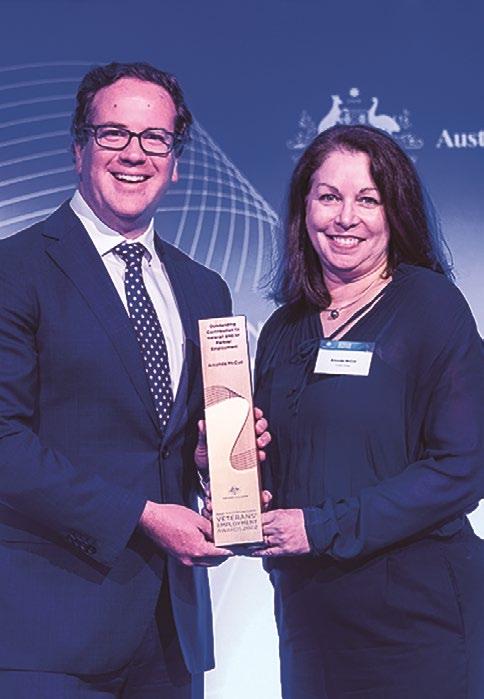
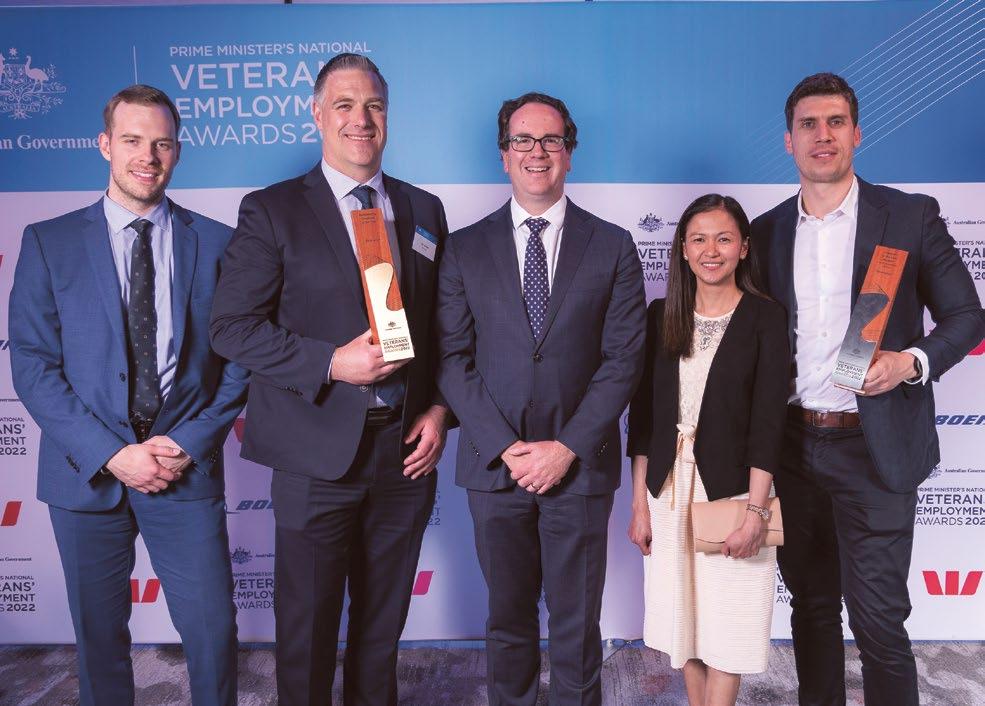
The Awards allow for the achievements of organisations that create employment opportunities and supportive workplaces for veterans and partners to be recognised, and highlight the success of individual veterans and Australian Defence Force (ADF) partners as employees and entrepreneurs. All this year’s Award winners have clearly demonstrated that employing
veterans and ADF partners is good for business.
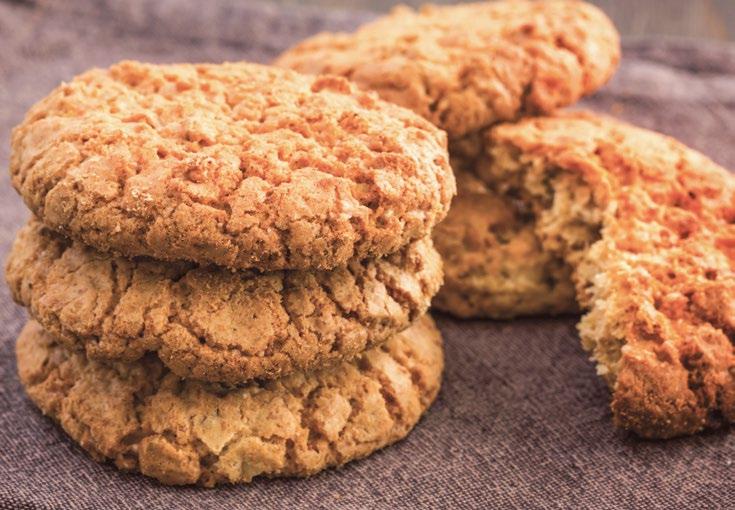
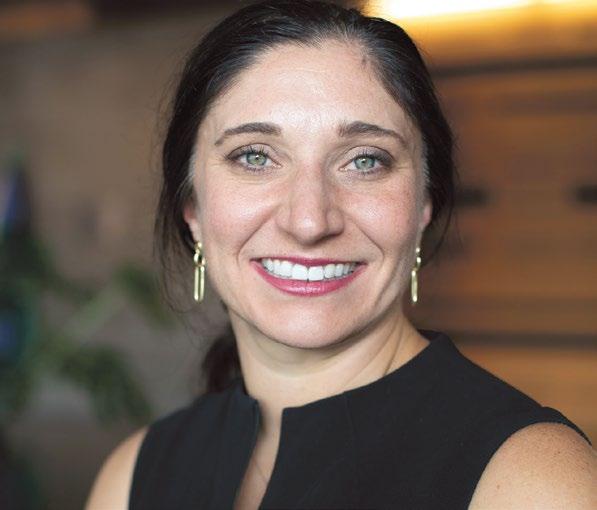
Prime Minister Anthony Albanese congratulated all finalists and winners and highlighted how important veterans and partners are to business, and how the skills and attributes individuals develop while serving in or supporting the ADF stay with them as they enter the civilian workforce.
Bluerydge, winner of Employer of the Year – Medium category and the overall Outstanding Employer of the Year category, has found early engagement with prospective staff allows the company to better support new employees as they enter the civilian workforce. Bluerydge has also invested in its staff, by supporting many of them to complete further study.
BUDGET OCTOBER 2022–23
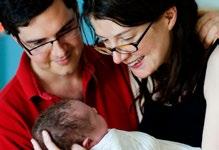
The Australian Government committed $537.5 million to DVA in the October Budget. In 2022–23, $11.5 billion will be allocated to the veteran support system.
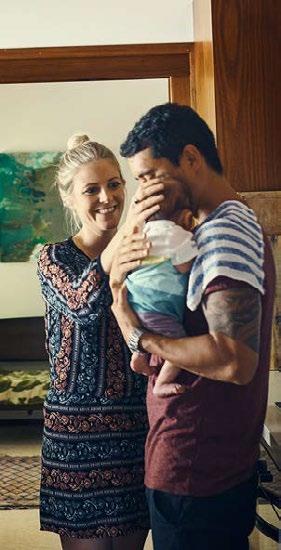

The Budget included a range of measures to support the Government’s response to the Interim Report from the Royal Commission into Defence and Veteran Suicide, including 500 new frontline staff to address the compensation claims backlog and deliver faster decisions for veterans and families.
The
Likewise, because serving ADF members develop strong problem-solving abilities, it is no surprise that many veterans start their own business after transition, often identifying gaps in the market and creating their own solutions. This was the case for Veteran Entrepreneur of the Year winner, Garth Chester, who combined his ADF experiences and knowledge with post-graduate qualifications to start his own supply-chain solutions company, Valenhold, which operates in the mining industry.
Minister Keogh said, ‘As a nation we value the contributions made by veterans and their ongoing commitment to service, and we recognise the valuable skills they bring to the civilian workforce’.
For the full list of winners, see pages 16 and 17.
Additionally, funding was allocated to modernise DVA’s IT systems and improve the administration of the claims processing system and veterans’ services. The Government is investing in creating a pathway for legislation improvement to address longstanding complexities in the veteran support system. Funding was also allocated to establish the modelling capabilities to better forecast future demand for DVA services and bolster DVA’s capabilities for critical functions.
For full coverage, see page 8
at a glance budget.gov.au Building a better future A responsible Budget that delivers targeted cost-of-living relief and invests in Australia’s future. Through a devastating pandemic, a succession of natural disasters and extreme global volatility, Australians have shown they are resilient, practical and optimistic about our future. The challenges facing Australia are growing – intense and frequent flooding, a substantial global economic slowdown, high inflation and rising interest rates. The nation is facing widespread skills shortages and falling real wages, and a Budget burdened by one trillion dollars of debt and persistent structural deficits. The Government's plan is focused responding to these challenges and building a better future for all Australians. Budget delivers on the Government's commitments by: providing responsible cost-of-living relief building a stronger, more resilient and more modern economy repairing the Budget to pay for what's important. This Budget confronts the challenges that have been ignored for too long and seizes the opportunities that won't wait any longer. This is a solid and sensible Budget, suited to the times we are conditions confront. This Budget begins to build better future with more opportunities for more people more parts of Cost-of-living relief This Budget delivers five-point plan for responsible and targeted cost-of-living relief. This includes cheaper child care and cheaper medicines, an expanded Paid Parental Leave $4.7 billion over years to deliver cheaper child to boost supply and deliver up to 20,000 new $787.1 million over 4 years to reduce the general Pharmaceutical Benefits Scheme $42.50 to Supporting wage increases for our lowest paid ISSN 0819-8934 DVA’S FREE NEWSPAPER FOR AUSTRALIA'S VETERAN COMMUNITY VETAFFAIRS Vol. 38 No. 3 DECEMBER 2022 CONTENTS Commissioner Gwen Cherne on Employment Awards partner categories 21 Decorated veterans attend Queen’s funeral 24 Protecting the word ‘Anzac’ 28 Dr Loretta Poerio on posttraumatic stress disorder 14 NEWS .............................................. 1–8 HEALTH & WELLBEING .................. 9–14 WIDOWS’ NEWS 15 TRANSITION 16–17 ESO NEWS 18–19 FAMILIES......................................20–21 FEATURES .................................. 22–24 BOOKSHELF 25 COMMEMORATIONS 26–29 AUSTRALIAN WAR MEMORIAL........... 30 NOTICEBOARD............................. 31–32
budget.gov.au Building a better future October 2022
Department of Veterans’ Affairs respects and gives thanks to all who have served in our Defence Force, and the families who support them.
Above: Bluerydge – Outstanding Employer of the Year. From left: Tom Kazan, Jim Boekel (CEO), Minister for Veterans' Affairs Matt Keogh, Maria Oguis, Adam Haskard; Above right: Amanda McCue – Outstanding Contribution to Veteran and/or Partner Employment
FROM THE DEPARTMENT
Liz Cosson AM CSC Secretary, Department of Veterans’ Affairs

I have always enjoyed writing this column; it is one way I can connect with you, our veterans, our veterans’ families, and our veteran community.
However, this will be the last column I write as the Secretary of the Department, President of the Repatriation Commission and Chair of the Military Rehabilitation and Compensation Commission. After the Christmas break I will be concluding my tenure in this role, and a new Secretary will take the reins. It has been a privilege and an honour to serve in this role.
It is time for me to start a new chapter of my life, and, as you can imagine I have spent quite a bit of time reflecting on my time at DVA. While there is much to celebrate, I also recognise that the increased demand on our compensation and other services has led to unacceptable delays. I personally apologise to veterans and their families who have been affected by this.
I have also been thinking of the important work of the Royal Commission into Defence and Veteran Suicide. I take this opportunity to recognise the families and friends who have lost a loved one to suicide. You have always been in my thoughts, and will continue to be. I am sorry for your loss.
To those serving and those who have served, thank you for your service.
I am very privileged to have served alongside you and to have worked with many more of you since I joined DVA. The Defence and veteran communities are integral to both the history and future of our nation. I am honoured to have led this department and contributed in some way to ensuring there is support for those who have served our country, and the families who support them. We must continue to commemorate the men and women who volunteer to serve, the families who support them in this service and those who make the ultimate sacrifice to protect our democracy, values and freedoms.
to gain assistance and support. I am particularly proud of the expansion of the mental health services and support that we now offer to veterans and families and our shift in focus to not just treatment but the overall wellbeing of veterans throughout their lives. We have a much simpler, streamlined digital process for veterans to register with us, and our work with Defence is continuing to make it easier for us to know veterans before and during their transition. I am also proud of our increased focus on veterans’ families.
It is the wonderful staff at DVA who have made these achievements possible. They are some of the most dedicated, capable and caring individuals I have ever had the privilege to work with. Every day I receive messages from members of the veteran community, thanking individual staff for the difference they have made. So many of our staff have personal connections to the veteran and defence communities and it shows in their drive and commitment to support and assist veterans and families as best as they possibly can.
I am proud to have been part of a significant chapter in DVA’s history, where we have expanded the services available to veterans and families and improved the ease of access for veterans
I take this opportunity to thank all of the staff for their ongoing support throughout my time as Secretary and for their resilience and kindness, particularly through the last few challenging years with the pandemic having such an impact on the way we work.
The support I have received from the veteran
community and wonderful DVA staff has kept me inspired and motivated throughout my tenure, and I am very grateful this. My focus has been on making a difference to the lives of veterans and their families and I can promise you that I will continue to advocate for the care and acknowledgement you all deserve, well beyond my time in this role.
I step down from this role with a heart filled with gratitude and hope for the future. I wish you a Merry Christmas and all the very best for 2023. Thank you.
The new Secretary, announced by the Prime Minister on 15 December 2022, will be Ms Alison

Vetaffairs is published by the Department of Veterans’ Affairs as a free newspaper for Australia’s veteran community.
Editor: Conan Elphicke email: vetaffairs@dva.gov.au mail: GPO Box 9998 Brisbane, QLD 4001
Frame. Alison comes from the Department of the Prime Minister and Cabinet where she has been in the role of Deputy Secretary, Social Policy. She has been a senior public servant for both the Commonwealth and New South Wales governments in a range of complex service delivery and policy roles. Ms Frame brings significant experience working with stakeholders and leading staff to deliver positive outcomes for the community. She will begin her five-year appointment on 23 January and I know that I’ll be leaving the department in very capable hands.
Follow DVA on Facebook and Twitter: DVAAus Browse DVA on YouTube.com/DVATVaus
If you have an enquiry for DVA phone: freecall 1800 VETERAN (1800 838 372) web: dva.gov.au
2 Vetaffairs December 2022 NEWS
Attending the commemorative service at Sandakan, Malaysia on Sandakan Memorial Day
The support I have received from the veteran community and wonderful DVA staff has kept me inspired and motivated throughout my tenure, and I am very grateful this.
This Christmas, I’d like to take the opportunity to say thank you to our Defence personnel, veterans and their families for your service and sacrifice this year. And thank you also to all the DVA staff that have been working hard to reduce backlogs and wait times for our veterans. Looking back on this year there have been a number of significant anniversaries, from the 80 th anniversaries of the Battle for Australia, Kokoda and the sinking of the HMAS Armidale to the 75th anniversary of Peacekeeping and the 50 th anniversary of the end of National Service.
The Royal Commission into Defence and Veteran Suicide has been undertaking hearings across the country all year. I thank everyone who has contributed to those, and encourage anyone who is able, to make a submission before October 2023.
In September, I outlined the Albanese Government’s response to the Royal Commissioners’ Interim Report, responding to all 13 recommendations. I’m proud that we’ve already made inroads into those recommendations, including employing hundreds of additional DVA staff to get through the backlog of claims. I appreciate the frustration that comes with waiting for your claims to be processed. That backlog is coming down, and we’re working to improve ICT systems and simplify the legislation to make it easier to understand and faster to process as well.
I know this year would not have been easy for many veterans and families, and we’re working to improve that. We are getting on with the job.
In just the first six months of this new government we’ve implemented improved access to crisis support for veteran families, expanded education opportunities, grown the Psychiatric Assistance Dog program and increased the TPI pension.
There’s no doubt we have more to do, and there’s a lot in the works.
Early in 2023 we’ll be meeting with veterans across the country to
FROM THE MINISTER
The Hon Matt Keogh MP Minister for Veterans’ Affairs and Minister for Defence Personnel
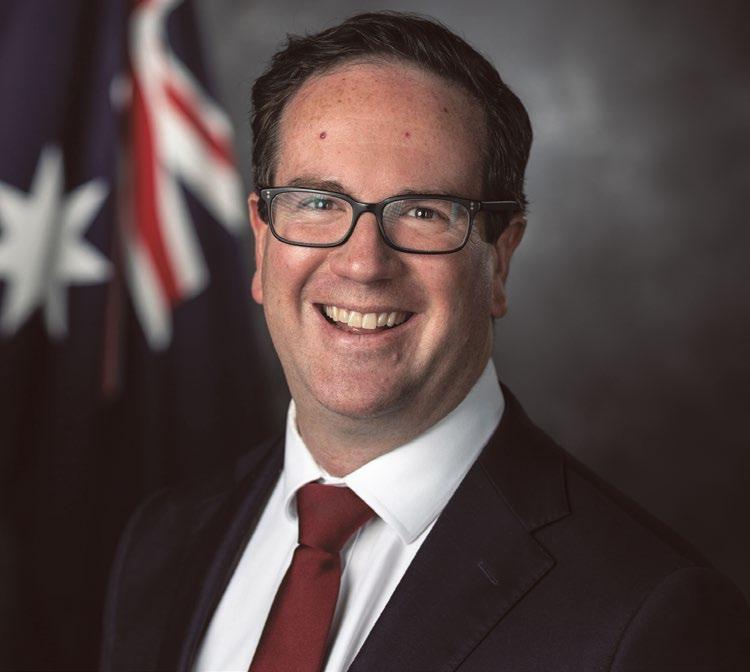
determine what our new Veterans’ and Families’ hubs will look like. I’m conscious that we can’t take a ‘cookie-cutter’ approach to those hubs; what will best benefit one community may not be required in another. Please keep an eye out for those sessions, to be undertaken in February and March.
Recently we celebrated the Prime Minister’s National Veteran Employment Awards. I was struck by the achievements and talent of so many of our veterans, veteran business and defence partners at the awards. Congratulations to all nominees, finalists and winners.
There is no doubt veterans and defence families have so much to offer the civilian workforce. Through our Veteran Employment Program we’ll be working to improve the community’s understanding of the excellent skills you all have to offer when you’ve completed your time in the ADF.

Also, next year we will celebrate the 50th anniversary of the end of Australia’s involvement in the Vietnam War. We’ll be marking that
anniversary through a series of activities throughout the year.
I wish to conclude by thanking outgoing Secretary of the Department of Veterans’ Affairs Liz Cosson for her work for veterans and families.
It is fair to say, that a bit like me, Liz was taking on a daunting task when she came into her role. She has taken on the necessary internal reforms and process improvements as best able with the resourcing and reform constraints placed upon her by the previous Government.
Liz has worked to not only support veterans through illness, but transforming and expanding the remit of DVA to support the overall wellbeing of veterans and their families.
Liz has overseen the increased integration between Defence and DVA to ensure that people don’t fall through the cracks when they leave service. Importantly, Liz has worked with me and the new Albanese Government to make sure we can get on with the job of implementing our important election commitments and response to the
Royal Commission, all for the benefit of veterans and their families.
So I thank Liz for her service in the Army, in Defence, in the public service and in DVA in particular. Liz, I wish you all the very best in the next chapter of your life.
Alison Frame has been appointed as the new Secretary of DVA. She brings a background in frontline service delivery and central government policy reform – both key aspects of improving the way our Government will deliver on a better future for our veteran community.
I look forward to working closely with Alison in continuing the work of improving service delivery to, and the legislative reform for supporting our veterans and families.
Finally, Christmas is a difficult time for many, if you need support please contact Open Arms on 1800 011 046.
Thank you to our veterans and families for your ongoing service and sacrifice.
Merry Christmas.
December 2022 Vetaffairs 3
NEWS
Speaking at the National Servicemen’s Commemorative Service at the Australian War Memorial, Canberra on 8 September
FROM THE ASSISTANT MINISTER
The Hon Matt Thistlethwaite MP Assistant Minister for Defence and Assistant Minister for Veterans’ Affairs
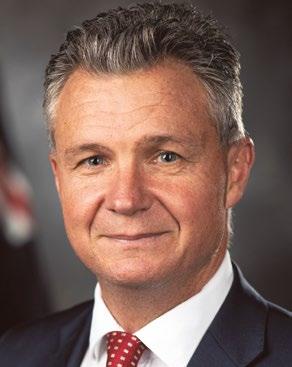
It has been a busy time in the Defence and Veterans’ Affairs portfolios since I last penned this column, and I am pleased to share with you some of the achievements that I am proud to have been able to contribute to support our veteran community.

In October this year, I introduced a Bill into Parliament to amend the Defence Home Ownership Assistance Scheme. The legislation will upgrade the scheme, providing greater support for serving and ex-serving members of the Australian Defence Force to purchase their own home.
It will also make access to the scheme easier, and reduce the qualifying period for permanent serving personnel to two years. Importantly, we're removing the post-service cap,
so veterans and families will be able to access this scheme at any time after they’ve completed service, rather than the current five years.
Reforming the scheme was one of my key priorities coming into Government.
Veterans’ mental health is a key priority. I was pleased to announce in August that Open Arms – Veterans & Families Counselling is offering a new treatment for posttraumatic stress called RESTORE – Rapid Exposure Supporting Trauma Recovery, which compresses the normal ten-week course of prolonged exposure therapy into just two weeks. This followed a successful trial that was a partnership between DVA, Defence and Phoenix Australia Centre for Posttraumatic Mental Health. It found
that intensive exposure therapy is equally as effective as standard therapy, and participants were nearly four times less likely to drop out of therapy compared with those engaged in the 10-week treatment.


In November, I had the pleasure of opening the new Melbourne office of Open Arms on Collins Street. It had already been open for two years but due to COVID, no official opening had been possible. It was a great opportunity to meet some of the service’s dedicated staff, which you can also do via DVA TV (youtube. com/dvatvaus). I also launched a superb DVA TV video about the 40th anniversary of Open Arms, which I encourage you to watch.
The October Budget saw a further $409,000 committed to the Kokoda Track Memorial Walkway in Sydney
over the next four years. The additional funding will contribute to the ongoing operations and maintenance costs, including staffing, gardening, repairs and general maintenance.
I visited the Walkway and saw how impressive it is when I opened the Bruce Kingsbury VC memorial garden and launched a digital honour roll of those Australians killed in the campaign. Private Kingsbury laid down his life at the battle of Isurava.
I very much look forward to 2023, as we strive to further the interests of the veteran community. In the meantime, I wish you a peaceful and restful Christmas. To all those who have served, thank you for your service.
Letter to the editor
Many thanks for the article in the August Vetaffairs about the Australian Women’s Land Army.
I was a permanent member of the Land Army during the war. My postings were Oberon (pea picking), Blayney (general farm work, including tractor work, managing draught horses, spreading super phosphates, bean picking, potato grading and milking), Exeter (general farm work including stooking hay, milking and pig farming etc). My brother Albert Tuck was killed flying over Hanover, Germany and I am a war widow, my husband having served in New Guinea.
Thank you again for remembering the AWLA’s 80th anniversary. Sincerely, Grace Wood
If you also served in the AWLA or another women’s auxiliary service such as the WRANS during the Second World War and would like to be put in touch with one another, please email us at vetaffairs@dva. gov.au.
4 Vetaffairs December 2022 NEWS
• Automatic flood cover • Flexible payment options • Accidental damage (up to $5,000) A tailored claims process • No excess on claims • Temporary accommodation should your home become unfit to live in • Electrical motor burnout (part of your home) PROTECT YOUR HOME AGAINST FLOODS & STORMS This advertisement is based on general insurance advice that only applies to DSH Insurance building Product Disclosure Statement (PDS) dsh.gov.au/insurance/home-building Please consider the relevant Product Disclosure Statements and the Supplementary Disclosure Statements before deciding if the insurance product is right for you. This material does not take into account your personal needs, objectives and financial circumstances. The first thought after flooding shouldn’t be whether you’re covered, it should be what you need to recover. With DSH Insurance, you get automatic flood cover included in your all-inclusive home insurance policy. Key features include: Get comprehensive building insurance quotes at online.dsh.gov.au Exclusive to veteran & ADF communities
DVA services during the holiday season
DVA will continue to provide support to veterans and their families during the holiday season. However, please be aware that some services will be impacted.
Counselling, mental health support and crisis accommodation
The Open Arms – Veterans & Families Counselling telephone line is available to support members of the current and ex-service community and their families 24 hours a day, 7 days a week, 365 days a year. Phone 1800 011 046 toll-free.
Safe Zone Support is an anonymous counselling line is available 24/7 to support members of the current and ex-service community and their families. Phone 1800 142 072 toll-free.
If you require urgent assistance, please call 000. If you are unwell, please contact your local doctor or go to your nearest hospital. Short-term crisis accommodation is available for eligible people. Please phone 1800 011 046 or visit openarms.gov.au
For further mental health information and support, visit openarms. gov.au
Transport bookings for medical treatment
DVA staff will be available to process transport requests for medical treatment on 28, 29 and 30 December. Please call 1800 550 455.
The service will be closed on the weekends as well as 26 and 27 December and 2 January. If transport is required on these days and has not been pre-booked, you can pay for the travel and seek reimbursement when we re-open. Or, if you are an existing MyService
user, you can make new transport bookings and review existing ones online (login.my.gov.au).
For travel in an emergency always dial 000.
Defence Service Homes Insurance
DSH Insurance and its advisors will be available for support with any insurance needs outside of the national public holidays over the Christmas period.
For enquiries, or help with a policy or claim, phone 1300 552 662.
Outside of core business hours, and during national public holidays, calls will be diverted to DSH Insurance’s after-hours service partner, ensuring that support is available 24 hours a day and 7 days a week.
For DSHI’s automated payment service, phone 1300 304 989 for the cost of a local call. This service is also available 24 hours, 7 days a week.
Hospital admissions
Doctors can admit DVA patients into hospital over the holiday period and request retrospective approval for the admission, where required, when DVA resumes full services.
Pharmaceutical approvals
There will be no reduction in services across the Christmas/New Year period. Providers seeking prior approval for pharmaceuticals can call the Veterans’ Affairs Pharmaceutical Advisory Centre (VAPAC) 24 hours a day on 1800 552 580.
Pension payments – from Christmas to late January
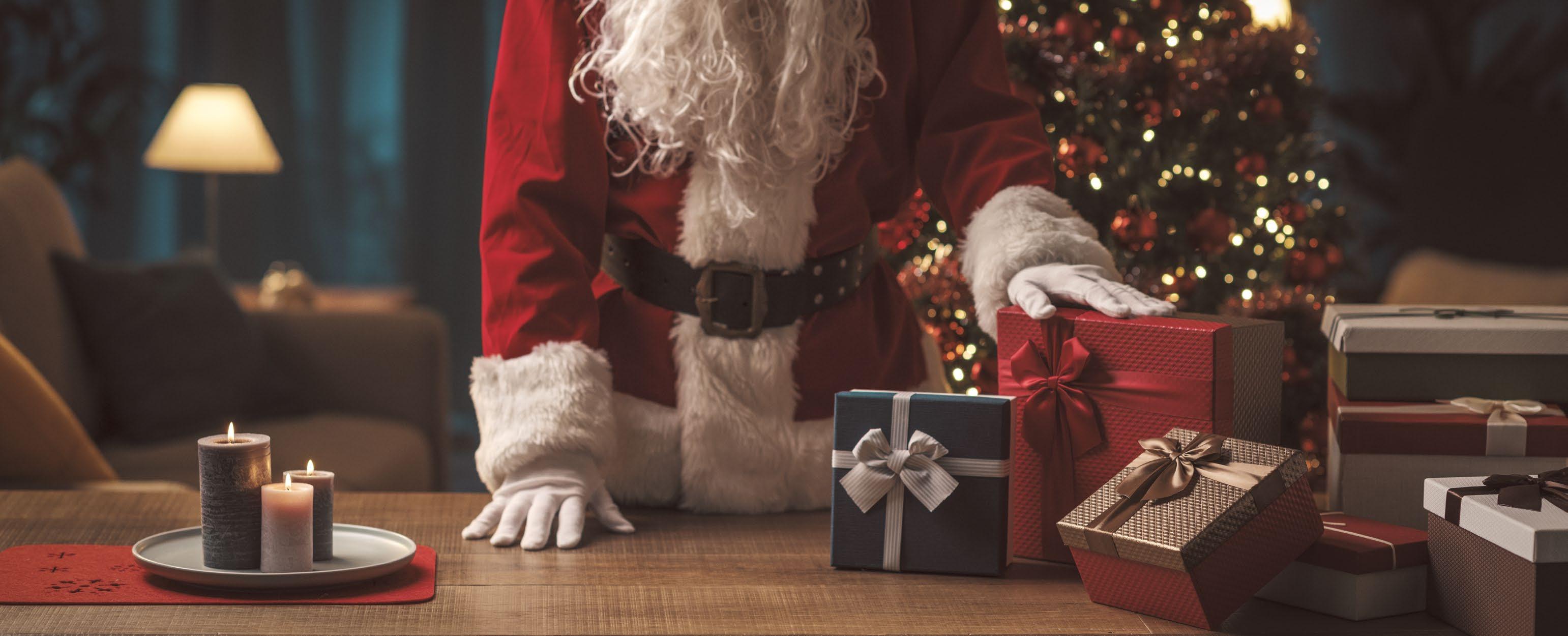
Pension paydays are not affected over this period. So the last payment in 2022 will be on Thursday 29 December 2022. The first payment of the New Year will be Thursday 12 January 2023.
Pension payday for 26 January 2023 will land on Australia Day, which is a public holiday. Therefore, pension payments that would normally be paid on that day will instead be paid into bank accounts the previous day – Wednesday 25 January 2023.
Incapacity payments
Incapacity payments will be paid as normal on Wednesday 21 December 2022. The next payment after this is due on the Wednesday 4 January 2023.
However, because of differing arrangements by various banks during the holiday period, which are beyond DVA’s control, the precise day of the week you receive this payment may differ from usual. You may wish to make arrangements to ensure you have enough funds to cover any direct deposit payments.
VAN offices, General Enquiries and Open Arms centres
DVA offices and shopfronts, and general enquiry services will be closed for the Christmas / New Year period from 24 December 2022 to Monday 2 January 2023 inclusive.
DVA’s General Enquiries phone line and email services, DVA’s Veterans’ Access Network (VAN) offices booked interview service and Open Arms – Veterans & Families Counselling centres resume on Tuesday, 3 January 2023.
Client Support Program
The Client Support Program (CSP) provides case management services tailored to the individual needs of clients and their families. This program will be affected by the DVA Christmas reduced activity arrangements. Staff will not be available from 24 December to 2 January 2023 inclusive.
CSP case managers will contact their clients prior to this period to discuss support arrangements and make sure they’re aware of the assistance available from Open Arms.
Veteran Support Officers
The Veteran Support Officers (VSO) provide personalised DVA services to ADF members on Defence bases. VSOs will continue to provide support to ADF members during Defence’s Reduced Tempo Period over December – January. Support will mostly be delivered remotely via telephone or email.
Staff will not be available from 24 December to 2 January 2023 inclusive.
ADF members can continue to book VSO appointments throughout Defence’s Reduced Tempo Period and DVA’s reduced activity period by emailing vso@dva.gov.au
December 2022 Vetaffairs 5
NEWS
Census yields valuable data about veteran employment
After transitioning to civilian life, veterans continue to be committed to service, as revealed in the second Analytical Article on Defence Service released by the Australian Bureau of Statistics (ABS). This article, reflecting the second release of 2021 Census data on 13 October 2022, focuses in more detail on veteran employment, education and qualifications. The first release of data in June 2022 found that there are more than 581,000 Australians who have served in the ADF.
Data on the rates of employment show that reservists (89 per cent) and veterans (75 per cent) are comparable to the national average (74 per cent). This reaffirms that veterans are highly valuable assets in the workplace and can successfully translate their skills and experience from the ADF to the civilian workforce.
The article identifies that serving in the ADF can provide great outcomes for women, with
17 per cent of female reservists, and 14 per cent of female veterans now working as managers, compared to 11 per cent of females in the general population. Younger male reservists and veterans were less likely to be managers than their female counterparts. Additionally, veterans and reservists were more likely to be employed in the public sector or Government jobs than those who have never served in the ADF.
In the first release of Census data in June, it was identified that Queensland, Western Australia and the Australian Capital Territory have the most current and former serving members. The October release confirms that current serving members are most likely to work in these three regions, while former serving members are more likely to work in Queensland and WA.
This latest release of Census data shows that 45 per cent of Aboriginal and Torres Strait Islander veterans work full time, compared
with 29 per cent of Aboriginal and Torres Strait Islander people who had never served.
DVA is committed to using the information from 2021 Census, and subsequent results, to continue to improve and target services and support for veterans and families.

For more information on the 2021 Census, visit the ABS website (abs.gov.au).
Indexation of pension rates from 20 September

Veterans’ pensions were increased from 20 September 2022 following the latest round of indexation adjustments.
Pension recipients including veterans, their partners, war widows and widowers will have seen an increase in their pension from the payday on 6 October 2022. The payday on 22 September 2022 is not affected as it reflects pension entitlements for the period 6 September to 19 September 2022.
The maximum rate of single Service Pension has risen by $38.90 to $1,026.50 per fortnight and the maximum rate for couples has increased by $29.40 to $773.80 per fortnight (each).
The Special Rate of Disability Compensation Payment (TPI payment) has increased by $59.90 to $1,578.70 per fortnight. Extreme Disablement Adjustment (EDA) has increased by $33.20 to $872.70 per fortnight and the 100% General Rate of Disability Compensation Payment has increased by $21.30 to $561.40.
The pension paid to war widow(er)s has increased by $39.60 to $1,044.30 per fortnight, while the ceiling rate of the Income Support Supplement has risen to $309.60 per fortnight.
Payments have also increased for benefits under the Military Rehabilitation and Compensation Act 2004 (MRCA). The weekly MRCA wholly dependent partner payment has increased by $19.80 to $522.15. This is paid as a fortnightly amount of $1,044.30.
The indexation factor used to index pensions each March and September can be based on either the Consumer Price Index (CPI), the Pensioner and Beneficiary Living Cost Index (PBLCI) or Male Total Average Weekly Earnings (MTAWE). For 20 September 2022, the indexation was driven by CPI.
More information on the new pension rates is available from DVA on 1800 VETERAN (1800 838 372).
6 Vetaffairs December 2022 NEWS
New pension rates from 20 September 2022 SERVICE PENSION (total amount) Old rate (fortnightly) New rate (fortnightly) Increase (fortnightly) Single person $987.60 $1,026.50 $38.90 Couples (each) $744.40 $773.80 $29.40 Single person – transitional $824.00 $856.40 $32.40 Couples (each) – transitional $664.70 $690.90 $26.20 WAR WIDOWS (total amount) War widow(er)’s pension $1,004.70 $1,044.30 $39.60 Income support supplement (ceiling rate) $297.60 $309.60 $12.00 DISABILITY Compensation Payment (total amount) T&PI (Special rate) $1,518.80 $1,578.70 $59.90 Intermediate rate $1,031.40 $1,072.10 $40.70 EDA $839.50 $872.70 $33.20 100% $540.10 $561.40 $21.30 10% $60.94 $63.07 $2.13 MRCA* Wholly dependent partner payment $1,004.70 $1,044.30 $39.60 Special Rate Disability pension (SRDP) $1,518.80 $1,578.70 $59.90 These are the maximum rates of payment and include any Energy Supplement payable. *Note that the MRCA payments in the bottom two rows are the fortnightly payments amounts, not the weekly amounts.
Government releases response to Royal Commission Interim Report
On 11 August 2022 the Royal Commission into Defence and Veteran Suicide released its Interim Report, which provided 13 recommendations to the Australian Government. The Government undertook to respond to the report as a priority.

Minister for Defence, Richard Marles, and Minister for Veterans’ Affairs and Defence Personnel, Matt Keogh, released and tabled in Parliament the Government’s response to the report on 26 September 2022.
In an address to the Parliament, Minister Keogh outlined that the Government had implemented one of the recommendations already, agreed to nine, agreed to one in principle, and noted two others. The Government’s response is available on the DVA website (dva. gov.au).
DVA is committed to implementing the recommendations in line with the Government’s response and will continue supporting the Royal Commission. There has already been significant progress made in relation to a number of the recommendations. This includes the commitment of an additional 500 staff for DVA to assist with eliminating the current backlog of claims at the department.
Since the Royal Commission was established on 8 July 2021, evidence has been heard from witnesses with lived experience of Defence and veteran suicide, witnesses with specialist
expertise, ex-service organisations and charities, as well as Commonwealth witnesses, include those from DVA and Defence.
The Royal Commission has stated it is interested in hearing from people with a variety of lived experiences, whether currently serving, veterans or family members, friends or support people. Every story is valuable and informs the inquiry.
There is still time to contribute to the Royal Commission. Submissions will remain open until 13 October 2023. Submissions can be made anonymously.
DVA understands this is a difficult time for many. All veterans and families can contact Open Arms – Veterans & Families Counselling (openarms.gov.au) for free support and counselling (available 24/7 on 1800 011 046). Those who wish to remain anonymous, can contact Safe Zone Support on 1800 142 072.
Making a submission
You can make a submission online via the ‘Make a submission’ link on the home page of the
Keeping you up to date with claims processing information
additional resourcing we should see this turn around as we are able to process more claims. We are also implementing processes to ensure claims are actioned as quickly as possible once they are allocated to a decision-maker.

You can assist with the processing of your claim by providing all required information when you lodge your claim. This includes medical evidence with a diagnosis of your condition and a statement as to how your condition is related to your service. Providing these documents upfront can save time later.
Royal Commission’s website (defenceveteransuicide.royalcommission.gov.au), or by calling 1800 329 095 to request a mailed submission form.
The website also outlines information about the process for the Royal Commission and how to contact the Commissioners.
Legal support
The Defence & Veterans Legal Service has been established to support Defence personnel and veterans during the Royal Commission. This nationwide service provides free and independent information and legal support to assist Australian Defence Force personnel and veterans, as well as their families, carers and supporters, to safely share their experiences with the Royal Commission. The service began on 1 November 2021. Further detail about these services can also be found on the Service’s website (defenceveteranslegalservice.org.au).
Incapacity payments for veterans studying extended
In October, the Aus tralian Parliament passed legislation to extend the Incapacity Payments for Veterans Studying pilot program until 30 June 2023.
The extension of this program will help support eligible veterans working towards their goal of securing employment in the civilian workforce.
DVA is committed to providing the veteran community with information on claims processing to provide greater transparency on our progress in addressing the claims backlog. So, each month the department will publish information on processing times on the DVA website – see dva.gov. au/claim-processing. This data includes claims lodged and claims determined as well as average claims-processing timeframes.*
Wait times for processing claims vary according to the type of claim submitted and individual claim complexity.
Over recent years, we have seen a doubling of claims received by the department. Presently, for some claim types, we are receiving more claims each month than we are deciding. However, with
For a list of useful documents to support your claim, please visit ‘Making a claim for a service-related condition’ page on the DVA website.
There are a range of services and supports available to you while you are waiting for a claim to be processed. These include:
• Provisional Access to Medical Treatment
• Non-liability Health Care
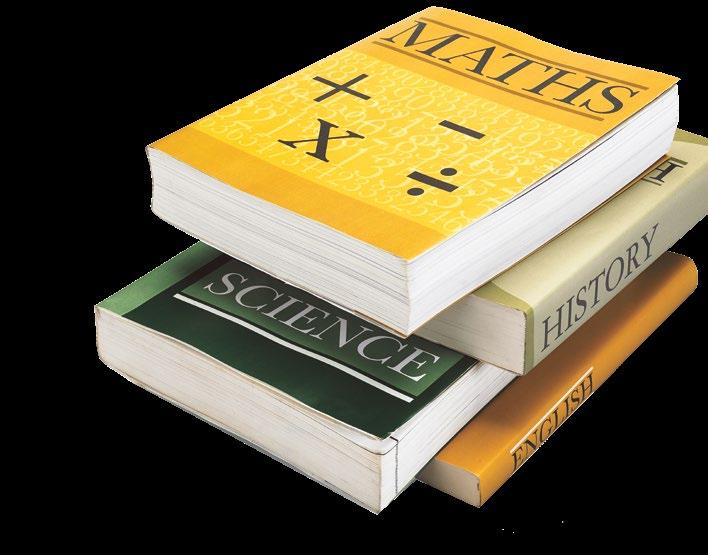
• Veteran Payment (while we assess your claim for a mental health condition)
• 24/7 access to Open Arms – Veterans & Families Counselling – 1800 011 046.
* The published processing times on the website is the average for all of the claims decided in the period indicated. It is not a maximum processing time.
The program was launched in 2018 to enable incapacity payments to be calculated based on 100 per cent of normal pre-injury earnings for veterans undertaking full-time study, as part of a Department of Veterans’ Affairs approved rehabilitation plan.
Hundreds of veterans are expected to benefit from this extension, enabling those who are studying to focus on their rehabilitation, with the knowledge that their income will be equivalent to what they would have earned in the ADF.
For more information on the program visit the DVA website (dva.gov.au and search for ‘how we calculate incapacity payments’).
December 2022 Vetaffairs 7 NEWS
OUTCOMES FROM BUDGET OCTOBER 2022–23
The Veterans’ Affairs Budget package includes a range of measures to implement and support the Government’s response to the Interim Report from the Royal Commission into Defence and Veteran Suicide.
Frontline staff
The package includes an investment of $233.9 million for 500 new frontline DVA staff. The number of claims lodged with DVA has grown significantly in recent years, and the additional staff will help address the backlog of claims and deliver faster decisions on claims for veterans and families.
IT systems
In response to the Royal Commission’s Interim Report recommendations, DVA’s IT systems will be modernised to reduce complexity and improve the experience for veterans and families, with $87 million being invested over two years through this Budget. The improvements to the IT systems will improve administration of claims processing and systems, making it simpler, faster and easier for veterans and families to lodge and track the progress of their claims, and access supports.
Legislation improvement
To address longstanding complexities in the veteran support system, $9.5 million will be invested over two years to develop, and consult on, a pathway for legislation improvement. The funding will also assist in establishing a governance and assurance framework to manage the implementation of the recommendations from the Royal Commission’s Interim Report accepted by the Government.
$15.5 million has been allocated to support DVA’s continued engagement with the Royal Commission.
Better forecasting
Additionally, the Government is investing in modelling capabilities to better forecast future demands for DVA services, while also providing additional resources to meet immediate service
delivery requirements across functions that have experienced increased demand. This initiative will be funded with $24.3 million invested over the next four years.
Veterans’ and Families’ Hubs
A number of measures have been announced to provide further support for the health and wellbeing of veterans and families, including the establishment of 10 more Veterans’ and Families’ Hubs across the country. This includes eight new hubs and the continuation of development of hubs in Southeast Queensland and Tasmania.
The new hubs will be located in:
• Geelong/Surf Coast, VIC
• Hawkesbury region, NSW
• Hunter region, NSW
• Ipswich, QLD
• Northern Adelaide, SA
• Queanbeyan, NSW
• Southwest Perth, WA
• Tweed/North Coast region, NSW
The expansion of the Hubs network will improve access to tailored and localised support services for the around half a million veterans and families in Australia.
For updates on new Hub locations, see dva.gov. au/latest-news Veteran Employment Program
A new Veteran Employment Program will be created to help ensure veterans’ skills and experience are understood and valued by the civilian workforce and the wider Australian community. This will support the ongoing contributions of veterans to the nation through the civilian workforce.
TPI payment increase
From 1 January 2023, the Totally and Permanently Incapacitated (TPI) Payment will be increased by $38.46 per fortnight, equivalent to $1,000 per year, which will provide additional financial support for around 27,000 of our most vulnerable veterans.
Introduction of the Workforce Incentive
The Government is introducing the Workforce Incentive measure to remove disincentives for pensioners to re-enter the workforce or to increase the number of hours they work. The measure benefits pensioners who have employment income and lose their Service Pension, Income Support Supplement, Veteran Payment or Social Security Age Pension due to their or their partners income exceeding the income limit.
Pensioners who hold a Pensioner Concession Card (PCC) will retain their PCC for two years after losing their pension.
During the two-year period, if their income falls below the income limit they won’t have to submit a full application to have their payments reinstated.
Reinstatement of payments can be achieved by providing DVA updated income and assets information.
You can tell us about changes to your circumstances that might affect your pension by:
• ringing us on 1800 VETERAN (1800 838 372)
• writing to us at GPO BOX 9998 BRISBANE QLD 4001
• visiting any of our offices
• using MyService
The Workforce Incentive will begin on 1 January 2023.
If you would like more information about Workforce Incentive you can call DVA on 1800 VETERAN (1800 838 372).
Veteran homelessness
To support veterans who are homeless or at risk of homelessness in Darwin, the Council of Australian Veterans will receive a grant to develop and establish the Scott Palmer Services Centre, named after Private Scott Travis Palmer who was tragically killed in action in Afghanistan. Private Palmer called the Northern Territory home. The accommodation facility will include a six-unit temporary accommodation facility with office space and will facilitate connections with veterans and support services.
Legacy Brisbane headquarters
Legacy Brisbane will receive a grant to support the establishment of their new headquarters at the old Red Cross site at Greenslopes, Brisbane, including a family hub to deliver support services to the families of deceased or injured veterans.
Commemorations
The commemoration of our veterans and recognition of their service and sacrifice was another key theme in the Budget, which included supporting the continued operation of the Kokoda Track Memorial Walkway in Sydney. This is an important commemorative site honouring those who served in the Second World War. The funding will contribute to its ongoing operational and maintenance costs.
Funding has been allocated to continue the research into the Soccer Ashes. This lost trophy was awarded for historical international soccer matches played between Australia and New Zealand between the First and Second World Wars. The Soccer Ashes, lost since 1954, is a unique part of our nation’s military and sporting history.
To further support the recognition of veterans’ service and sacrifice, funding has been provided to establish an ongoing grants program to mark the private graves of First World War veterans who are not eligible for the Australian Government’s program of official commemoration.
For more information, visit the DVA website (dva.gov.au and search ‘Budget 2022-23’).
Veterans and partners able to earn more
Veterans and partners who receive the Service Pension, Income Support Supplement or Social Security Age Pension and are entitled to the Work Bonus will be able to earn more money without it affecting their pension entitlements.
Under the changes, pensioners who are eligible for the Work Bonus will receive a one-off increase of $4,000 to their Work Bonus Bank balance. In other words, the maximum allowed Work Bonus Bank balance will temporarily increase from $7,800 to $11,800.
The changes took effect on 1 December 2022 and will be available until 31 December 2023.
This one-off increase to the Work Bonus Bank balance will allow eligible veterans and partners the choice to be engaged in additional or new paid work of up to $4,000 if they want to, without reduction to their pension and benefits.
These changes are intended to improve the financial wellbeing and self-sufficiency of our veterans and families.
More information about the Work Bonus is available on the DVA website (dva.gov.au and search for ‘work bonus’).
8 Vetaffairs December 2022
NEWS
HEALTH AND WELLBEING
Meet Leonie Nowland, National Manager of Open Arms – Veterans & Families Counselling
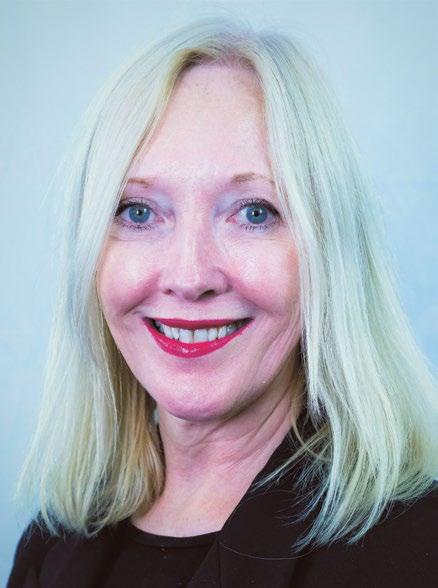
My name is Leonie Nowland and I am the new National Manager of Open Arms.
As the daughter of a veteran, I saw the impact of trauma on my father and experienced the effect this had on my family, especially my mother. I remember not knowing how to help, and feeling afraid and confused by what I was witnessing. My experience with how mental illness can impact individuals and families has instilled a lifelong passion and commitment to improving mental health support for those in need.
As a student, I was a recipient of the DVA Soldiers’ Children’s Education Scheme. I am incredibly grateful for that support, as it gave me the opportunity to undertake study to better understand mental illness and its impact. As a result, I was able to obtain the qualifications I needed to establish my career in mental health and put me on the path to where I am today at Open Arms.
Being in a position to help veterans and families who may be in similar situations to what I experienced is one of the reasons I was thrilled to join the Vietnam Veterans’ Counselling Service (VVCS, now Open Arms) in 2007. To be National Manager of Open Arms is the pinnacle of my career.
I see VVCS as a pivotal example of veterans with lived experience helping other veterans. Mates looking after each other has been a central tenet of the Australian Defence Force, and I am continually impressed by the selflessness
and commitment of the veteran community. Now that VVCS has evolved into Open Arms, I am reminded of the commitment and passion of those who founded the service 40 years ago, and we are indebted to them for the perseverance they showed in establishing it.
As National Manager of Open Arms, my focus is on how we can make the most of the considerable skills and experience of our veteran workforce. This group, for instance the Open Arms Peer and Community team, continue to do a wonderful job working with the veteran and family community, and connect the service we deliver now to the service founded by Vietnam veterans 40 years ago. A priority for me is expanding the lived experience workforce to encompass more programs to support veterans and families who do not necessarily need to see a qualified clinician.
I will also ensure our service is well equipped to provide treatments and programs that focus on the veteran and family, with an emphasis on military-aware, trauma-informed services that are unique to the veteran community.
I will ensure we keep veterans at the heart of everything we do. Open Arms is a service developed by veterans for veterans and families and as such has a unique place in mental health services across the world.
I am incredibly proud to be in this position, and commit myself to supporting those who have served, as well as veterans’ families.
Provisional Access to Medical Treatment extended for two years
In August, the Government announced a commitment of $33.6 million to extend the Provisional Access to Medical Treatment (PAMT) program until 30 June 2024.
Through the PAMT program, DVA will pay for veterans’ medical treatment while their claim is being processed. This applies to 20 of the most commonly claimed conditions.
‘We know veterans waiting for claims to be processed need support,’ Minister for Veterans’ Affairs Matt Keogh said.
‘This is a challenging time and dealing with a medical condition can make it even more stressful. Ensuring veterans have access to their treatment earlier can make a big difference to their recovery.’
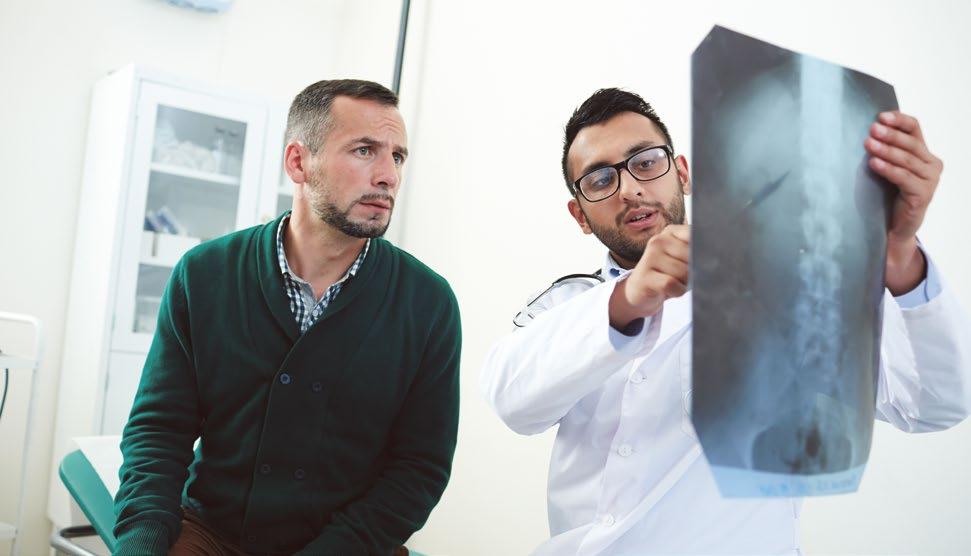
The program is available to former members of the Australian Defence Force as well as part-time reservists, cadets and declared members. It does
not apply to veterans who have claimed under the Veteran’s Entitlement Act 1986 (VEA).
To learn more about the program, including which conditions are included under the program, visit the PAMT page of the DVA website (dva.gov.au/pamt). This page lists the conditions covered by the program and how to access it.
Or you can phone us on 1800 VETERAN (1800 838 372).
From left: veteran Ashley Milne; Minister for Veterans’ Affairs, Matt Keogh; Minister for Aged Care, Anika Wells; Bek Milne (partner of Ashley).
Boost for veteran sport
The Australian Government has committed $9 million in funding to support Invictus Australia over the next three years to support the organisation’s important sports programs for wounded, injured and ill veterans.
The funding will enable Invictus Australia to deliver their Adaptive Sports Program, run in partnership with the Department of Defence, which helps to optimise veterans’ physical and mental health, improving their quality of life.
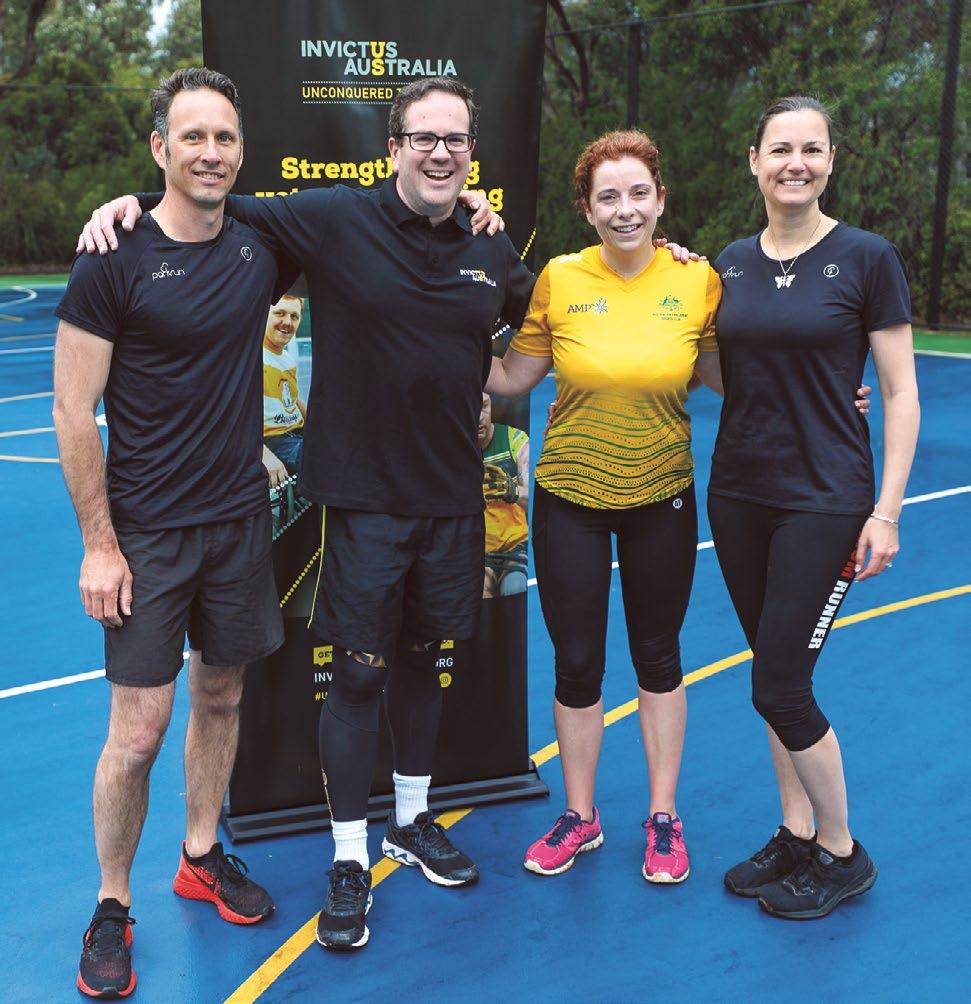
The funding also supports the representation of Invictus athletes at various international military games, including the well-known Invictus Games, which will take place in September 2023 in Dusseldorf, Germany.
Participation in sport and physical activity is an important contributor to health and wellbeing, particularly during recovery and rehabilitation. It also brings people together, providing opportunities to connect with broader communities, and creating new friendships.
It enables members of our veteran community to participate in sport with peers who understand what they have been through in their service and the challenges they face in their civilian lives.
Learn more by visiting the Invictus Australia website (invictusaustralia.org).
Minister for Veterans’ Affairs Matt Keogh hosted the Invictus Challenge at Parliament House on 28 September. The challenge saw parliamentarians going up against Invictus athletes in various adaptive sports, including wheelchair rugby league, bowls and indoor rowing.
December 2022 Vetaffairs 9
HEALTH AND WELLBEING
When I was a child I was often told to eat my fish dinner with the encouragement that fish was brain food. I usually thought this was just a trick to get me to eat something I didn’t like very much. Now we know that fish contains omega fatty acids that are good for our brains. My mother, of course, knew best.
Veterans’ Health week this year was themed around ‘eating well’. I know this comes up again and again in articles on keeping well and living longer but science is bringing new information to light all the time around the link between what you eat and your health, including mental health.
Science is increasingly recognising the link between food and the brain. This can be through sufficient energy for the brain – the brain uses 25% of our energy requirements each day – or through micronutrients needed for the brain’s neurotransmitters to function adequately. There is also much interest in the effect of the gut microbiota on the brain.
Unfortunately, in Australia the number of people eating the recommended amounts of fruit and vegetables is low. The Australian Bureau of Statistics reported in its 2020–21 Dietary behaviour report that, of people aged 18 years and over, only 6.1% met both the fruit and vegetable recommendations in the Australian Dietary Guidelines with 9.0% of women meeting both recommendations compared to 2.9% of men. In the same period, the National Study of Mental Health and Wellbeing found one in five people (21.4% or 4.2 million) had a mental health disorder in the previous 12 months while 7.5% (1.5 million people) had an affective disorder such as depression.
The Mediterranean diet is recognised as having good benefits for your health. This is a diet high in vegetables and fruits, whole grains, beans, nuts and seeds with olive oil as an important source of fat. Large studies have shown this reduces the
risk of heart attack and stroke as well as reducing mortality from cardiovascular disease. It has been associated with a decreased incidence of Parkinson’s disease, Alzheimer disease and many cancers.
Increasingly the Mediterranean diet is also being shown to be beneficial to mental health. The Royal Australian and New Zealand College of Psychiatrists recognises the impact of diet on mood disorders and psychological wellbeing in their recently updated Clinical practice guidelines for mood disorders . Conversely a diet high in red and/or processed meat, refined grains, sweets, high-fat dairy products, butter, potatoes and high-fat gravy, and low intakes of fruits and vegetables is associated with an increased risk of depression.
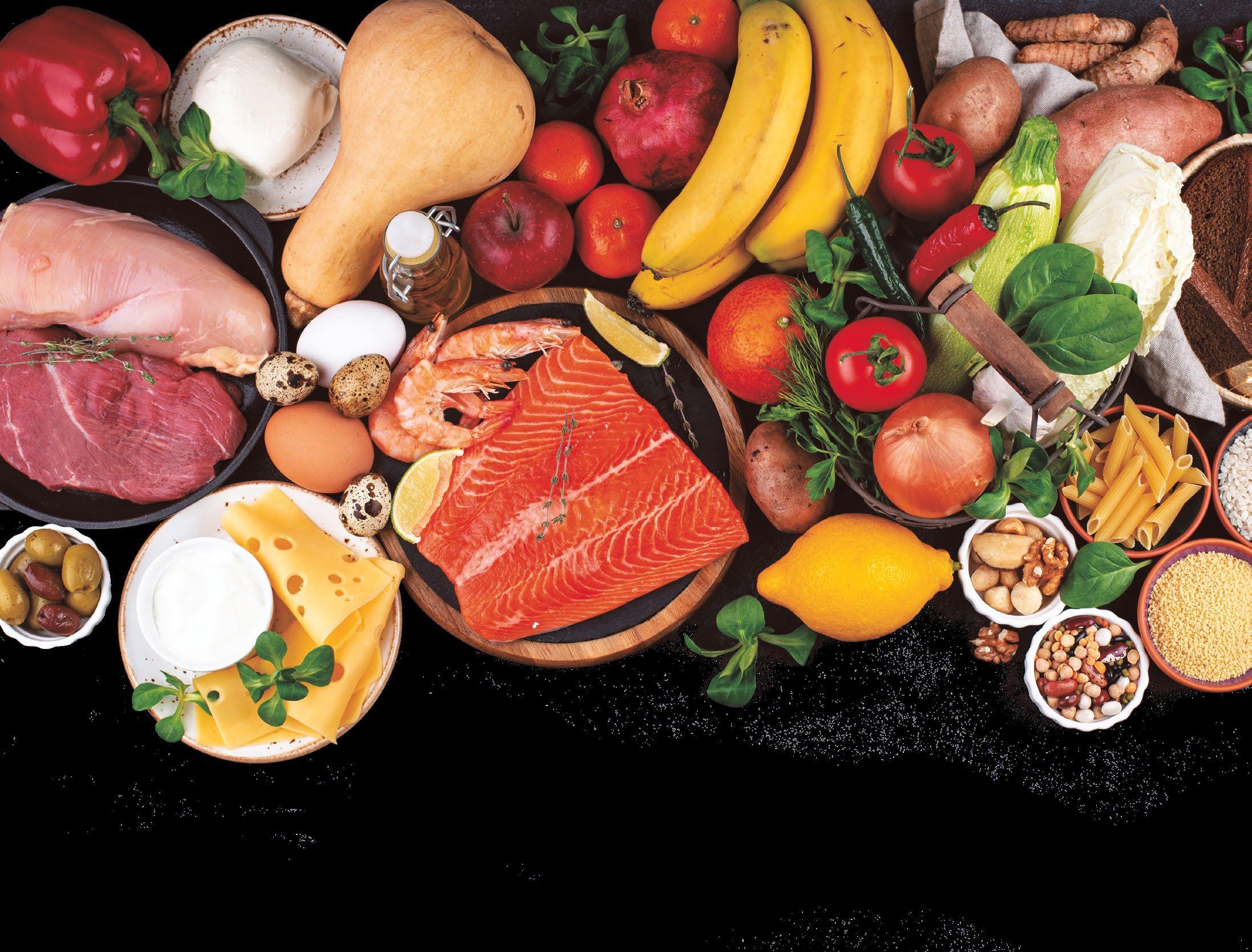
The Mediterranean diet has also been shown to reduce frailty and loss of independence associated with aging. While many people take supplements such as omega 3 fatty acids and vitamin D, evidence to date shows that taking supplements alone are not effective at reducing frailty. The mixture of vitamins and nutrients in the largely plant-based Mediterranean diet along with olive oil, whole grains, fish and nuts does provide these required protective ingredients. This is a relatively inexpensive diet and can be supplemented by home-grown vegetables. I am sure there are many veterans who took a keen interest in gardening during COVID. Growing your own vegetables combines exercise in an outdoor setting with the benefits of fresh vegetables in your diet – all good for your mental health.
Australian researchers have studied the effect of the Mediterranean diet on depression – the SMILES Trial. They conducted a randomised trial on people with moderate to severe depression. One group took part in seven clinical dietician sessions on the Mediterranean diet while the other had seven sessions of social support. Participants were commonly also receiving antidepressant medication or psychotherapy. The researchers measured depression symptoms and found that the dietary support group demonstrated significantly greater improvement than the social support control group at the end of 12 weeks: a third of those in the dietary support group met criteria for remission of major depression, compared to 8% of those in the social support group.

There are lots of opportunities for Australians to improve their diet and this can have benefits for their mental health. There is no shortage of excellent online resources including recipes and meal plans – see below. If you want to discuss your diet in detail and receive personalised advice, your GP can refer you to a dietician. Your GP can also refer you to a dietician, for a limited number of sessions, as part of a comprehensive treatment plan for a mental health condition.
So switching to the Mediterranean diet can mean you can live longer and feel happier.

Online resources
Food & Mood Centre –foodandmoodcentre.com.au Royal Australian College of General Practitioners (racgp.org.au) and search for ‘Mediterranean diet’ Queensland Health website (health.qld.gov.au) and search for ‘Mediterranean diet’
10 Vetaffairs December 2022
PROF JENNY FIRMAN AM Chief Health Officer Department of Veterans’ Affairs
“There are lots of opportunities for Australians to improve their diet and this can have benefits for their physical and mental health.”
That’s a wrap on Veterans’ 2022
This year’s theme of Eat Well aimed to promote healthy eating and nutrition knowledge to veterans and families. Across the week, veterans, families and the broader community participated in events held by ex-service organisations and community groups to support healthy eating and good nutrition.
By using #VeteransHealthWeek we were able to follow along and share some of the fantastic events being held across the country on our Facebook page. These events included (but certainly were not limited to) Saltwater Veterans taking wheelchair-using veterans and veteran community members to the seas in yachts and enjoying a ‘sailors meal’ of healthy, fresh produce from local businesses. Many organisations held picnics and BBQs at parks and playgrounds, which were perfect for all ages.
Participants also made their own smoothies with a blender powered by a stationary exercise bike at the Peace Community Centre picnic. RSL Victoria had meals prepared by
celebrity chefs and dieticians, and Buddy Up Australia enjoyed book clubs and art classes with delicious morning and afternoon teas. Our four-legged friends weren’t forgotten with Overwatch Australia hosting a veterans paws walk, which also included a free blood pressure check and sugar monitor reading. The list goes on!
To read more about some of these great events, search the hashtag (#VeteransHealthWeek) or visit the DVA Facebook page to see a few of them featured!
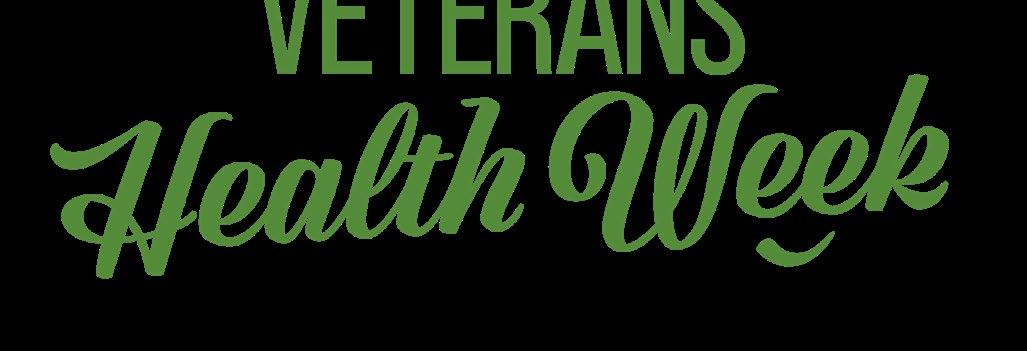
Thank you to everyone involved in this year’s Veteran’s Health Week, whether you hosted an event, attended or shared and promoted this fantastic week.

Heart Health Program still going strong after 20 years
DVA’s Heart Health Program improves veterans’ physical health through exercise, nutritional education and lifestyle management.
The department has been working with Corporate Health Management (CHM) to deliver the 12-month program to eligible veterans for more than 20 years.
The goal of the program is to help veterans build their own daily routine for exercise and a balanced diet that will continue long after the program is complete.
One participant who successfully completed the program, John Barnes, served as an officer in the Australian Army Corps of Signals during the Vietnam War.
‘I really look forward to being able to brag about my improvements week on week!’ John said.
‘I don’t think I would be unique in that either. With older veterans like me, the older you get, the less prepared you are to make an effort to keep
yourself fit physically and mentally and remember you are still part of society.
‘I’m absolutely certain though, that the individual program I have undertaken has improved not only my cardiac stability, but my overall confidence in my own capabilities both physical and psychological. While the name Heart Health program clearly defines its target, the spin-off benefits are immense!’
There are two ways the Heart Health program can be delivered: through the Heart Health Group Program or individually if a participant is unable to join the group program.
Both include access to a team of health and fitness experts, custom food diary reviews by a qualified nutritionist, a participant manual and an achievement certificate on completion of the program.
‘Right from the first contact with the CHM people, I began to look forward to getting stuck into some real self-improvement,’ John said.
‘They were serious about listening, considering, presenting and maintaining an individual program in a positive and supportive way, all aimed at improving my approach to the maintenance and improvement of my lifestyle, both physically and psychologically.
The Heart Health program is open to veterans and peacekeepers with operational experience and Australian Defence Force Firefighter Scheme participants.
The Heart Health program website (veteranshearthealth.com.au) provides further information on eligibility and program locations.
Veterans who need further information are encouraged to contact DVA on 1800 VETERAN (1800 838 372) or Open Arms – Veterans & Families Counselling on 1800 011 046 who will work with them to access the most appropriate care.
December 2022 Vetaffairs 11
HEALTH AND WELLBEING
Images clockwise from top left: Alstonville RSL Sub Branch, NSW; Buddy Up Australia – Art class; Pearce Community Centre – picnic and smoothie bike; Mooloolaba Yacht Club, Queensland; Veteran gym class at Fitness First, Doreen, Victoria; Buddy Up Australia –Books n Banter.
Phoenix Australia – supporting veterans affected by the Royal Commission
A message from Phoenix Australia
Veterans who have followed hearings held across Australia in recent months, read the interim report, or been exposed to related media coverage, may experience negative emotions such as anger and guilt. Those with pre-existing posttraumatic stress disorder or depression may notice a worsening of symptoms.
Additional support
Veterans who notice changes in their mood, substance use or thoughts of harm to themselves or others should reach out for professional support. Those already involved in psychological treatment might discuss with their practitioner whether more frequent sessions are appropriate. Veterans are encouraged to maintain general wellbeing strategies, such as diet, exercise, a regular daily routine and healthy sleep habits. Clinicians should monitor for changes in their clients’ moods and health risk behaviours.
Veterans seeking additional mental health support should visit the Crisis and community support page of the Royal Commission’s website (defenceveteransuicide.royalcommission.gov.au), which provides a list of community and crisis support options for those impacted by the Royal Commission.
Social connection
Self-isolation has been shown to worsen mood and anxiety symptoms and lead to further avoidance of social and work/life activities.
Veterans impacted by the Royal Commission are encouraged to seek social connection and support from others including friends, family and peers. A growing body of evidence shows that getting involved in community-based veteran support groups can produce substantial improvements in symptoms, coping and perceived social support among veterans with mental health issues, especially when combined with clinical care.
The media
Veterans whose mental health has been impacted by the Royal Commission will likely benefit from limiting their exposure to news coverage related to the inquiry. With the support of their healthcare providers, veterans should establish a routine that limits general and social media exposure and focuses instead on reliable sources of information, such as the News & media page of the Royal Commission’s website
The value of military service
Having a positive regard for military service, such as the belief that service has a meaningful purpose, has been linked to good mental health outcomes among veterans. While acknowledging the Royal Commission’s findings may be distressing, remember that the inquiry represents an opportunity for positive change to address mental ill-health among veterans. The Royal Commission’s findings do not detract from the worthiness of a veteran’s service.
Report provides data on veteran wellbeing, education, employment and income
In September, the Australian Institute of Health and Welfare (AIHW) released a report called Understanding the wellbeing characteristics of ex-serving ADF members . It is the first of its kind to deliver comprehensive information on veterans’ educational qualifications and employment outcomes following their transition to civilian life.
The report focuses on ex-serving Australian Defence Force (ADF) members with at least one day of service between 1 January 2001 and 31 December 2015, and looks at key outcomes in their civilian life. The report draws on data from the 2016 Census, which was the data available at the time the research was done.
Overall, the report found the majority of veterans were doing well and had attained higher education qualifications, were employed, earned higher incomes than the general population, owned their own homes and were socially connected.
However, this was not the case for all veterans. Those who separated from the ADF involuntarily for medical reasons experienced wellbeing challenges such as higher unemployment rates, had lower levels of education qualifications, and had lower incomes than those who separated for other reasons.

Forty years of Open Arms
This year marks 40 years of Australia’s dedicated veteran and family support service, Open Arms –Veterans & Families Counselling.
DVA TV has produced a video marking this milestone, which you can view on YouTube (youtube.com/dvatvaus).
The milestone has also provided an opportunity for current and former staff to reflect on the history of the service, and acknowledge the Vietnam veterans who fought for the establishment of a dedicated counselling service four decades ago.
Events have been held around the country throughout the year, bringing together people who were instrumental in establishing the service with current staff, and clients who have benefited from Open Arms support.
Like many staff throughout the history of Open Arms, counsellor Kathy Michaels shares a lived experience of military life. She is the daughter of a Second World War veteran, her daughter went to
Iraq in 2009, and she began her nursing training in the Citizens Military Force.
Kathy joined the South Australian team in 1993, when the service was known as the Vietnam Veterans Counselling Service, and spoke at a recent event to commemorate the opening of Open Arms first office in Adelaide.
Kathy recalls that when she joined, the office consisted of five staff and no computers, and the after-hours service was staffed by the regional director.
Kathy co-facilitated the region’s first veteran lifestyle program in 1996. This program gave veterans and their partners an opportunity to get away from everyday commitments and meet people with shared experiences on an overnight camp.
‘In 2006, that first group invited me out with them,’ she says. ‘They were still getting together ten years later.’
One of the key findings from the report showed that nearly two in five (38 per cent) ex-serving ADF females had a bachelor degree or higher, a rate 1.4 times higher than Australian females overall (26 per cent). In addition, one quarter (25 per cent) of ex-serving ADF males had a bachelor degree or higher, which is similar to Australian males overall (22 per cent).
The report also showed that over three quarters of ex-serving ADF members lived with spouses, and generally ex-serving members had higher incomes than those of the broader population.
DVA has commissioned the AIHW to conduct research into a range of topics around the health and wellbeing of veterans. During 2022–23, the Institute will undertake further analysis, drawing on the newly available 2021 Census data.
The transition to civilian life can bring big changes, and research like this helps DVA to understand how we can best tailor our services and programs to better support veterans and families. This research will inform policies and help us anticipate what we need to focus on in the future.
To read the full report, visit the AIHW website (aihw.gov.au and search for ‘ex-serving ADF’).
While she never expected to still be working in the same organisation three decades later, the opportunities that have come with working for a service that makes a difference in the lives of veterans has ensured she remains passionate about the role.
‘There have been sad times, fun times, frustrating times, and a lot of banter. But most of all, I feel privileged that veterans share their stories with me.’
Open Arms offices in Canberra and Townsville will mark their 40-year anniversaries in 2023.
To learn more about Open Arms service and its history, visit openarms.gov.au.
For specialised, free and confidential Australia-wide support for veterans and their immediate families, call 1800 011 046.
12 Vetaffairs December 2022 HEALTH AND WELLBEING
HEALTH AND WELLBEING
More funding for the Psychiatric Assistance Dog Program
The funding provided for an expansion of eligibility for veterans who would have otherwise been eligible for the Program, but had privately sourced their own accredited psychiatric assistance dog prior to the start of the Program in September 2019. Eligible veterans will receive maintenance funding for expenses such as veterinary bills, pet insurance and vaccinations.
The Program expects to reach the milestone of 200 dogs placed with veterans early in the new year.
This life-changing program matches a highly trained dog with a veteran to support their clinical recovery from PTSD by performing tasks specific to supporting their needs. The dogs are trained to provide a range of unique supports to their veteran, such as waking their veteran from a night terror, scanning the environment for the veteran to reduce hypervigilance, and providing a barrier between the veteran and the public to induce feelings of safety.
The individualised training provides veterans the reassurance they are supported to care for and work with their dog into the future.
Since the Program’s launch, feedback has been extremely positive with veterans advising the Program has supported an overall improvement to their mental health, wellbeing and relationships.
Veterans currently accessing treatment for PTSD can speak to their mental health professional about how a psychiatric assistance dog may assist in supporting their clinical recovery.
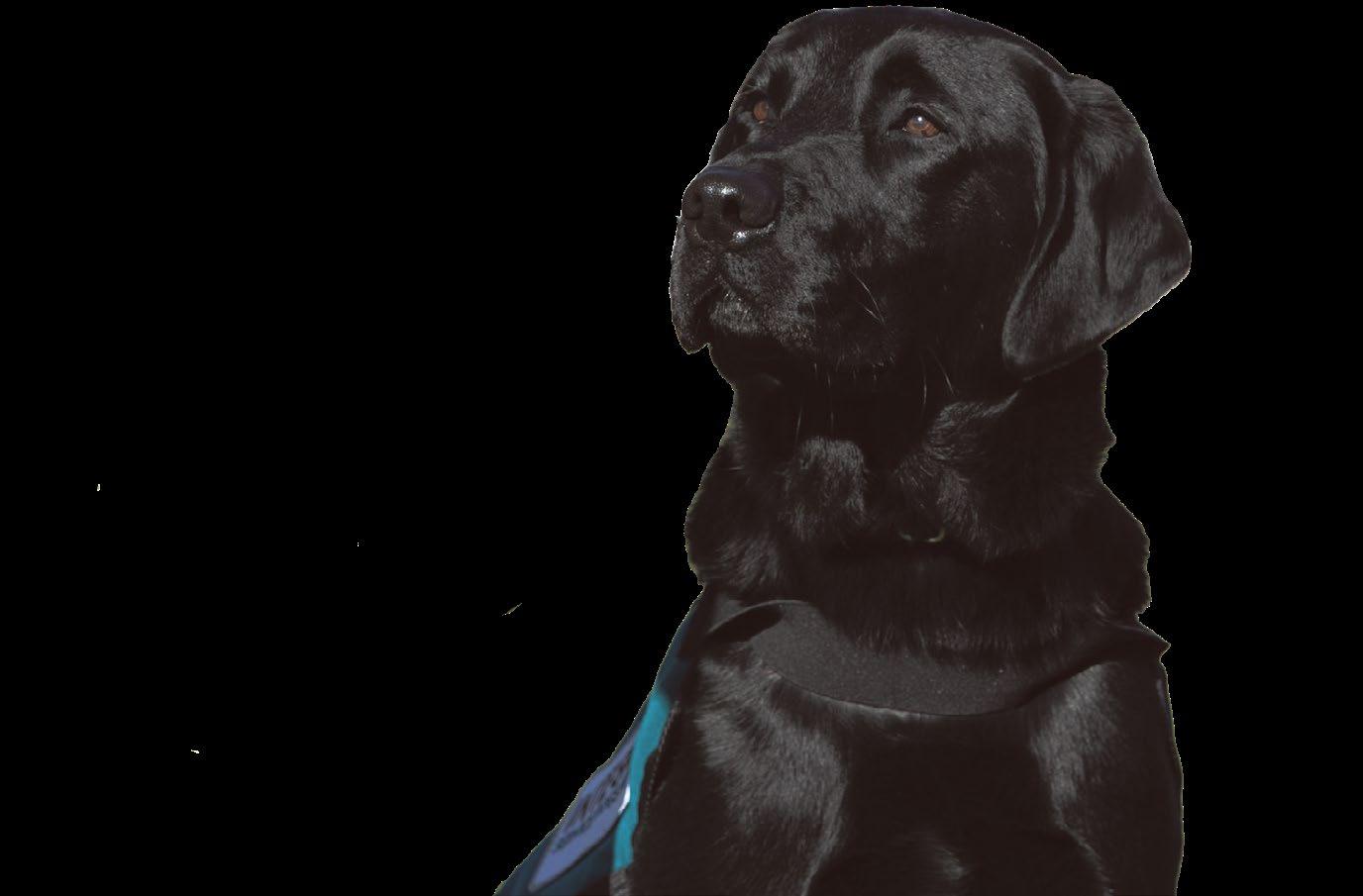
For more information about DVA’s Psychiatric Assistance Dog Program visit the DVA website (dva.gov.au/dogs).
Watch these veterans share their stories and how their psychiatric assistance dog has changed their lives for the better: How The Psychiatric Assistance Dogs Program is helping veterans with PTSD – YouTube (youtube/dvaaus).
Get support for social wellbeing and employment
DVA is running a trial program to provide eligible veterans with a tailored support plan to help with social wellbeing and/or employment in civilian life.
For some, this may be through sport, new hobbies or short programs. Or you may feel you need to work on a particular barrier for social wellbeing, such as losing weight, learning relaxation techniques, or gaining confidence in public settings.
The program can help participants who are unemployed or want to take their career to another level. You may want help to adjust to the civilian workplace. To achieve these goals you can do training on resume writing, interview skills, or on how to adapt to the civilian workforce.
If you have not yet had liability accepted by DVA, you may be eligible to participate.
Participants are allocated a professional consultant who will develop an activity plan that aligns with your individual goals and needs.
The activity plan will last for three to six months and can include support funded by DVA to:
• build new social connections in your local community
• become job-ready
• change careers or adjust to the civilian workforce
• provide assistance to get a Medicare Card or engage a suitable GP.
The trial ends 31 December 2023 and there is no cost to participate.
If this sounds like something you are interested in, send us an email at NLR@dva.gov.au and we’ll send you more information about the program, including what it covers and what it doesn’t. We’ll also send you a questionnaire to help us work out the types of support services that may suit you.
For more information, visit the DVA website (dva.gov.au and search for ‘non-liability rehabilitation’).
The importance of understanding the medicines you take

The latest Veterans’ Medicines Advice and Therapeutics Education Services (Veterans’ MATES) topic – Complex Medicines, is a reminder to veterans of the importance of understanding the medications you take for your condition/s. Next time you see your GP or refill your prescription at the pharmacy, why don’t you ask them about the medication you are prescribed to refresh your understanding of why you are taking them and any potential side effects or interactions.
Another way you can ensure you fully understand the medications you are taking is to have a Medicines Review. You can discuss this with your GP, who will write a referral to a specifically trained pharmacist. The pharmacist will then contact you to make an appointment. They come to you, usually at your home, and will review all the medications you are taking –there is no cost for this service. Your GP is then provided with a report and can discuss with you any changes that may be required so you receive the most benefit.
Unsure about having a Medicines Review? You can visit the Veterans’ MATES website and download a veteran brochure which has a handy list of questions for you to consider about the medicines you are taking. Reviewing this list of questions may help you be better prepared to ask your GP or pharmacist about your medicine. You can also read more about a Medicines Review in the brochure
On the Veterans’ MATES website you will find a range of topics that relate to the health needs of veterans. Established in 2004, Veterans’ MATES has supported the veteran community to improve their wellbeing through better use of medicines and related health services, and encouraging them to take an active role in better managing their health. If you would like to know more, head over to the Veterans' MATES website (veteransmates.net.au)
December 2022 Vetaffairs 13
Do you take a number of medicines for different conditions? Do you know what each of the medicines you take are for and any side effects they may have?
In August, the Government announced an additional $22 million for the Psychiatric Assistance Dog Program to support more veterans with their clinical recovery from posttraumatic stress disorder (PTSD).
HEALTH AND WELLBEING
Let’s talk about posttraumatic stress disorder
health conditions. Military-related trauma is often associated with problematic anger, substance misuse, sleep disturbance, depression, guilt and shame as well as chronic pain and other physical health conditions. This can lead to a reduced response to treatment for this population. Stigma also plays a part in reluctance to get treatment.
Phoenix Australia has developed guidelines, based on the current evidence, to help guide clinicians, veterans, children and adults. You can find these on the Phoenix Australia website ( phoenixaustralia. org).
other mental health conditions, such as alcohol abuse in veteran and military populations. It is increasingly seen as an important consideration in trauma-impacted populations, and as a mental health issue in its own right.
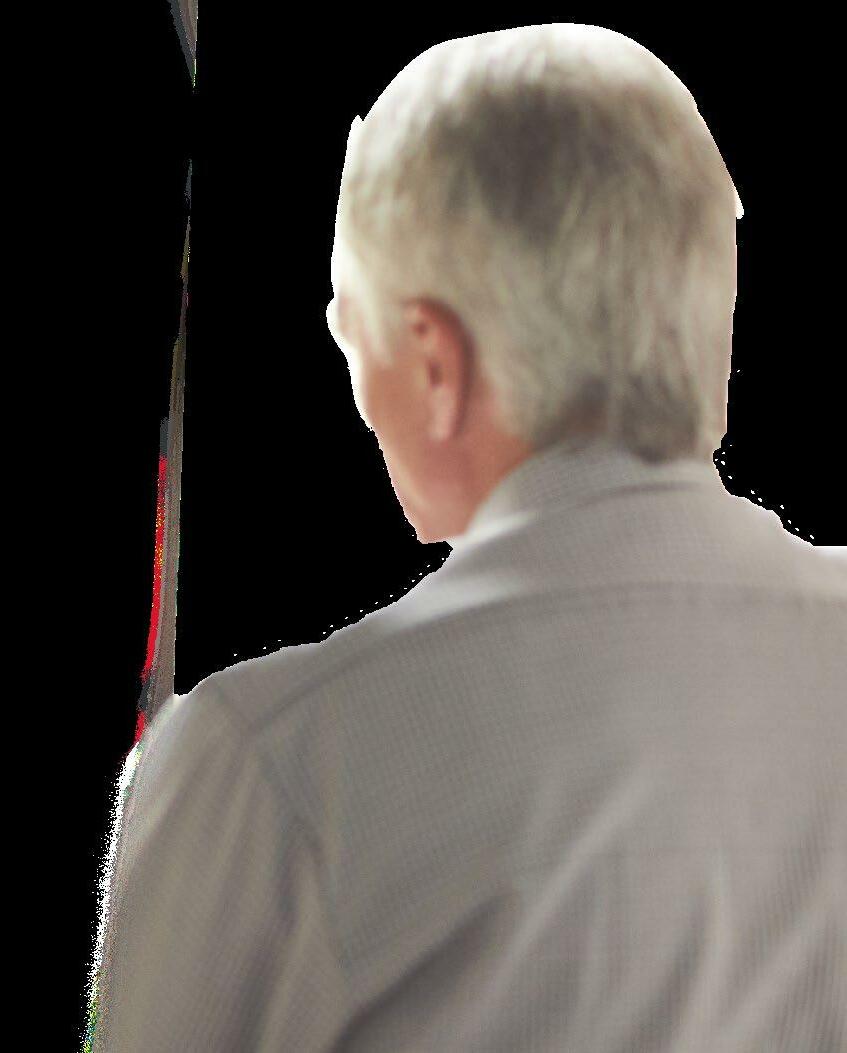 DR LORETTA POERIO Senior Mental Health Adviser Department of Veterans’ Affairs
DR LORETTA POERIO Senior Mental Health Adviser Department of Veterans’ Affairs
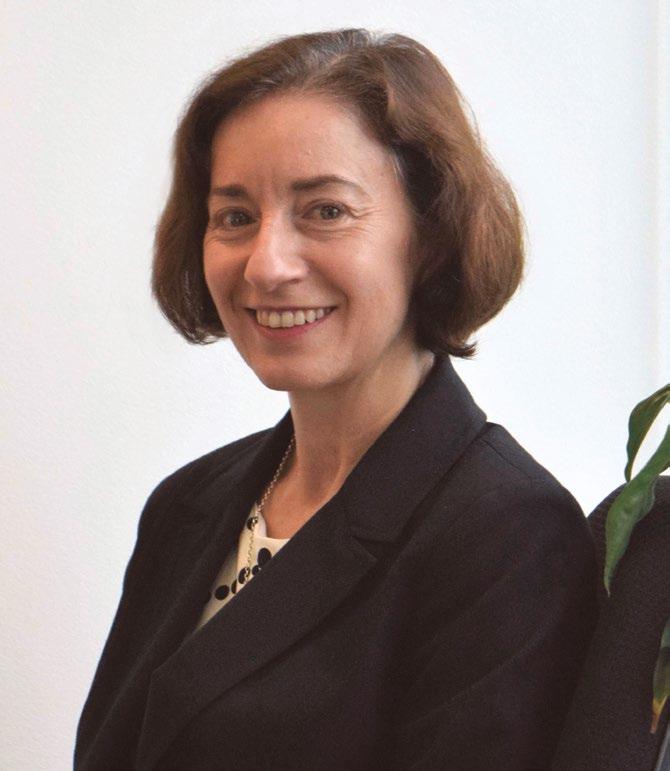
There is a lot written about posttraumatic stress disorder (PTSD), and it is important to be able to distinguish the hype from the evidence. PTSD is the second most common mental health condition in Australia, and is one of the most common mental health conditions in military populations. Research focused on Australian Defence Force (ADF) personnel indicates that 12-month estimated rates of PTSD among currently serving members is 8%, rising to 17.7% among ex-serving. The rate in the Australian population is estimated at 5.7% over a 12-month period.
Despite what you may hear and read, we know a lot about what works and what doesn’t, and also what complicates treatment outcomes. What we need to get better at is knowing what works for whom, when and under what circumstances. This is especially the case given that in the military and veteran population, there is more likelihood of co-occurring mental and physical
The onset of symptoms can be delayed or episodic. PTSD symptoms may start years after the incident, or they may come and go over time. They can be exacerbated by life events and time of life.
The symptoms most common to PTSD are:
• reliving the event/s, sometimes in the form of flashbacks
• avoiding anything that reminds a person of the event/s
• having more negative thoughts and feelings than before the event/s, including anger, fear, shame and guilt
• feeling on edge or keyed up.
These symptoms are common after a traumatic incident but they usually start to resolve within a few weeks. It is when they persist that problems arise. If symptoms don’t resolve themselves, and are leading to problems in your life, such as problematic anger and interpersonal difficulties, and you’re becoming emotionally numb and socially isolated, then you may meet criteria for a PTSD diagnosis.
PTSD can be debilitating and can impact a person’s ability to function as a parent and/or partner and can lead to unmet family needs and stress within the family. In fact, one of the most common reasons that people seek help can be the strain these symptoms put on their relationship.
The good news is that effective treatments for PTSD are available, and there are many research trials looking at how best to maximise treatments, including the use of adjunctive treatments such as exercise, yoga and assistance dogs.
Treatments include counselling, medication, or a combination of the two. The guidelines advise that it is generally best to start with counselling, rather than rely solely on medication.
“It is important to remember that PTSD is a condition that can be treated, with full or at least partial remission of symptoms.”
What we know about treatment is that it is not one-size-fits-all, that it takes time, it takes trust, and it requires using a range of interventions that we know work. For example, if insomnia is present and causing disruption, and there is a reluctance to focus on the trauma, we may start with cognitive behavioural therapy for insomnia.
As a clinician, it is often a difficult juggling act to know where to start as there are often a range of difficulties present, all vying for attention and intervention. As avoidance is a hallmark of PTSD and if you use avoidant coping strategies as your go-to, then it is likely that treatment may be delayed for years, and even decades. A common (unhelpfully avoidant) way of dealing with distressing symptoms is to try and drink them away, or use other mind-altering substances. This, of course, just makes the problem worse.

Anger is another area to be addressed. It is often a way for people to avoid engaging with people and dealing with difficult memories and situations. Problem anger is strongly associated with PTSD and
Adding to this complexity is the fact that veterans experiencing poor physical health and chronic pain are often also likely to have heightened levels of distress, anger and irritability, which diminishes their capacity to manage their emotions. Add other mental health symptoms such as depression and alcohol and other drugs, as well as sleep difficulties, and the complexities become apparent. There has, and continues to be, a lot of work in this area to better manage and treat complexities including case-co-ordination, rehabilitation programs, and close management of comorbid medical and psychiatric symptoms by treating clinicians.
It is important to remember that PTSD is a condition that can be treated, with full or at least partial remission of symptoms. It often results in a greater level of day-today functioning, which improves your ability to connect with those you love and who love you.
Another factor that is often under-emphasised is that therapy is a two-way-street. Treatment requires that you are an active participant and that you trust your clinician enough to engage with the therapeutic process. There are treatments that work that can make a significant difference to a person’s quality of life. Often, because there are many areas of intervention, a range of treatments will need to be used in parallel or consecutively, and treatment may take some time. Clinicians at Open Arms – Veterans & Families Counselling are well trained in dealing with military trauma and are a great place to start (openarms.gov.au).
Read the full version of this article in the digital Vetaffairs (dva.gov.au/ vetaffairs).
14 Vetaffairs December 2022
WIDOWS’ NEWS
Faye was a part of a special event to commemorate Japan’s unconditional surrender in 1945.
Two bronze statues depicting a nurse, tending to a wounded soldier and a soldier standing guard over a parade ground, were unveiled at Kings Beach.
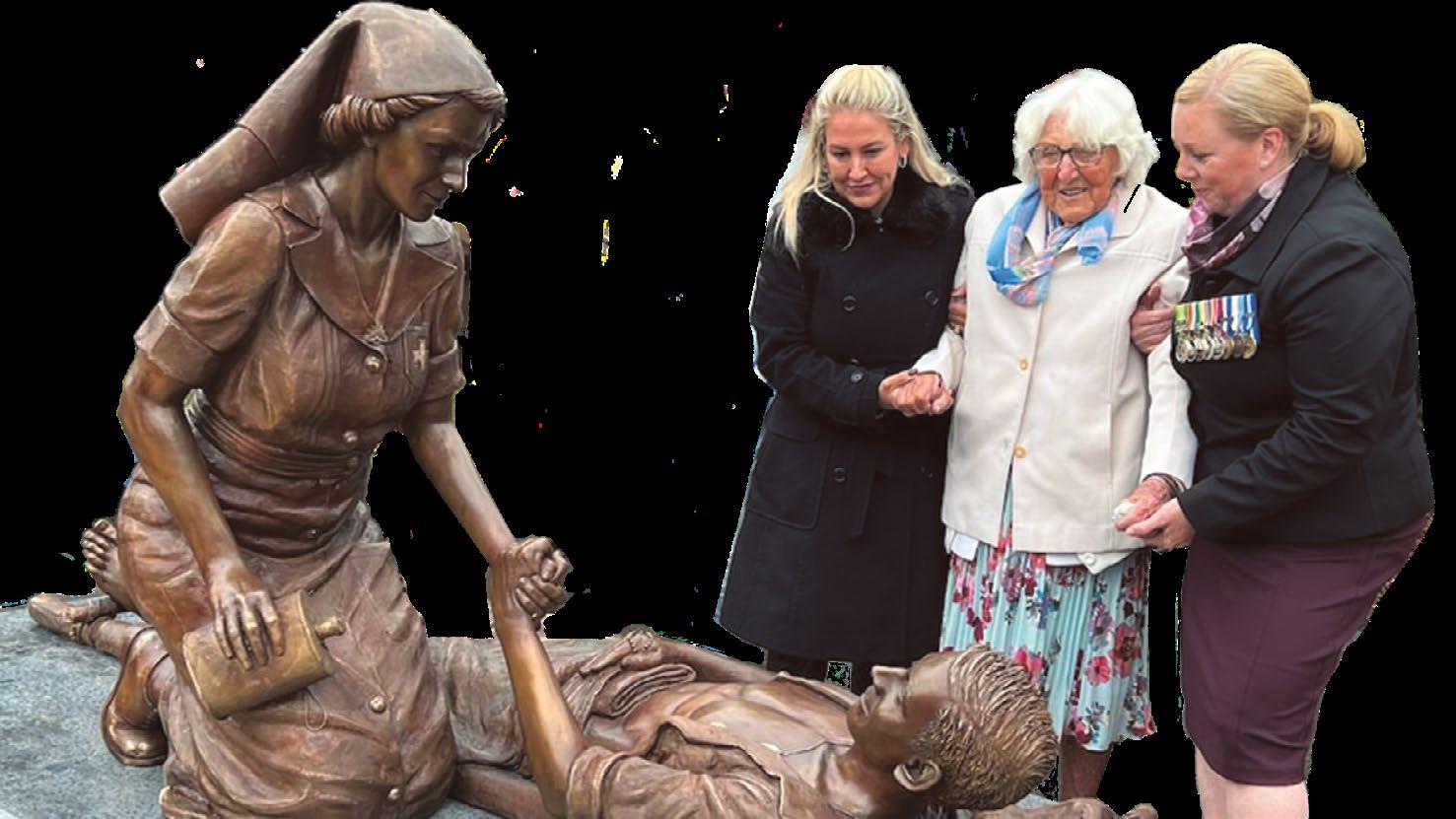
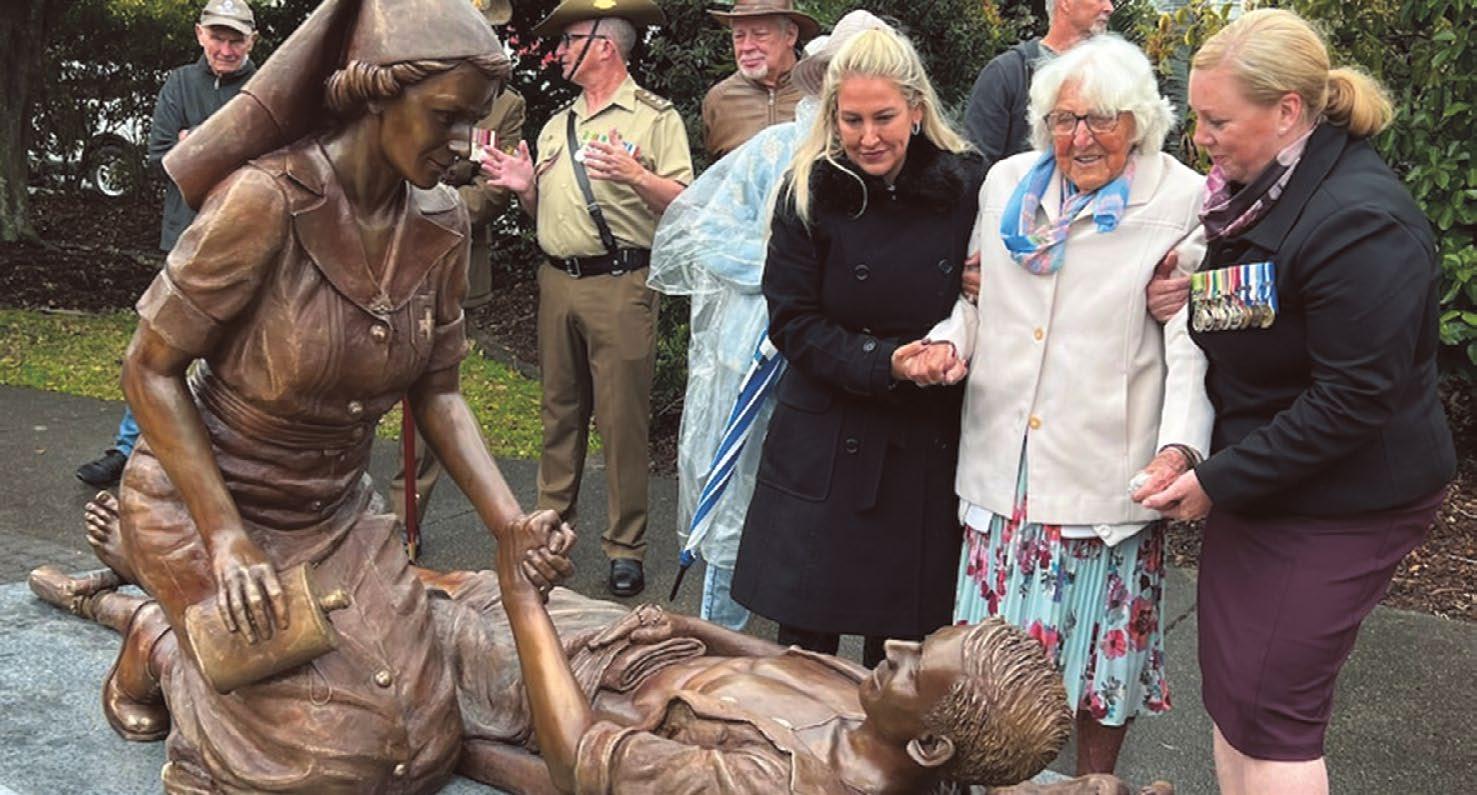
During the war, and estimated 25,000 soldiers marched across the golden sands of Kings Beach, used as a military parade ground, as they farewelled Australia and headed for war.
Second World War nurse marks Victory in the Pacific
A message from Australian War Widows Queensland
In August, centenarian veteran Faye Clarke led the march to commemorate Victory in the Pacific when two new statues were unveiled at Kings Beach, Caloundra, Queensland.
Australian War Widows Queensland member Faye Clarke, 104, served as a nurse in Australia, Borneo, and Papua New Guinea during the Second World War.
Vietnam veteran Gary Phillips said the statues represented all soldiers who paraded at Kings Beach, which is considered hallowed ground.
‘The military tradition is that those who paraded on the hallowed ground, who die in combat, their spirit returns to that parade ground to wait for their mates,’ Mr Phillips said.
The commemoration was hosted by the Caloundra RSL Sub-Branch.
Branch president Heather Christie invited the Sunshine Coast community to attend the event in
honour of a significant moment in Australian history.
The event included a catafalque party, helicopter flypast, military band, and march past.
State MP for Caloundra Jason Hunt said as a veteran he understood and fully supported this special project.
‘Victory in the Pacific represents a time when our nation was most directly threatened by a foreign power and the full force of our defences were deployed alongside our allies to keep our nation safe,’ he said.
‘The message of gratitude will be forever enshrined in our community’s memory with the unveiling of two magnificent bronze statues just above the Kings Beach amphitheatre.
‘World War Two military history is a significant part of the fabric of Caloundra and this incredible display will ensure that our veterans are not just honoured but celebrated forevermore.’
Take part in our Health and Wellbeing Program
A message from Australian War Widows NSW Ltd
Would you like to relax, have fun and be active in mind and body? Join our interactive and friendly online community.
Our Health and Wellbeing Program allows you to enjoy online classes, stay connected and meet other war widows and veteran families all from the comfort of your home.
Importantly, participation isn’t limited to NSW! So, widows and veteran families from around the country can join in and you don’t need to be a member of a war widows organisation either.
The program is accessed online via Zoom with classes taking place weekly. In each class, you can see hear and speak to each other and the facilitator in real time. If you are not confident using Zoom, we can help you with that too!
So, take some time out for yourself and join our mindful chair yoga classes. Feel the joy of
movement and rhythm during our seated dance sessions or have a laugh and lift your mood for the rest of the day with an interactive singing session.
Did you know?
Yoga and dance both promote health and wellbeing (physical, emotional, mental and social) through a range of techniques, including postures and movement, breath awareness and breathing exercises, relaxation and concentration, self-inquiry and meditation. The benefits of yoga and dance can include improvements to your balance, flexibility, stamina, movement, blood pressure, anxiety and sleep.
Chair yoga is a modified form of traditional yoga. It is suitable for people with limited mobility, lack of flexibility, painful joints or those recovering from injury or illness.
Singing is something that we all love but often feel self-conscious about. Have you ever wanted to learn how to sing and gain confidence in your beautiful voice? Do you want to get to know other members but are not sure how to do so? Perhaps give our singing classes a go.
Music is a wonderful form of self-expression. It helps us process emotions, improves our mood and enhances our overall wellbeing. The benefits of singing range from relieving stress to managing strong emotions such as grief.
Class timetable
Classes run weekly:
• Chair yoga – Tuesday 12.30pm, Thursday 11am
• Singing – Wednesday 10am
• Seated dance – Monday 9.30am, Friday 10am
How to register
Simply get in touch with our friendly programs team at programs@warwidowsnsw.com.au
or (02) 9267 6577. You can register for as many classes as you like.
These classes are run online. So, you will need access to a computer, tablet, or smartphone. If you do not have one of these yourself, see if you can borrow one from a family member, friend, or neighbour.
If you’re not comfortable with online classes, you’ll find the Digital Health and Wellbeing program is easy to use but we are here for you through every step.
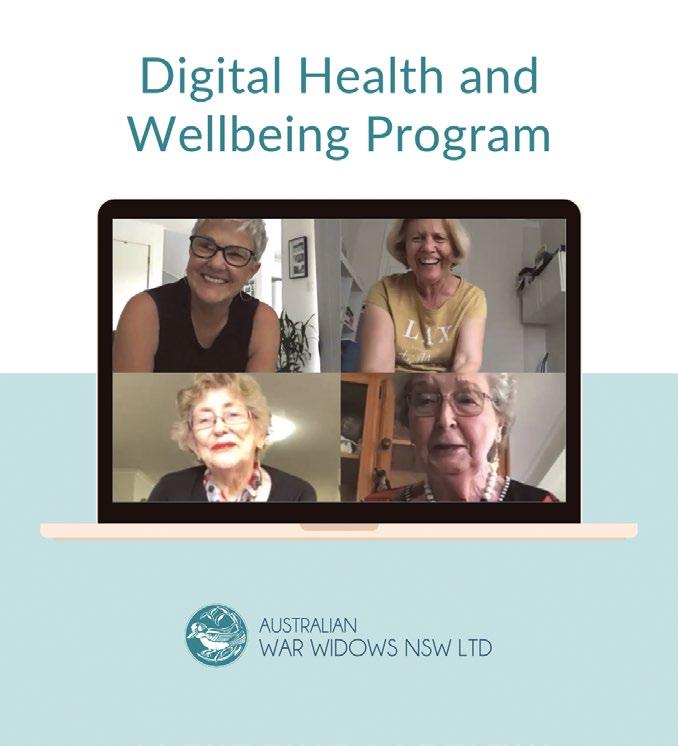
December 2022 Vetaffairs 15
Please be aware that articles in Widows’ News have been submitted and written by war widows’ organisations. The articles do not necessarily represent the views of DVA. Such organisations are encouraged to submit stories for publication by emailing vetaffairs@dva.gov.au .
104-year-old Faye Clarke at the unveiling of the statues. Photo courtesy ABC.
TRANSITIONING WELL
PRIME MINISTER’S NATIONAL VETERANS’ EMPLOYMENT AWARDS
The winners of the 2022 Prime Minister’s National Veterans’ Employment Awards were announced by the Prime Minister, Anthony Albanese, and Minister for Veterans’ Affairs, Matt Keogh, on 24 November at a ceremony in Canberra. This year’s awards attracted nominations from a broad range of organisations and individuals including in the inaugural ‘partner’ categories. Congratulations to all the 2022 winners and finalists.
For the full list of winners and finalists, see the PMNVEA website (veteransemployment.gov.au/awards).
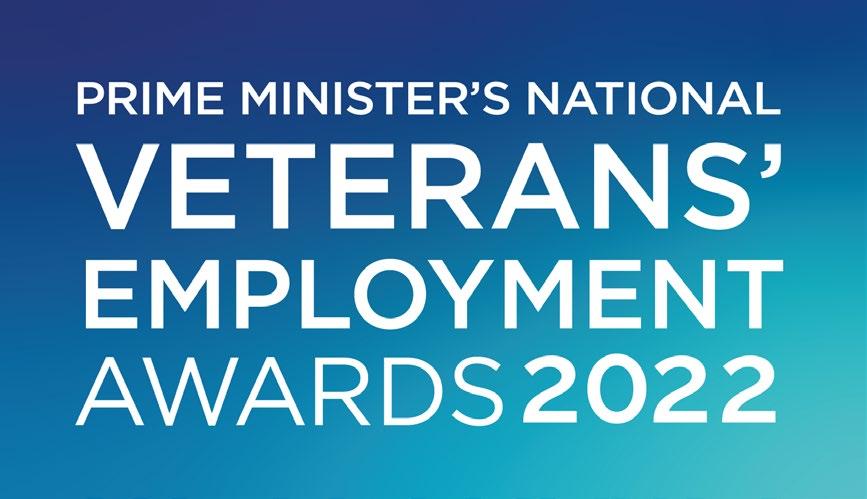
VETERAN EMPLOYEE OF THE YEAR
Nick Elston, Manager, GSA Management Consulting
Following ten years of service in the Australian Army, Nick worked in a range of roles across the public and private sectors before joining GSA Management Consulting in late 2020.
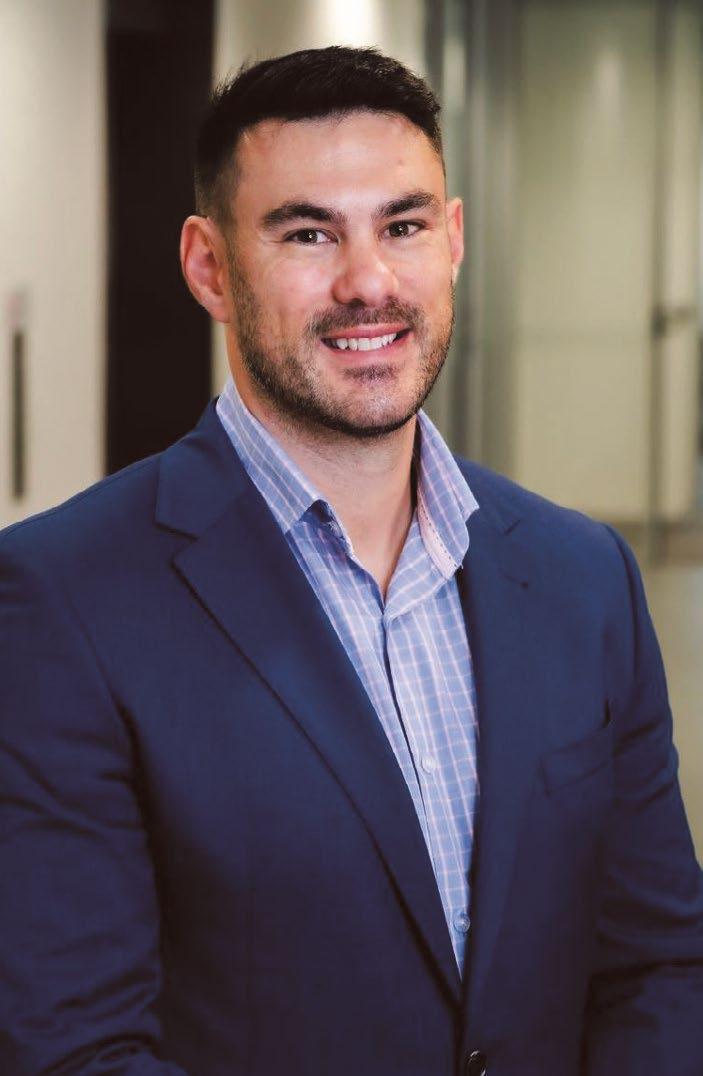
The skills Nick developed during service have directly benefited his workplace, particularly his leadership and planning capabilities.
Using his own transition experience, Nick provides mentorship to other veteran employees in the company and has created employment programs to support others facing challenges in the workplace including veterans, Indigenous Australians, and women in the mining sector.
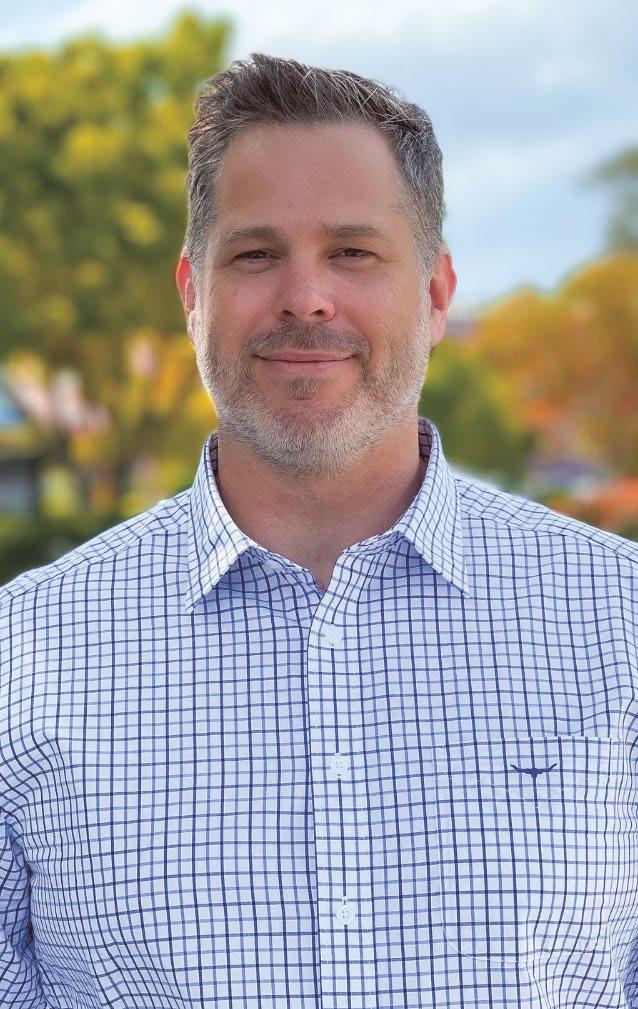
VETERAN ENTREPRENEUR OF THE YEAR Garth Chester, Managing Director, Valenhold
Working within the mining industry, Garth noticed many areas that could be improved and optimised. Keen to implement the changes he thought were needed, he took the risk to start his own company – Valenhold.
His precision mindset, essential to his prior role as an aircraft technician in the Australian Defence Force (ADF), has helped his business, with Valenhold growing its revenue and global footprint, while also tripling its workforce in the last 12 months.
Garth has benefited from the military’s mission-focused ethos and from working in high pressure situations.
Winners of the Prime Minister’sNational
PARTNER EMPLOYEE OF THE YEAR
Katie Vidal, Education Lead, She Maps
Katie is the Education Lead at She Maps, an organisation that uses drone technology to teach school students STEM (science, technology, engineering, maths) literacy. Moving nine times in 17 years due to her partner’s Defence postings, Katie has developed strong problem-solving skills and the ability to be flexible with whatever task that is handed to her.
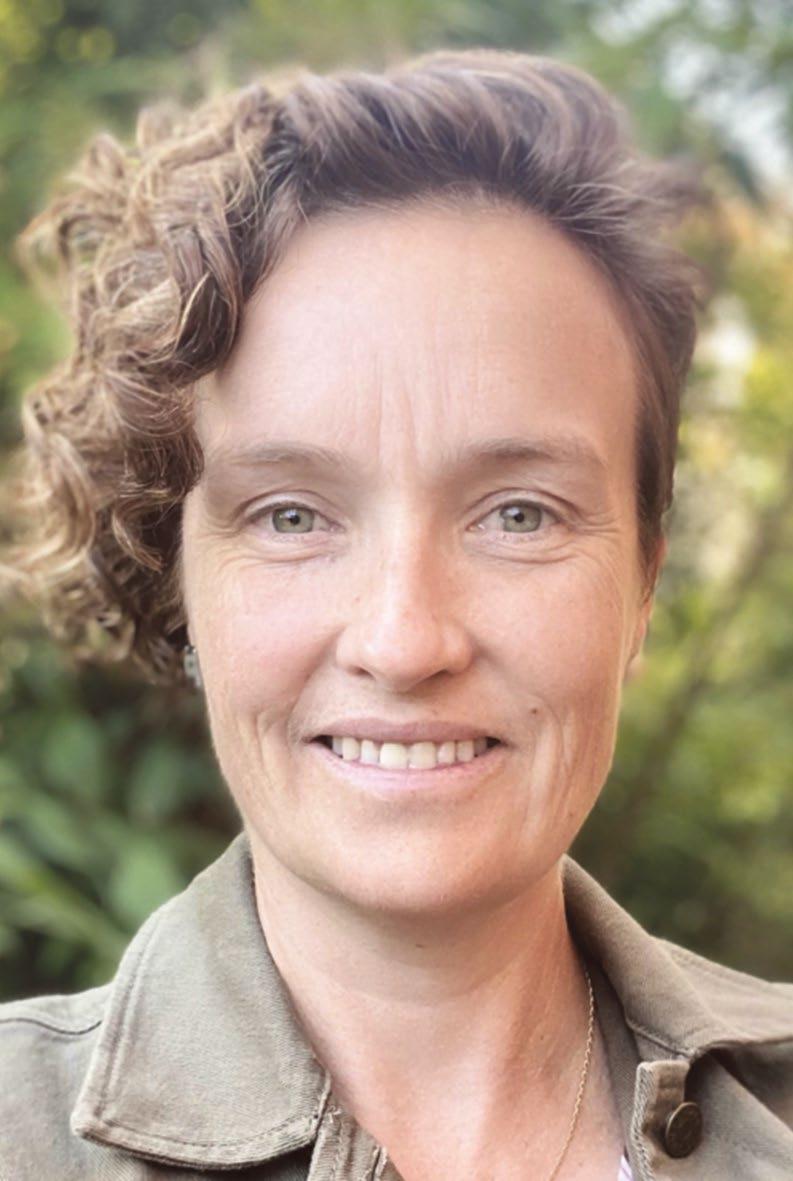
It is these skills that have benefited her as she developed education tools for teachers throughout COVID.
Her advice to other ADF partners is to throw your hat in the ring, have confidence in your skills and don’t be deterred if you feel you don’t meet 100% of the job criteria – you never know where a job will lead you.
PARTNER ENTREPRENEUR OF THE YEAR
Green Fox Training Studio
Kelly is the Co-Founder and Director of Green Fox Studio, a creative agency, and Green Fox Training Studio, a social enterprise. Since 2019, the Green Fox Training Studio team has been working with inmates in the Queensland prison system, teaching them a range of skills to enhance their future employment opportunities in the creative industries.
As a proud Defence partner, Kelly knows the attributes partners bring to the workplace and actively hires from this cohort. Kelly has also used her experience as a Defence partner to support incarcerated veterans through her work, providing additional social and emotional support to those she trains.
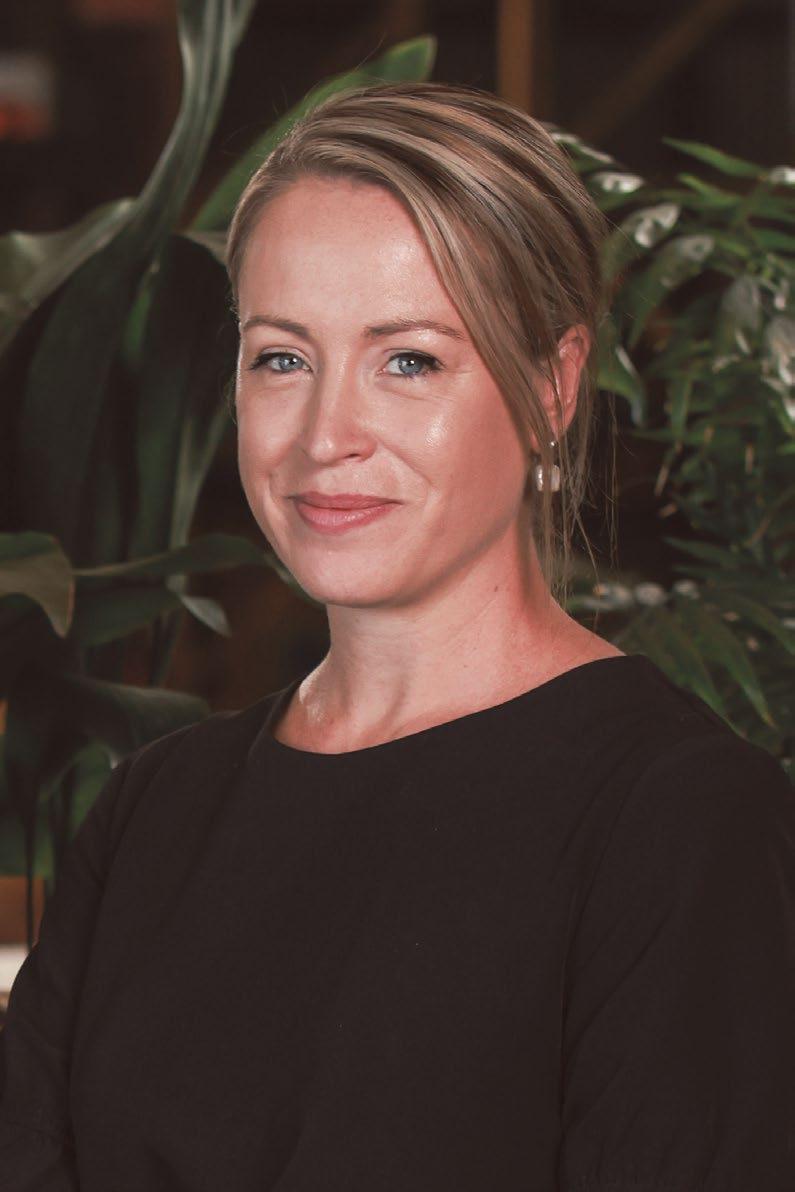
16 Vetaffairs December 2022
Kelly Willmott, Director,
TRANSITIONING WELL
– LARGE
Cubic Defence Australia
Cubic Defence Australia is a Defence provider specialising in C4ISR (command, control, communications, computers, intelligence, surveillance and reconnaissance) solutions. Employing more than 300 full-time and casual staff, veterans make up roughly 60% of their total workforce and 70% of their leadership team.
To help reduce barriers for prospective employees, Cubic’s recruitment team is Defence aware and encourages individuals applying for work to use their military language so they can best represent their capabilities and skills.
Cubic’s operational structure provides veterans new to the private sector with a similar ethos to Defence. It also provides opportunities for its employees to work beyond their specific roles.
If you’re a veteran and interested in working at Cubic Defence, contact Sharon Hoops at sharon. hoops@cubic.com.
OUTSTANDING EMPLOYER OF THE YEAR
Bluerydge
Bluerydge is a veteran-owned and operated cyber security firm. Of its 25 employees, 18 have served in the ADF and the company has achieved a 100% retention rate for its veteran employees.

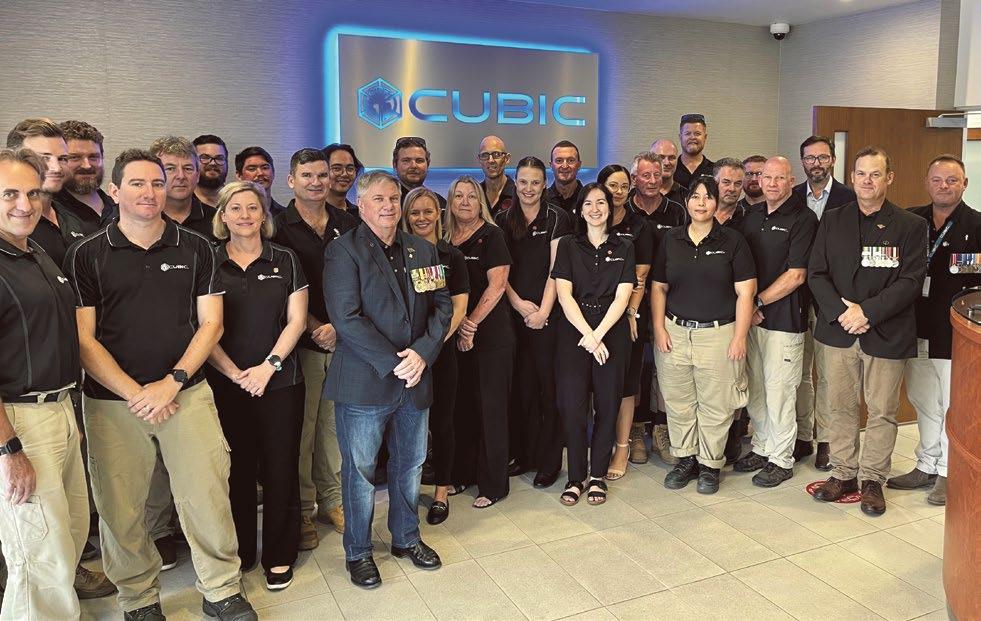
Through its early engagement with prospective staff, Bluerydge is able to support individuals to map out their careers post service and provides assistance in translating skills and experience, and creating action plans to address any gaps in experience.
Putting its money where its mouth is, Bluerydge is actively investing in their staff with 60% of its veteran workforce undertaking post-graduate studies to upskill or gain qualifications that will further their careers.
If you’re a veteran and interested in working at Bluerydge, contact CEO Jim Boekel at careers@ bluerydge.com.
Viden
Viden is a veteran-owned consultancy organisation with a majority of veteran staff, who work across program management, cyber security and integrated logistics support.
Through its implementation of Defence’s On The Job Training initiative and engagement with rehabilitation providers, Viden actively recruits and supports veteran employees at all stages of their transition, including hiring individuals who have medically separated from the ADF.
Embedded within its workplace practices are policies designed to support veterans at every level, including having staff trained in mental health first aid and participating in Soldier On’s mentoring program.
If you’re a veteran and interested in working at Viden, contact Davina Mansfield at d@viden. com
Veterans’ Employment Awards
EXCELLENCE IN SUPPORTING VETERAN AND/OR PARTNER EMPLOYMENT
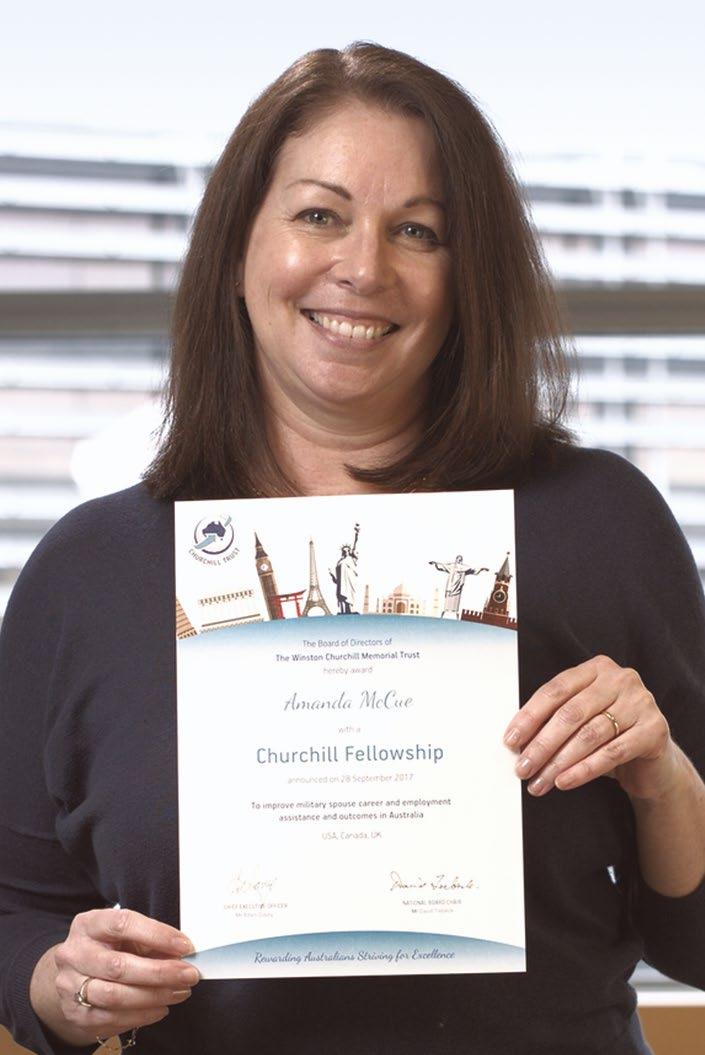
Vertical Scope Group
Vertical Scope Group is a consultancy firm specialising in ICT and cyber security solutions. After noticing inefficiencies in the recruitment process for veterans seeking civilian employment, CEO David Jam decided to create his own solution – the WorkPath Australia Program.
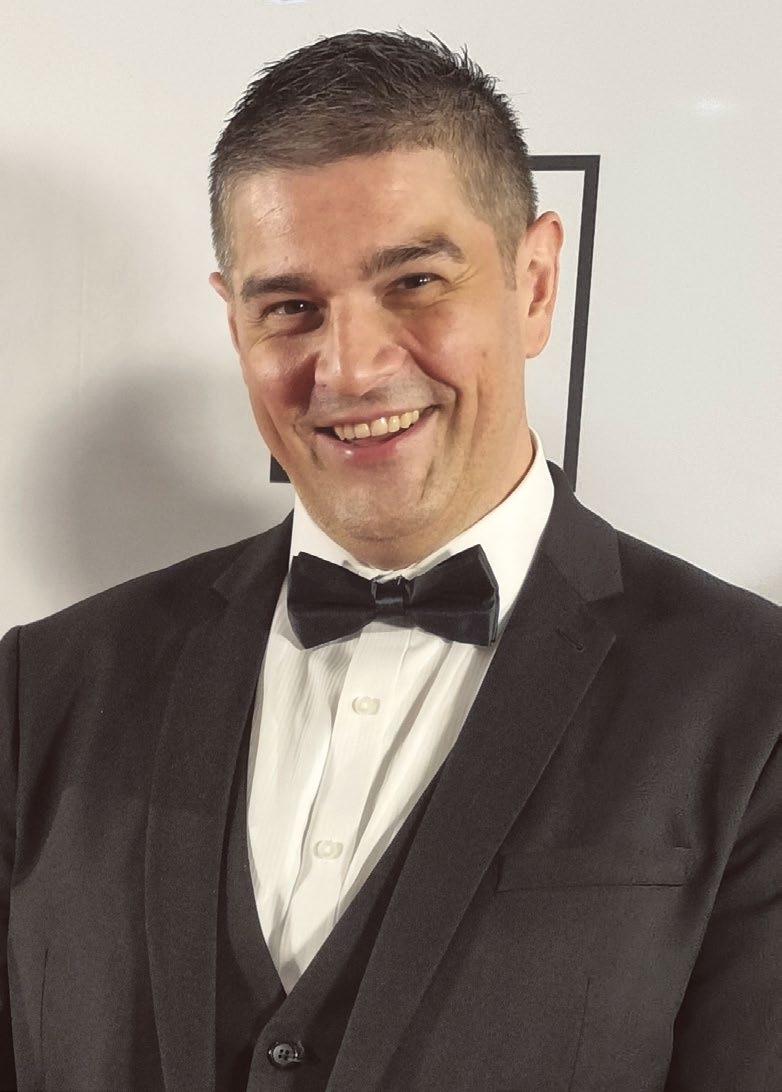
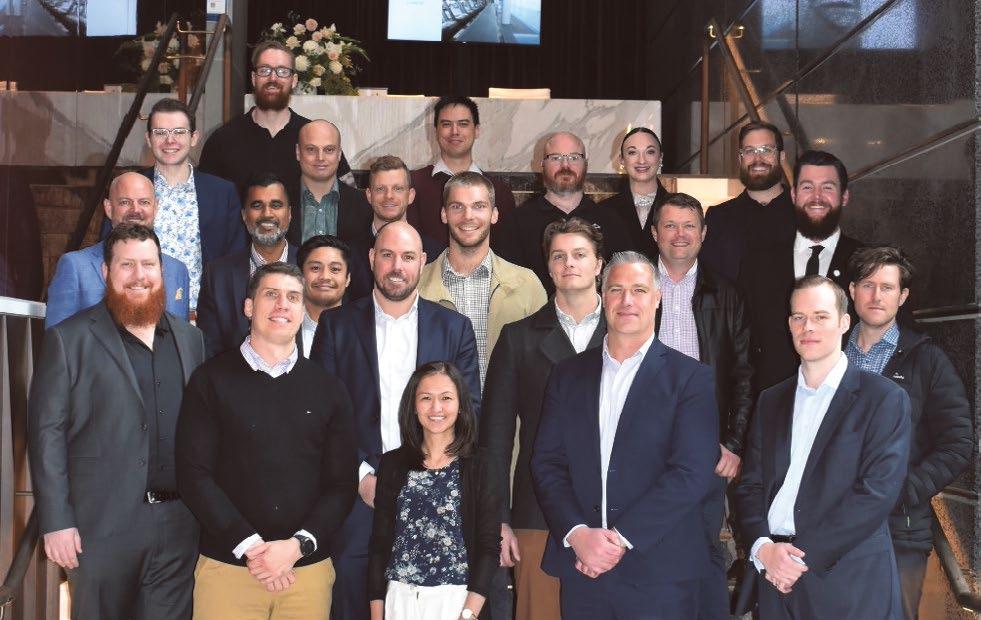
The program supports veterans up to 24 months out from their separation date, providing dedicated support through the entire employment process, from CV development to interviewing and gaining full-time employment.
Since launching the program in 2021, Vertical Scope Group has assisted more than 55 veterans gain full-time employment, all of whom who are all still employed in their original roles.
OUTSTANDING CONTRIBUTION TO VETERAN AND/OR PARTNER EMPLOYMENT
Amanda McCue is an experienced career development practitioner, a military spouse employment Churchill Fellow and an ADF partner. She has dedicated much of her career to understanding, supporting, advocating for and finding meaningful employment opportunities for members of the military community. This includes military partners as well as veterans who are transitioning, or have been in the civilian workforce for some time.
As an expert consultant and fierce advocate for military spouse employment, Amanda works with employers, all three levels of government and other key stakeholders to help them better
understand the benefits of supporting military spouse employment, and how this might be achieved.
December 2022 Vetaffairs 17
Amanda McCue
EMPLOYER OF THE YEAR
EMPLOYER OF THE YEAR – MEDIUM
EMPLOYER OF THE YEAR – SMALL
David Jam, CEO and Managing Director, Vertical Scope Group
ESO NEWS
Please be aware that articles in ESO News have been submitted and written by ex-service and related organisations. The articles do not necessarily represent the views of DVA. ESOs are welcome to submit stories for publication by emailing vetaffairs@dva.gov.au . Some of the articles on these pages have been shortened. You can see the full versions online at dva.gov.au/vetaffairs
RSL National President re-elected and looking ahead
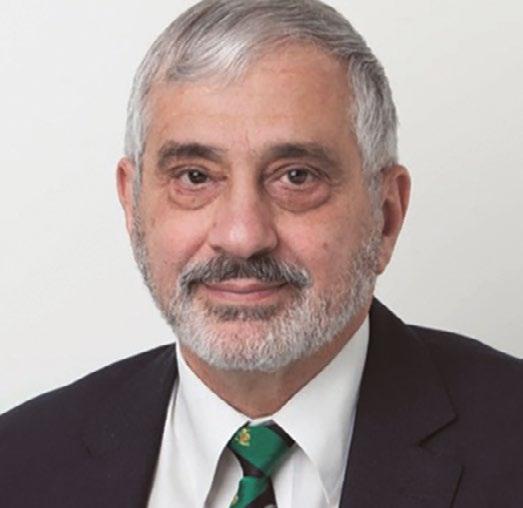
A message from the RSLA
On 17 October, the Returned and Services League of Australia (RSLA), held its AGM in Canberra, during which Greg Melick was re-elected for a second three-year term as the RSL National President.
Senior Counsel and retired Army Reserve Officer Greg Melick has had an extensive and varied career with experience on many prominent councils and boards. His renewed Presidency provides an opportunity to continue to oversee various projects that will take the RSL forward as part of its National Strategic Plan.
A key focus for RSLA in 2022 and for the next two years is its continued support and contributions to the Royal Commission into Defence and Veteran Suicide. The RSL wants
to ensure the veteran community feels supported through the process and that the best outcomes are achieved through its findings and recommendations. Among the recommendations that have arisen from the Interim Report’s findings, the RSL sees an opportunity to increase the level of collaboration within the ex-service organisation (ESO) community and to develop new solutions that will make finding and accessing the services available to our veteran community easier.
National ESO Forum
In an effort to better coordinate ESO efforts, the RSL hosted a National ESO Forum in mid-November to foster discussion and collaboration on the findings of the Royal
Commission. The RSLA would like to see these forums become regular events. The topics would evolve, but the purpose of collaboratively finding ways to improve the delivery of services and support would remain at the core. Find out more: www. rslevents.com.au
Veterans’ Catalogue app pilot launched

Acknowledging the complexity of the veteran community’s support system, which has also been a common theme reported through the Royal Commission’s hearings, RSLA has partnered with technology provider Servulink to deliver a web application designed to streamline and simplify the path to support. Launched on 1 November, the Veterans’ Catalogue app empowers
veterans and families to more easily find and connect with the services and support they need when they need them. Find out more: www. rslaustralia.org/veterans-catalogue RSL Active
The RSL continues to develop its RSL Active program, supporting various events and initiatives that encourage veterans to get out, get active and connect with likeminded people. In recent months
RSL Active Strava Clubs have gained a lot of traction as a virtual sports club where people can share, view, celebrate and participate in group challenges via the Strava App. The two RSL Active Clubs established for runners/walkers and cyclists now have several hundred participants each and continue to grow. Find out more: www.rslaustralia. org/rsl-strava-club
National Servicemen’s commemorative service held at AWM
By Ron Brandy, National President, National Servicemen’s Association of Australia (NSAA)
A COVID-delayed commemorative service for all former National Servicemen was held at the National Servicemen’s Memorial at the Australian War Memorial (AWM) on 8 September 2022.
We commemorated three key dates in the history of post Second World War National Service:
• 2021 – 70 years since the start of the 1951–59 National Service Scheme
• 2022 – 50 years since the end of 1965–72 National Service Scheme
• 2022 – 12 years since the 8 September 2010 dedication of the National Servicemen’s Memorial.
More than 280,000 men were conscripted for compulsory military service in the two post Second World War National Service schemes. Of this number, 210 died on active service in Vietnam and two in Borneo, while more than 1,200 were wounded, and many men and their families have suffered the psychological and emotional scars of war.
We were privileged to have National Servicemen and their family members attend from most states and territories, travelling independently and in buses over long distances. As mentioned on the day, the significance of this occasion cannot be overemphasised, as for some this may well be the last opportunity to be present at a National Service commemoration at the AWM.

National Servicemen and their families were welcomed by the AWM’s Director Matt Anderson PSM, the Commemorative Address was delivered by Minister for Veterans’ Affairs Matt Keogh and Dr Brendan Nelson AO who delivered the keynote address as NSAA patron.
All speakers reflected on the appreciation of the nation for the service of National Servicemen and reinforced the significance of ‘service before self’ and that ‘service is an act of helping’, as an underpinning element offered by all National
Servicemen, and all of those who have worn the uniform of the armed forces of Australia.
Our service also recognised and celebrated the dedication of those of the NSAA team who, from 2002 through to the 2010, worked tirelessly in collaboration with AWM staff, and supporting specialists, the ACT Government, and other agencies, to deliver the National
Servicemen’s Memorial dedicated 12 years ago. The NSAA implementation team were blessed with the generous financial support of many individuals, Mr Kerry Stokes being one, NSAA members, and the Australian Government through the Department of Veterans’ Affairs.
This was a significant service, at a significant time, and in a significant location. Lest we Forget.
18 Vetaffairs December 2022
From left: Mr Frank Miller, Chairman, Officer Training Unit Association Scheyville; Mrs Mary Brandy CSM, Mr Ron Brandy, National President, NSAA; Barnaby Joyce, Shadow Minister for Veterans’ Affairs; Andrew Hastie, Shadow Minister for Defence; Matt Anderson PSM, Director, AWM; Ms Emma Davidson MLA ACT, Minister for Veterans’ and Seniors; Dr Brendan Nelson AO, Patron NSAA and Chairman AWM Board; Matt Keogh, Minister for Veterans’ Affairs. Photo courtesy of AWM.
Greg Melick
Australian veterans excel at Lifesaving World Championships
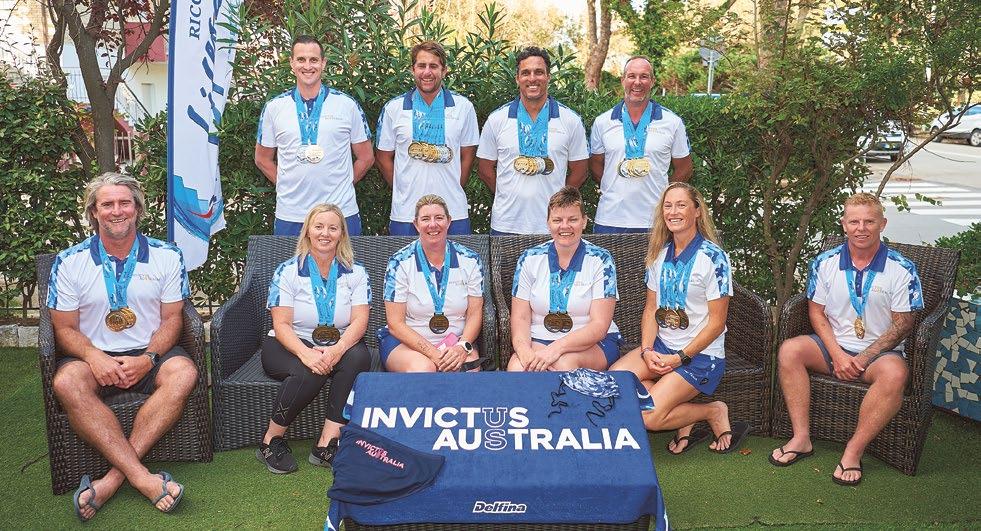
Championships in Riccione, Italy, have made their mark, showcasing to the world that Defence service and lifesaving go hand in hand.
But there was a time when the team was unsure they’d even make it to Italy.
and mateship on display was that of a cohesive team, and more, a family.
A message from Invictus Australia
The first ever team of veterans to compete on the world stage at the 2022 Lifesaving World
The event was the first time Team Veteran Australia, powered by Invictus Australia, met face-to-face, after the 2020 event was postponed due to COVID. Every member of the team, led by Team Manager and Invictus Games alumnus, Sean Lawler, have worked incredibly hard to sustain fitness and momentum over the past two years. They’ve also had to battle personal challenges, source funding to cover costs, and deal with the uncertainty of global events. The team has epitomised the unconquered Invictus spirit at every turn.
The camaraderie, commitment to each other,
Formation of the Association of Australian Army Training Teams (AAATT)
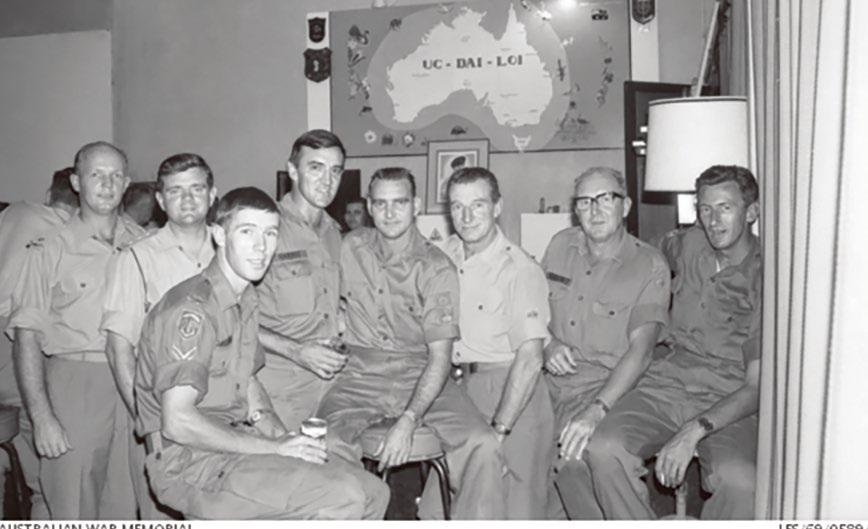
A message from the AAATT
Have you served with one of the many contemporary Security Force Capacity Building Teams undertaken by the Australian Defence Force? If you did, you may be interested in joining the recently formed Association of Australian Army Training Teams (AAATT).
Brigadier Ash Collingburn DSM, former Commanding Officer of the Task Group Taji 1 Training Team (2015), encourages serving and retired veterans to join the AAATT. ‘Why should you join?’ he says. ‘To preserve the legacy of all Australian Army trainers who have served their nation abroad, and to foster the mateship and close ties you have forged through shared training team experiences.’
The Australian Army has a strong and significant history of training partner forces on operations and exercises. Since 1917, thousands of Australian Army servicemen and women have deployed on training missions in support of allies and partners. Often these deployments comprise bespoke contingents drawn from across the breadth of Army. Training missions rarely attract the profile of combat deployments and much of their history has been forgotten.
If you are interested in joining the AAATT, finding out more about the Association, wanting to contribute photographs (for our Instagram and Facebook webpages), read a history of Australian Army Training Teams, or wish to volunteer to assist the growth of the AAATT, please email: • secretaryaaatt@optusnet.com.au
• aaattsteeringgp@gmail.com or view
• instagram.com/armytrainingteamsaustralia/ • Facebook (search ‘AAATT’).
Navy Clearance Diver Trust helping out our community
A message from the Navy Clearance Diver Trust
Established in 2011, the Navy Clearance Diver Trust exists to provide support for life for serving and ex-serving clearance divers and their dependants. This mission is achieved through two avenues:
1. providing relief for clearance divers and their dependants from hardship resulting from injury or health impacts (physical or mental) of their service or training
2. providing support programs aimed at helping clearance divers and their dependants to transition into civilian life successfully through initiatives such as professional career coaching
to transitioning or recently transitioned clearance divers.
Royal Australian Navy clearance divers have served in all major conflicts since the branch was established in 1951, including Malaya, Vietnam, the Gulf War, Somalia, East Timor, the Iraq War and Afghanistan. Clearance divers are also used in high-risk ship boarding (such as suspected pirate vessels). In the current international climate of a threat from terrorism, clearance divers represent one of the most valuable and flexible assets of the ADF.
More information on the Navy Clearance Diver Trust and contact details for ex clearance divers or donors can be found at ncdt.org.au.
While the event was always about more than medals, as a sports-loving nation, Aussies want to know how we stacked up. The results were a reminder and testament to what can be achieved when we live by the motto: ‘I am the Master of my fate, I am the Captain of my soul’. The team brought home 35 medals:
• 16 Gold
• 9 Silver
• 10 Bronze
Yet it’s the stories of mateship, resilience and the power of sport for wellbeing that made this an experience to remember. Well done, team –you’ve done Australia and yourselves proud!
For more on this story, visit the Invictus Australia website (invictusaustralia.org).
Gallipoli Scholars visit Canberra
A message from the Gallipoli Scholarship Fund Gallipoli Scholarships are awarded annually to direct and disadvantaged descendants of veterans who have served in any conflict or peace operation from the First World War.
The Scholarships are awarded for those undertaking tertiary education throughout Australia.
In September, seven of this year’s 30 Gallipoli Scholars came to Canberra. The Scholars visited the Australian War Memorial where they had a conversation with Director Matt Anderson PSM, toured the galleries and laid a wreath during the Last Post Ceremony.
The Scholars also visited Government House where they met and had discussions with the Fund’s Patrons, Their Excellencies the Governor-General General the Hon David Hurley AC DSC and Mrs Hurley.
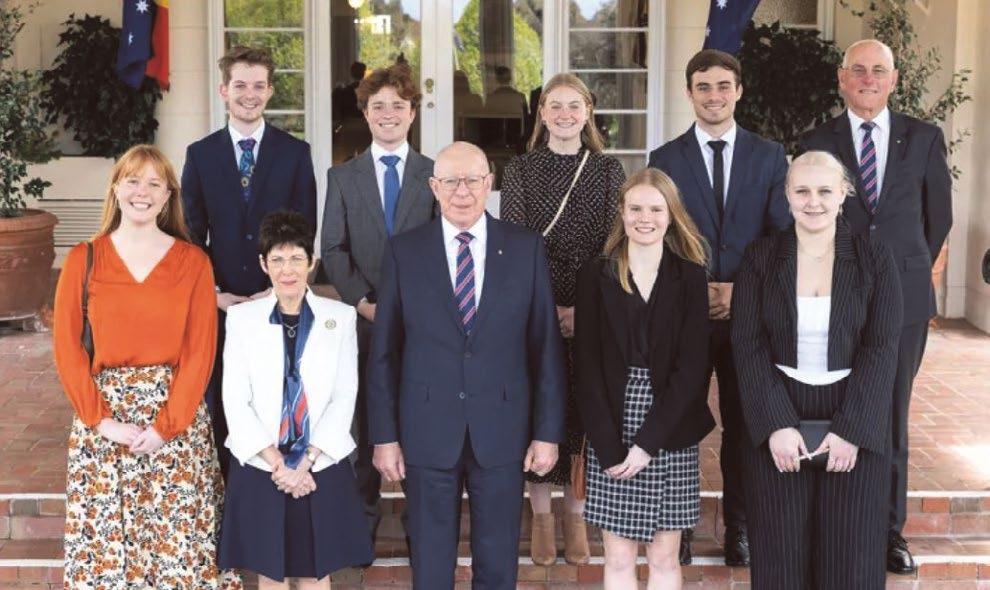
Three of the Indigenous Scholars also visited Calleo Indigenous Pty Ltd, which is funding their bursaries.
Ashleigh Witenden, one of the Scholars studying at the Australian National University, whose mother served in Rwanda, expressed the views of the group when she told Their Excellencies that the visit had been ‘absolutely awesome and life-changing’.
Applications for 2023 Gallipoli Scholarships open on 1 January and close on 28 February 2023. They must be submitted online via the Fund’s website (gallipolischolarship.com.au).
December 2022 Vetaffairs 19 ESO NEWS
Back row, from left: Chris O’Brien, Alex Tibbits, Dane Hurst, Ryan Gaylard; front row: Zane Holmes (Coach), Dana Richards, Simone Read, Louise Skjeime, Kelly Marsh, Sean Lawler (Team Manager)
The Scholars with Their Excellencies the GovernorGeneral General the Hon David Hurley AC DSC and Mrs Hurley. Major General Michael G Smith AO (Ret’d), Chairperson, Gallipoli Scholarship Fund is top right.
Australian Army Training Team Vietnam members get together for the traditional toast after the announcement of WO2 Keith Payne’s (centre) Victoria Cross, Saigon, Vietnam, 1969.
FAMILIES
Female Veterans & Veterans’ Families Policy Forum
The Female Veterans & Veterans’ Families Policy Forum was held on 15–16 June 2022 at DVA’s head office in Canberra.

This high-energy, solutions-focussed event brought together 42 community members with DVA and Department of Defence leaders, to explore areas where their lived experiences of military service and military family life could inform government decision-making. Their passion, insight and commitment to serving the community was on full display as participants worked collaboratively to explore policy and service delivery ideas for the benefit of future veterans and families.
Forum participants discussed topics including future veteran support needs, the DVA Veteran Family Strategy, research in the veteran and family landscape, and the future of mental health service delivery. Participants had an opportunity to present their ideas
and feedback directly to DVA and Defence leaders.
Some of the suggestions included:
• greater consideration for female veterans’ unique health issues
• targeted research and supports for veterans’ children through all life-stages
• more inclusive practices for female veterans while serving
• demand-driven funding to ensure that service provision is matched to demand
• greater emphasis on access to services in rural and remote locations
• increased opportunities and recognition of the value of ‘service after service’.
Participants were also invited to present to the Forum on initiatives to support veterans and families happening in the community.
These powerful and personal presentations highlighted a range of important topics including veteran employment, peer support and alternative therapies, professional
Access to the Defence, Veterans’ & Families’ Acute Support Package
In September, legislation passed in Parliament to enable the Defence, Veterans’ and Families’ Acute Support Package. This package expands the existing Family Support Package to provide more practical services and flexibility for families.
Requirements for veterans to have warlike service or be participating in rehabilitation were removed. Eligibility has been expanded to working age families of veterans eligible for certain payments under all three Acts, who are at risk of or are in crisis. Working-age widowed partners of veterans whose death was related to service, including suicide, under all three Acts are also now eligible. This eligibility expansion allows veteran families to access important support when they need it most.
Support for widowed partners has been improved by allowing them to access support for two years from the date of acceptance into the program, rather than the date of death of the veteran.
Financial limits for each service category of childcare, counselling and household services have been replaced with an overall yearly cap, providing families with greater flexibility Additionally, a range of new practical supports are available to help families build independence and resilience including but not limited to financial literacy, mental health first aid, academic and wellbeing support for children, resilience development and counselling.
Access to the Defence, Veterans’ and Families’ Acute Support Package began 14 October 2022.
For more information, including eligibility requirements, visit the DVA website (dva.gov.au and search for ‘acute support package’).
development and mentorship, ADF reserve service, advocacy and the interaction of government policy with local communities.
DVA uses the information and insights from the Forum to directly inform our policy and programs and the wider transformation of DVA supports and services.
One participant said:
'This Forum showed just how DVA is consistently acting and implementing, listening, engaging and looking to the future in order to continually progress, for the wellbeing of all veterans and those with families.'
DVA would like to thank all those who attended the Forum for their time, energy and passion.
Melbourne Legacy’s Case Management Model for families in need
A message from Melbourne Legacy
We provide comprehensive case management services to almost 300 families of post-1991 veterans, and this number is growing daily. Our case management model is all-encompassing and applies for life. So, when the veteran family needs support, Melbourne Legacy is here to provide it.

The model ensures these families are supported emotionally and financially by a team of qualified social workers and counsellors with a diverse range of professional knowledge and lived experience. By commissioning extensive research into the ex-service organisation (ESO) sector and veteran community in Victoria, we have been able to identify and close service delivery gaps through:
The basis for our case management model is listening to people and being able to provide understanding and a helping hand.
Melbourne Legacy’s case managers are patient and supportive as they work to assess each family’s needs depending on their unique circumstances and then develop a plan to best support the family. The plan may include help with education costs, emergency financial assistance, counselling services or support and guidance for alternative housing, but is not limited to these outcomes.
Uncertainty is a common issue for many of the families Melbourne Legacy supports, giving rise to anxiety and stress levels. Many of the veteran families we support have reported relationship issues and some, sadly, are dealing with domestic violence.
The struggles that some veteran families are facing is hard. However, the case management model helps lessen those struggles as the families move to greater self-reliance and the ability to build their best future.
If you live in the Melbourne area and the immediate family of a post-1991 veteran, get in touch with us on (03) 8626 0500.
20 Vetaffairs December 2022
Forum attendees, including (centre) Minister for Veterans’ Affairs Matt Keogh, Assistant Minister for Veterans’ Affairs Matt Thistlethwaite, and DVA Secretary Liz Cosson AM CSC.
Employment Awards shine a light on partners
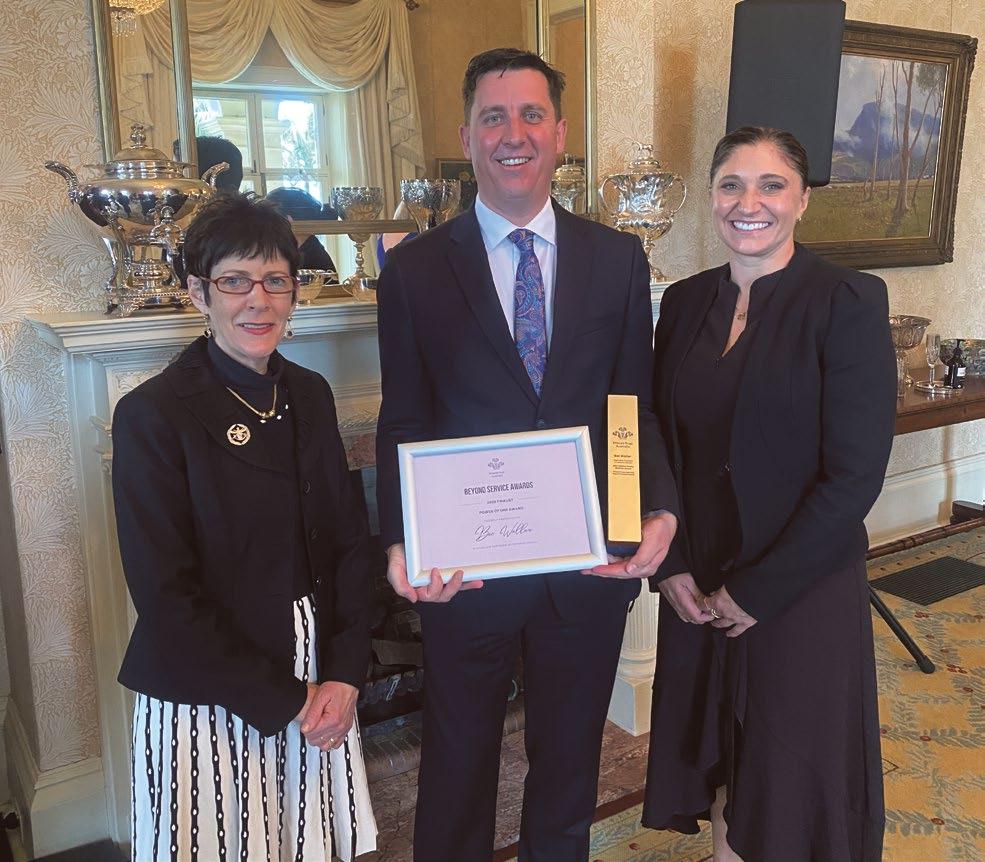 COMMISSIONER GWEN CHERNE Veteran Family Advocate
COMMISSIONER GWEN CHERNE Veteran Family Advocate
Each year the Prime Minister’s National
Awards shine a light on the depth and breadth of talent in our veteran community. This year, for the first time, there were also specific categories for Partner Employees and Partner Entrepreneurs included in the Awards.
This was great to see. Partners are a diverse and skilled cohort with experiences in many occupations and industries. Yet, many face barriers to meaningful employment.
Historically, employment within military families was based on the breadwinner/homemaker model. Even today, when the majority of Australian households are dual income, partners are often viewed as supporting the serving member or veteran. Their careers often play second fiddle to their partner’s. They are enablers, trailing spouses, following their partner from one posting to the next.
Even though contemporary attitudes have changed, barriers to finding rewarding work remain. Katie Vidal, who won Partner Employee of the Year in this year’s awards, noted that in 17 years she moved nine times with her partner, which included two stints overseas. This disrupts careers. People lose professional contacts and networks. They often find themselves in locations with high unemployment or where the job they are trained in does not exist. Other barriers to finding suitable employment also include family responsibilities and employer perceptions towards people in ADF families.
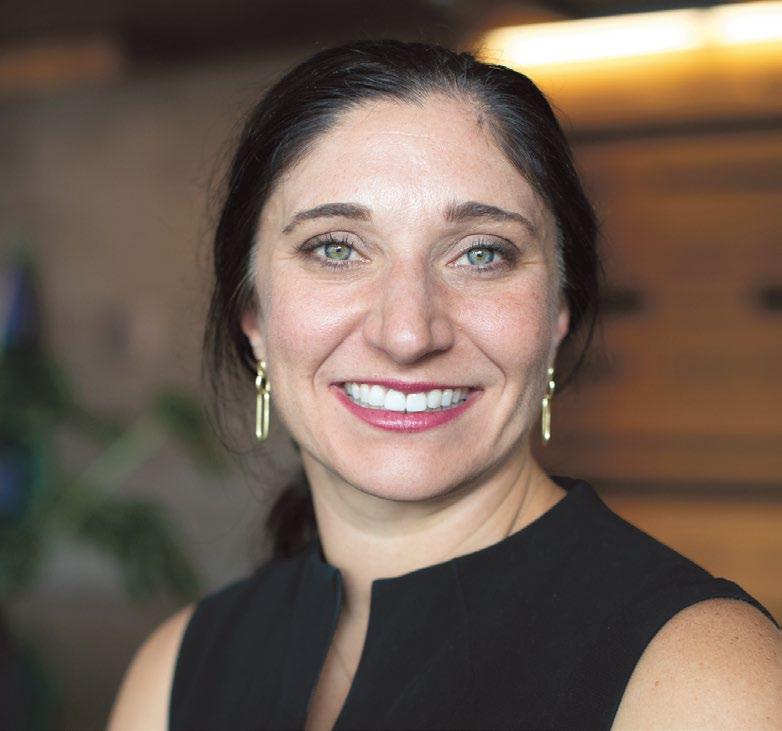
Whatever the cause, the outcome is the same –many partners end up in work that does not meet their needs or desires. We know being unemployed, or stuck in a bad job has negative impacts. It affects everything from feelings of self-worth and financial security through to community connection.
The issue of partner employment can also have an impact on the ADF’s ability to retain personnel. The United Kingdom’s Armed Forces Families’ Strategy noted that one of the key push factors personnel report when deciding to leave is the difficulty their partner experiences when it comes to finding employment. This shouldn’t come as a surprise. After all, how attractive is a job if it curtails your partner’s career ambitions?
While this is a problem, it has created an opportunity for employers. There is an untapped talent pool searching for employment. To thrive in military life, partners develop skill sets that many employers value: resilience, flexibility, resourcefulness and a community focused mind-set. They have the ability to work well under pressure and balance stress. They also have a willingness to jump right in and learn new skills on the fly. The challenge is connecting ADF partners with the right job.
In the past, partner employment was an invisible issue in Australia. But fast forward to today and that is changing. There is now a range of options and services, delivered across government, non-profit and for-profit organisations.
To list a few, Defence Families Australia, Soldier On, RSL Australia and RSL Queensland Employment Programs, Bravery Trust, The Prince’s Trust Australia, Wandering Warriors all have support programs. In addition, there is the ADF’s Partner Employment Assistance Program and the Department of Workplace Relations Self-Employment Assistance program. The Australian Catholic University and Wollongong University, as well as some state and territory government supported programs (eg: TAFE NSW Veteran Skills), assist with further education. And there is also the partner employment support offered from Veteran Employer Commitment signatories such as Westpac, BHP and BAE Systems.
While it is fantastic to see so much growth in support for partner employment, many people may not be aware of the help that is out there. One of the best first steps you can take is to get in touch with your local Veterans’ and Families’ Hub. The Hubs hold a wealth of information on what support is available and how to access it. To find your nearest Hub, go to dva.gov.au
The range of employment support for partners has expanded greatly, but there is still more work to do. Often the services organisations offer have been added or integrated into existing veteran employment programs. It is one thing to add families to veteran-centred career programs, but it is another thing entirely to create programs specifically designed for Defence and veteran partners.
I recognise this takes work, and requires significant collaboration across a range of organisations. A great starting point was a focus on partner and family employment during the Veteran Employment Roundtables Minister Keogh held in the lead up to the Jobs and Skills Summit in September. I look forward to seeing the Employment White Paper which is being developed and will build on the Summit’s outcomes.
Increasingly, the issue of partner employment is being recognised and acted upon here in Australia and around the world. The first International Military Spouse Employment Summit 2022, organised by Australian Amanda McCue, assists in building coalitions, programs, and research that help us understand barriers to
meaningful and consistent employment for military spouses.
This is an important step, and we need to use the momentum of events like this to create change. In the short term, we can assist ADF and veteran families by improving access to information regarding existing services. In the longer term, I am keen for us to consider how the efforts of everyone who provides partner support can be improved. I believe partner employment needs to be aligned, but differentiated from veteran employment activity. We must create and fund programs focused on partners and spouses of current serving and former serving families. We need support from Defence, DVA, ESOs and industry to make this work and to move from awareness to action.
We must provide consistent advocacy and messaging to ensure employers recognise the value of partner employment. Hiring fairs, networking events, mentoring opportunities for partners, spouses and widows will support this message. And finally, we need to put our words into action. If I have learned one thing over the last five years, it is that we need more people with lived experience at all levels of our organisations.
Dismantling employment barriers and providing career support to partners opens up opportunities for partners, their families, the ADF, employers and the community. Our ADF families have a lot to offer, and with the right help, there is no limit to what they can achieve.
than 3,000 brands and 21,000 stores, supporting more than 127,000 Defence and veteran
December 2022 Vetaffairs 21
FAMILIES
Veterans’ Employment
Gwen Cherne with Her Excellency Linda Hurley and Paul Broadbridge, Australian Partners of Defence (APOD) Chief Executive Officer, who accepted the Prince’s Trust Defence Family Business Award, which was posthumously awarded to his fiancé Bec Waller. Bec founded APOD in 2012 and today APOD works with more
military families and recognised veteran-owned businesses.
80th Anniversary of the Australian Army Medical Women’s Service
By Jason Smeaton, PhD candidate at the Australian Catholic University
On 18 December 1942, the Army formally established a women’s auxiliary to support the staff of military medical establishments. Fundamentally, the role of the auxiliary was to provide support as orderlies to the trained nurses of the Australian Army Nursing Service (AANS). Formed out of the Voluntary Aid Detachment (VAD) movement, it was part of the broader mobilisation of Australian women during the war and the creation of various women’s auxiliary services. Given official status as an Army auxiliary, this service became known as the Australian Army Medical Women’s Service (AAMWS). The Navy and Air Force never called upon VADs, and instead relied on their own nursing services.
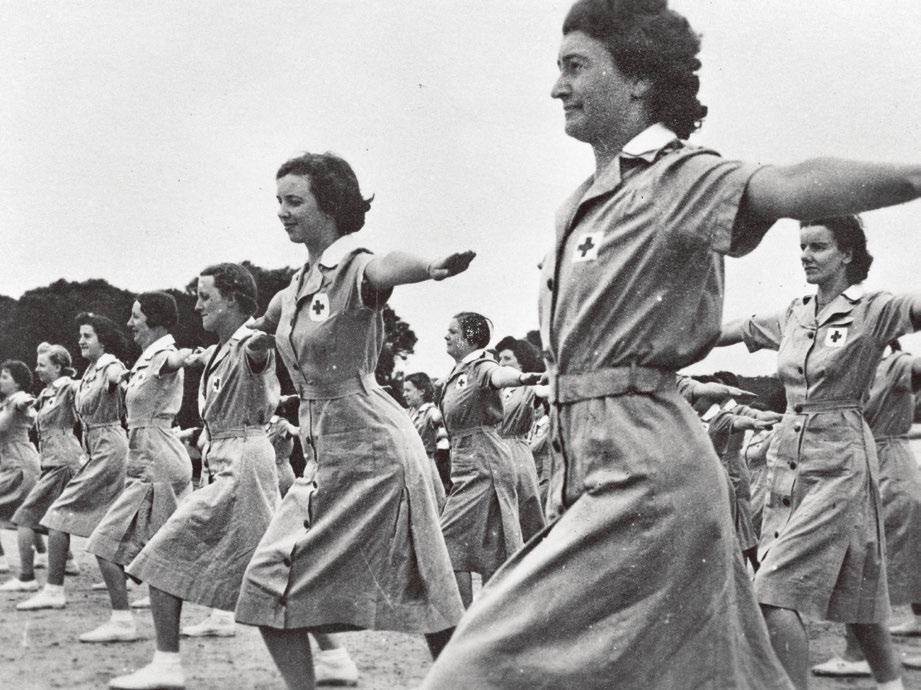
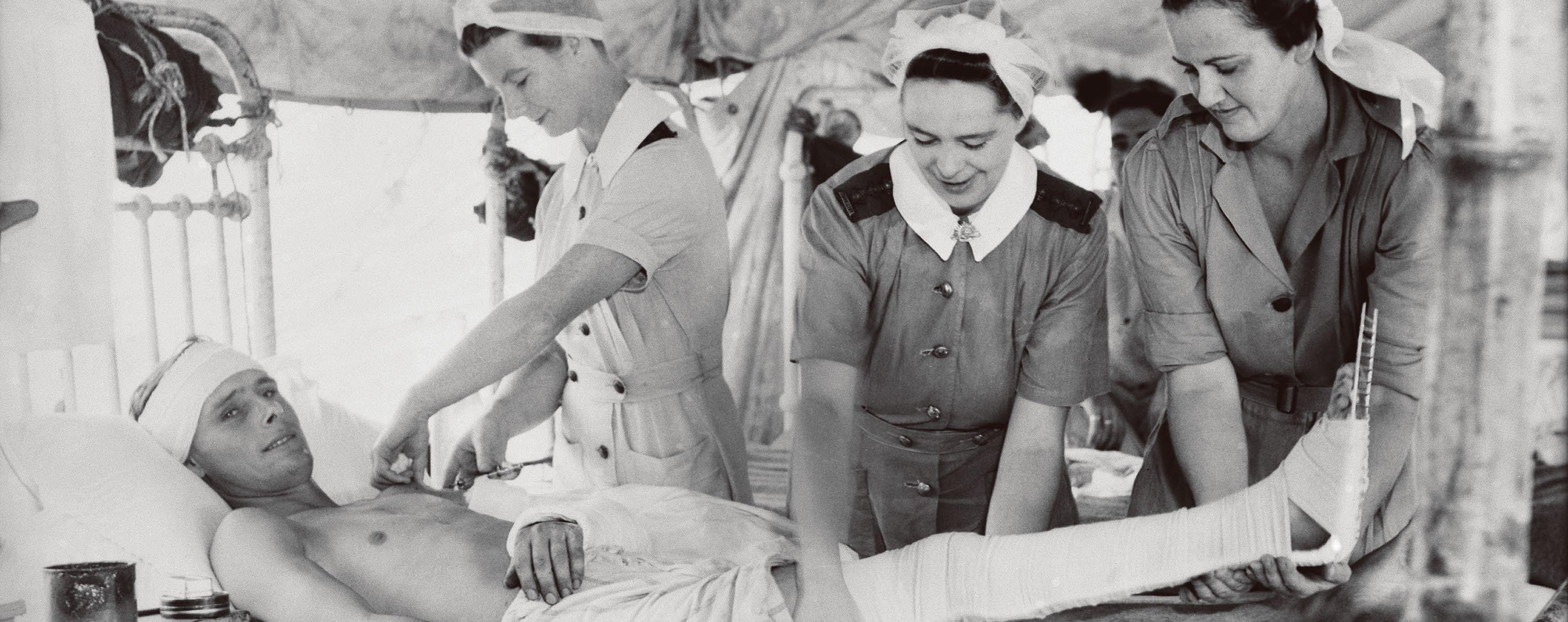
Alice Appleford (nee Ross King) is just one of the roughly 8,500 women who served in the AAMWS during the Second World War. She exemplifies the deep connection that existed between the nursing profession, the Army, and the AAMWS nursing orderly.
Following her First World War service where she was just one of seven Australian Army nurses to receive the Military Medal, Alice Ross King became a notable nurse in Australia. But, like many women, after her marriage to fellow veteran, Sydney Appleford, Alice had to resign her position. This, however, was not the end of her commitment to nursing or the military.
In the interwar years, Alice joined the VAD movement. Here, with her nursing and military experience, Alice contributed to the recruitment and training of civilians in first aid and home nursing throughout the Gippsland region in Victoria. As civilians, the VAD prepared to support the military medical and nursing services as a technical reserve during an emergency. To Alice, her work with the VAD and then the AAMWS
ensured that she was helping the service become a proficient auxiliary to the AANS.
Such a situation occurred when war broke out in 1939. At first, women volunteered as VADs in military hospitals. By mid-1940, the Army Director-General of Medical Services, Major General Rupert Downes, recognised their efforts and encouraged the Minister for the Army, Percy Spender, to enrol VADs in paid full-time service. From December 1940, women were enrolled in the Army as VADs and paid for their work as orderlies. With the creation of the AAMWS in December 1942, the women serving as VADs in the Army were absorbed into the new auxiliary. Alice Appleford was given the rank of major and made leader of the AAMWS in Victoria.
As VADs, these servicewomen were posted to Ceylon (now Sri Lanka) and the Middle East and served on hospital ships. Then, as AAMWS, they staffed troop trains, worked in northern Australia, and served in the Pacific islands, including Morotai and New Guinea. They also staffed base and camp hospitals throughout Australia.
Servicewomen in the AAMWS took on a variety of roles in and around military medical establishments. Many served in hospital wards as nursing orderlies. Others became technicians in laboratories and blood banks. AAMWS also worked in hospital kitchens and laundries, and ran the postal and telephone services. As AAMWS Private Sheila Sibley put it, ‘Marching side by side with the Lady of the Lamp … you’ll find the lady of the laundry, and her good companions, the ladies of the skillet and the scrubbing brush’.
Assisting the registered nurses and medical officers, the AAMWS turned to any job that needed doing. Serving on Bougainville, Maud Whiting worked as a theatre orderly, monitoring the use of instruments and sterilising equipment.
Maud also became an expert in mending and preparing all manner of surgical equipment for reuse. Because of the shortage of resources, especially on the islands, surgical gloves with holes were not disposed of, but were patched over by AAMWS. ‘Sister would check them after and blow into them to see if there was any air coming in,’ Maud recalled. ‘And they were worn over and over again.’
One AAMWS, who had trained with the local Warragul VAD formed by Alice Appleford, was Janet ‘Jean’ Wallace. Before the war, Jean had no ambition to become a nurse. But as an AAMWS, she got to see and experience what it was like to be one. Serving in Katherine in the Northern Territory, Jean recalled that, ‘There was always something happening. New patients, new treatments to learn, and lectures to attend’.
Jean immersed herself in her nursing duties, which included distributing mixtures and medications, ensuring patients were fed according to any special diets, conducting urine tests, and checking temperatures. She also extended her knowledge of nursing by attending lectures on caring for and treating surgical cases, tropical diseases, pathology, and psychology. Under Alice’s watchful eye in the AAMWS, the experience Jean gained saw her return to Warragul after the war to begin her formal training to become a registered nurse.
Through the guidance of leaders such as Alice, and the dedication to duty as shown by Maud, Jean and many others, the AAMWS made a positive contribution to the war effort, and to the nursing profession after the war.
22 Vetaffairs December 2022 FEATURES
Members of the AAMWS in 1944
Two Australian Army Nursing Service sisters and a member of the AAMWS (left) attending a patient at the 2/1st Australian General Hospital, New Guinea, 1944
Veterans helping to redevelop the AWM
By Claire Hunter, Australian War Memorial
Liam Barbic is in his element.
Having swapped his Army uniform for a hardhat and high-vis vest, Liam is one of the former soldiers working on the redevelopment taking place at the Australian War Memorial.
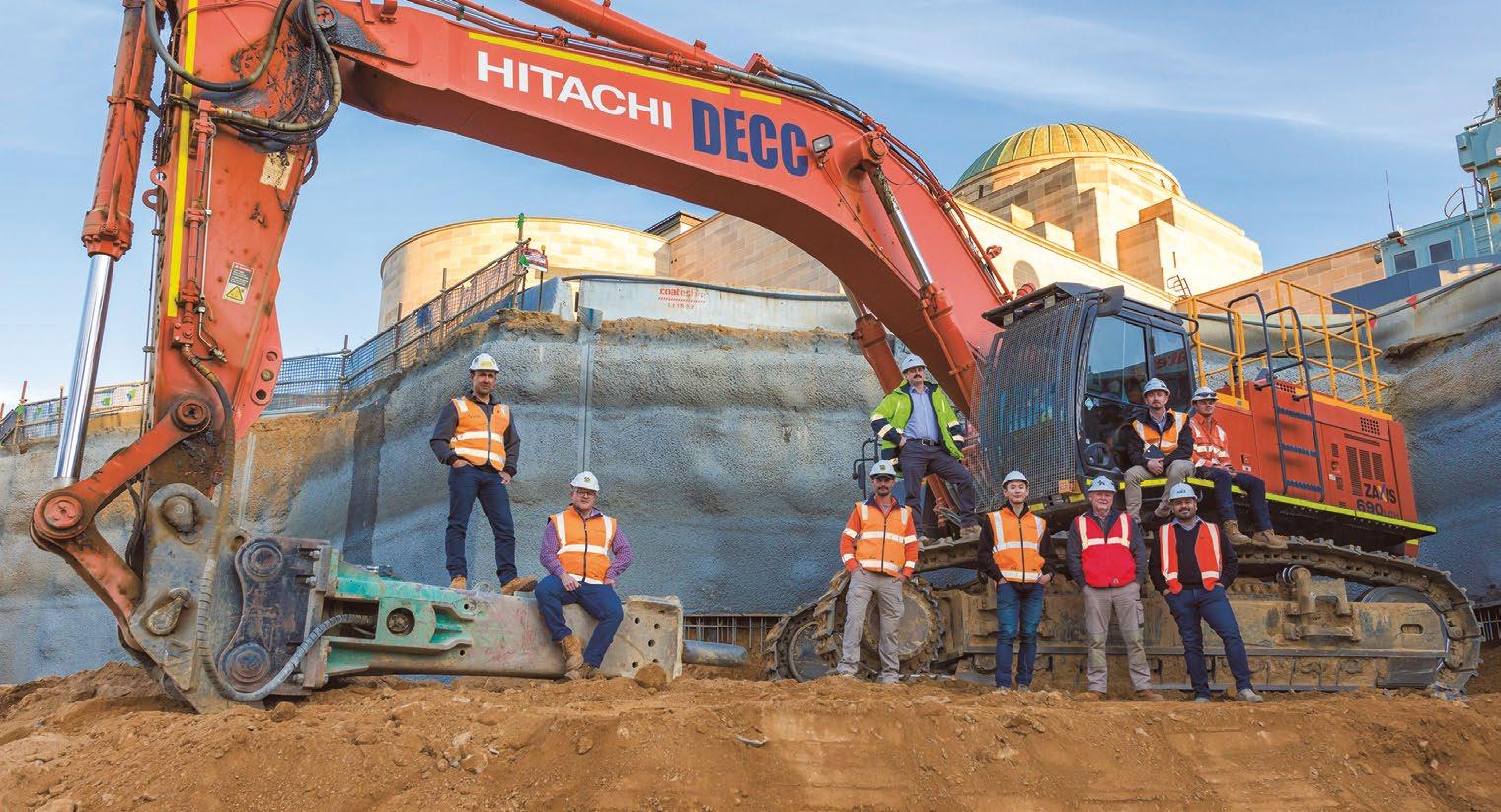
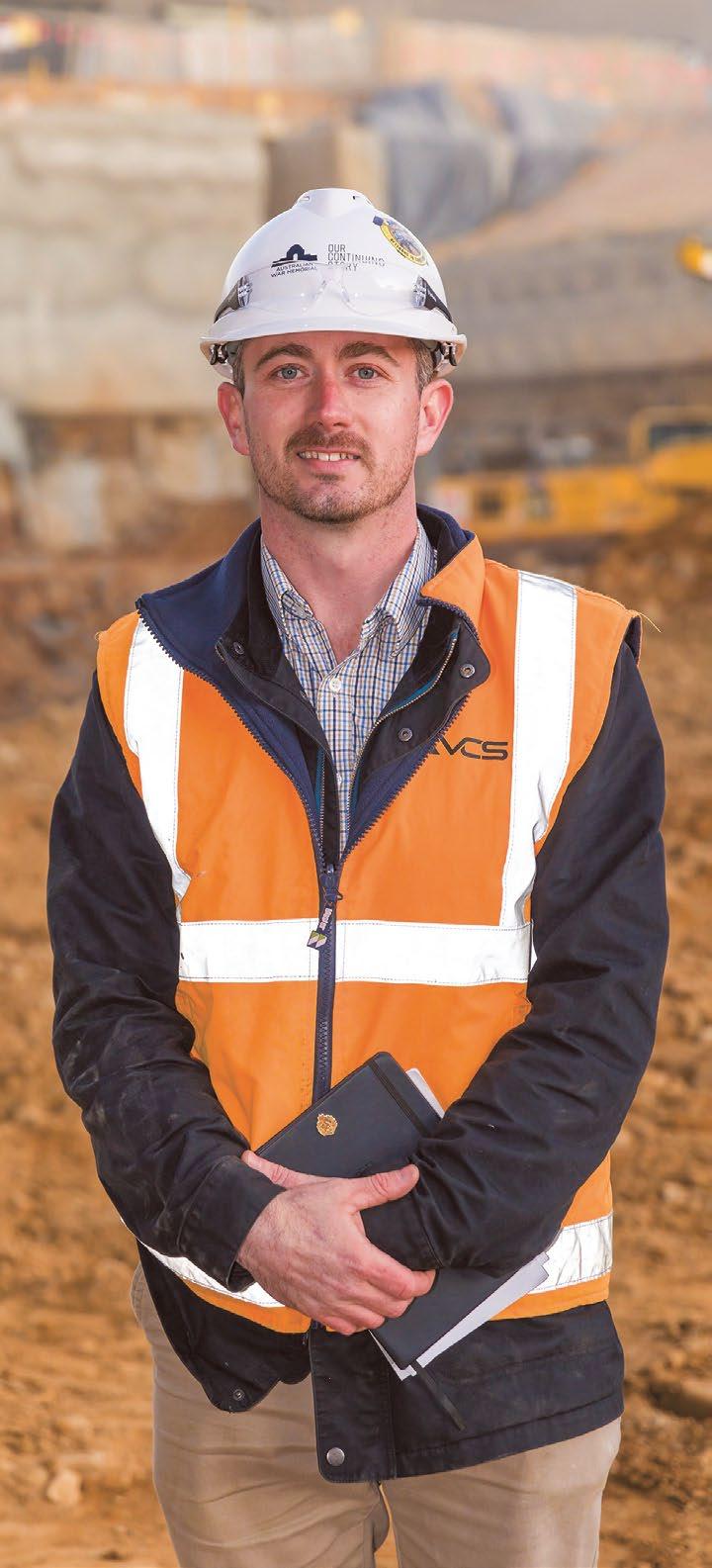
As the site co-ordinator for the construction of the Memorial’s new southern entrance, he is responsible for managing day-to-day activities on site.
Working closely with project manager Rebecca Conway, he co-ordinates everything from concrete trucks coming in and fences being moved, to ensuring construction teams can safely enter and exit the site, all while the Memorial remains open to visitors.
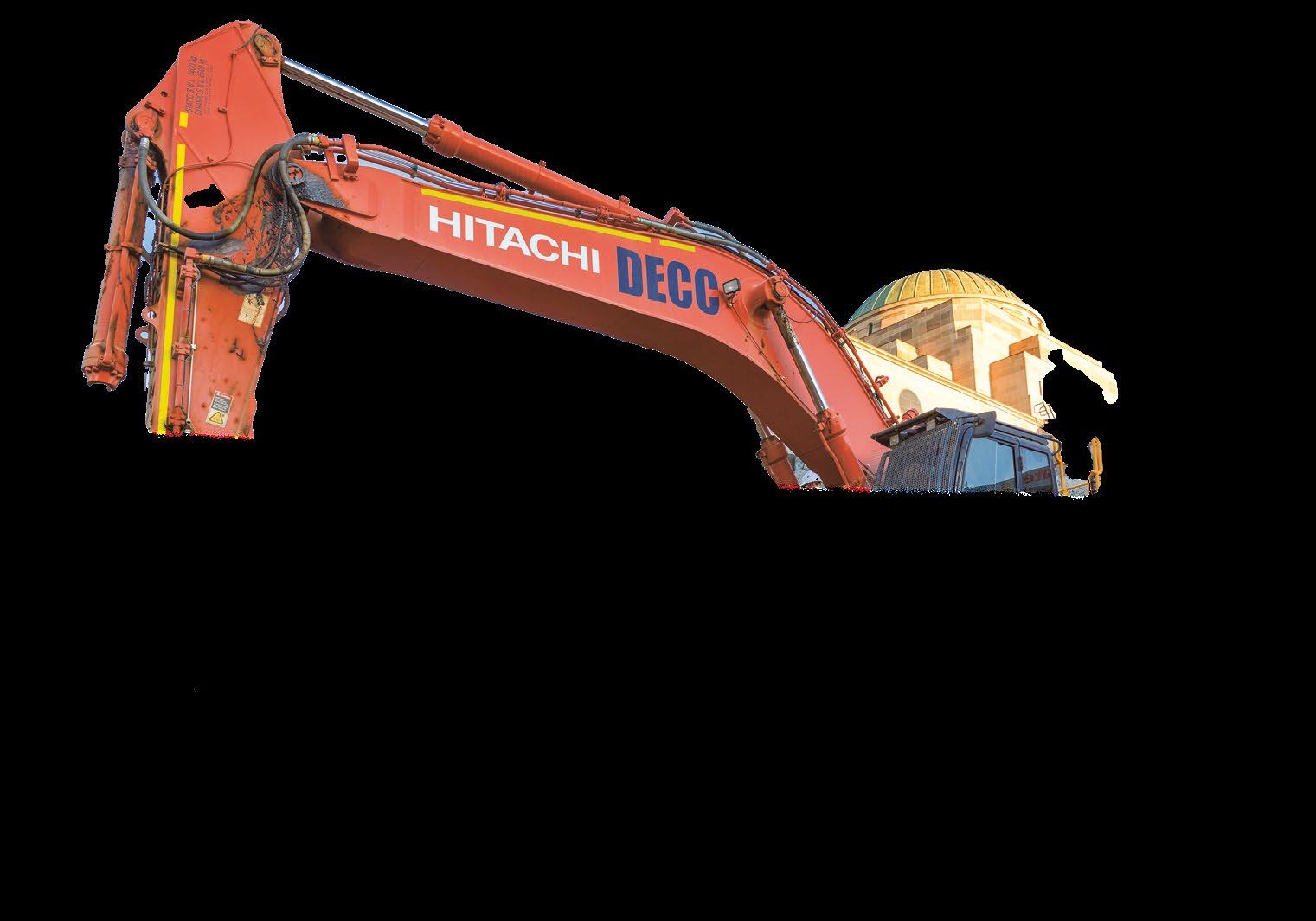
‘It’s really special,’ Liam says. ‘When this job came along, I was really excited to grab the opportunity, and I’m just extremely grateful … You’re doing something to physically create something, and it is very hands on.
‘It’s about seeing the big picture, integrating different teams [that are] delivering completely separate results, and making sure it all comes together to achieve the one outcome, while dealing with all the intricacies and all these different little components.
‘I’m still only young and I’m really just entering the industry … but I think it’s going be hard to top this in the future.’
Having grown up in Canberra, Liam joined the Army in March 2015 and served as a rifleman with the 1st Battalion, the Royal Australian Regiment, in Townsville. His great-great uncle had served in the 2/1st Australian Infantry Battalion during the Second World War, and a cousin had served in Iraq.
‘I joined straight out of school,’ Liam says. ‘It would have been about a week after my 19th birthday … When I was a kid, I went to a Dawn Service here [at the Memorial]. I just remember seeing it and thinking it was really special. I was just drawn to it straightaway and so I thought, “I want to do that. I want to contribute … to do something bigger than myself”. I loved everything about it, and I was just drawn to Army.’
After leaving the Army in 2019, Liam decided to pursue a career in the construction industry. He started working on the Memorial development through Veterans in Construction, a labour-hire company founded by veterans that helps veterans find work in the construction industry.
‘I think every veteran and ex-service person is drawn to this place because of what it stands for,’ Liam says. ‘It’s an iconic building that stands for everything that me, and all of my friends, stand for. [As a kid], I’d look at it and I’d always think, “This is a really special place, I’d love to be here one day and contribute in some way”.
‘I think it means a lot to everyone … to have a specific building that is dedicated to the memory of all those people [who have served and died].’
For Liam, it’s important that the Memorial has the space to be able to share the stories of more recent conflicts and peacekeeping operations.
‘A lot of people visiting have lived through some sort of war, so to have the opportunity to display items and share stories that reflect that will mean a great deal to a lot of people,’ he says. ‘It’s not just a job. It’ll be one of the highlights of my life.’
Australian War Memorial recognises Indigenous Vietnam veterans
New research from the Australian War Memorial has identified more than 250 Indigenous men and women who served during the Vietnam War.
Researchers say it is important to recognise their sacrifice and service now, especially as Indigenous people faced major barriers to joining the Australian Defence Force at the time.
‘Aboriginal men were exempt from conscription, which was one form of recruitment of the day,’ said Michael Bell, lead researcher and Indigenous Liaison Officer at the Memorial.
‘You’d be told that you’re not eligible because you’re Aboriginal. There are stories of people who got rejected, walked out the side door and they’d go back in the front door and volunteer to enlist.’
Director of the Memorial, Matt Anderson, said: ‘This research helps our understanding and knowledge of Indigenous service in Vietnam.
‘It is part of our ongoing program at the Memorial that deals with identifying and recognising the service and sacrifice of Aboriginal and Torres Strait Islander service people.’
Mr Bell’s research included 1971 recruitment advertising that list Aboriginals as ‘exempt’.
‘Aboriginality was seen as a reason not to serve, but many still did. This reflects the willingness of our men and women to serve,’ Mr Bell said.
‘It was a significant transition period for our people and their role in the defence forces. We now have a great opportunity to meet with many surviving veterans and to speak to them directly and have their stories recorded.’
‘We can ask veterans why they volunteered to enlist, we can gather
stories on the racial tensions at the time and the equality or inequality they may have experienced.’
The Memorial is continuing its work to identify and research the extent of the contribution and service of people of Aboriginal and Torres Strait Islander descent.
‘Gathering this list takes many hours of research and we expect to get to 500 names. We want more people to come forward and share their stories,’ Mr Bell said.
Visit the Indigenous hub of the AWM website (awm.gov.au/indigenous) for more information.
December 2022 Vetaffairs 23 FEATURES
Liam Barbic
Some of the veterans working on the redevelopment
Decorated veterans attend Queen’s funeral
Prior to her passing, Queen Elizabeth II made it clear she wanted recipients of the Victoria Cross and George Cross from across the Commonwealth to attend her funeral. It was her father King George VI who instituted the George Cross in 1940 and her great-great grandmother who instituted the Victoria Cross in 1856. Queen Elizabeth herself was the patron of the Victoria Cross and George Cross Association from 1956 until her death. So it was that Mark Donaldson VC, Daniel Keighran VC, Keith Payne VC AM, Michael Pratt GC and Ben Roberts-Smith VC MG flew to London to attend The Queen’s funeral in September.
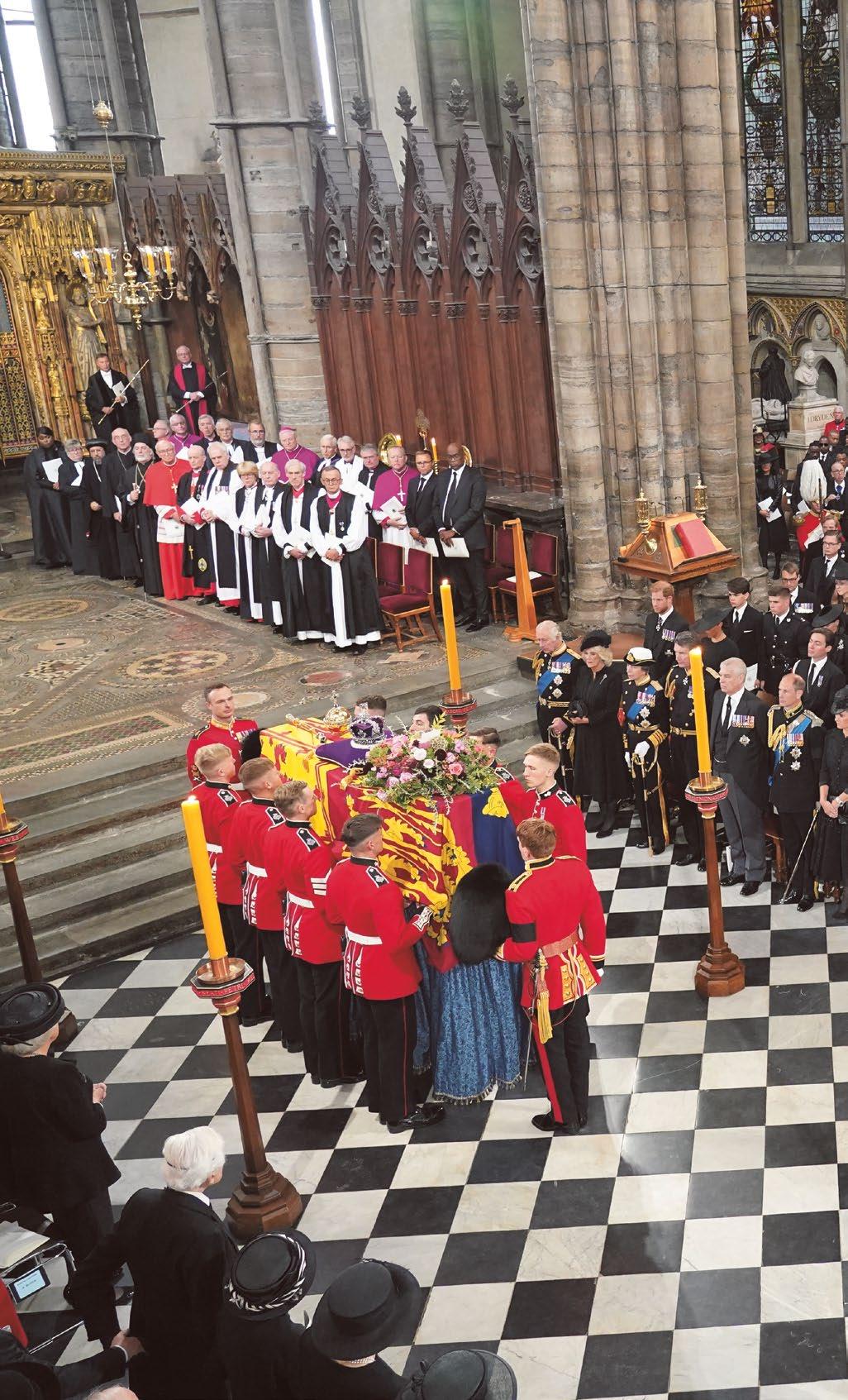
Mark Donaldson and Keith Payne had the additional privilege of taking part in the Procession of the Holders of The Victoria Cross, The George Cross and the Orders of Chivalry, which comprised representatives from various Commonwealth countries. Allan Sparkes CV OAM also took part in the procession, representing recipients of the Cross of Valour – Australia’s highest civilian award for bravery.
‘Taking part in the procession was a huge honour,’ says Mark. ‘I was exceptionally proud to be able to do that. And it was an honour to do it with all the recipients from across the globe. But I was representing all Australia’s VC recipients, alive and dead. And the 1,361 people who’ve received them across the Commonwealth. As well as the Australian Defence Force as a whole, whether they’ve received bravery medals or not. It’s about contribution, not just combat.’
Mark first met The Queen in 2009, shortly after he was awarded the Victoria Cross for Australia. The decoration was a recognition of his actions the previous year in Afghanistan, when he rescued a badly wounded Afghan interpreter under intense fire from the Taliban.
The Queen received him at Windsor Castle and the two met on many occasions after that.
Mark was struck by how there were two sides to her: the regal, public-facing Elizabeth, and the much more everyday human being he encountered.
‘She was an absolutely amazing woman,’ he says. ‘She was devoted to service and had a dedication to humanity. She was genuinely lovely, kind, compassionate and even very humble. She had this very human quality and always knew what to say and how to put you at your ease. She’d obviously had decades of practice but I think it was her natural ability as well.’
Mark relates in his memoir The Crossroad that The Queen said to him at Windsor Castle: ‘I remember signing off on [your VC] on Christmas Eve. I read through [the citation] twice with all the family around. I was so amazed.’
‘If you look at the number of people who were at the funeral, and the particular people who were there, plus the four billion people who tuned in, that speaks volumes,’ says Mark. ‘There was a collective sadness around the world that was to do with how she made people feel, how she did things. She touched so many hearts.’
Mark found that catching up with other recipients of the Victoria Cross and George Cross provided a lighter moment during his trip to the UK. They all stayed at the Union Jack Club, which Mark describes as a kind of spiritual home to VC and GC recipients.


‘You’re in safe company, so to speak,’ he says. ‘You’re on common ground. All of us understand what it’s like to carry the burden of such an award.’
One of these was Keith Payne, whose trip to London was supported by DVA. Keith earned his VC as a company commander in Vietnam when he rescued around 40 of his men who had been cut off by the enemy. Many of them had been wounded.
Keith had also met The Queen on many occasions, the first time in 1970 when he became the last Australian to be awarded the Imperial Victoria Cross. The ceremony took place on the Royal Yacht Britannia when it was docked at Brisbane. They met around 25 times after that and The Queen described Keith as an ‘old friend’.
‘I was deeply saddened at the loss of The Queen who during her reign has covered and endured many worldly problems with grace and dignity,’ says Keith.
‘People would find it hard to believe that our friendship was compounded over the many years we knew each other. We had a long friendship of over fifty years. That was time to really know each other. Her Majesty gave me and my family the respect equal to what I had shown to her … She was a gracious and caring young lady when I first met her and remained the same through her life.’
At 89, Keith was determined to make the trip to London.
‘I wanted to honour Her Majesty’s request that the VC and GC recipients attend her funeral. It meant a lot to us. The feeling of sorrow and grief was amongst all members of the VC and GC Association, primarily as Her Majesty was our Patron over those many years and always welcomed us to the Palace and other places where she chose to hold reunions.’
24 Vetaffairs December 2022 FEATURES
The 17 members of the VC and GC Association from across the Commonwealth who attended The Queen’s funeral. The Australians are: Ben Roberts-Smith VC MG (far left); Michael Pratt, Australia’s last living GC (fourth from left); Keith Payne, Australia’s oldest living VC AM (centre); Mark Donaldson VC (in blue suit); and Daniel Keighran VC (fourth from right). © VC and GC Association.
The Queen’s funeral in Westminster Abbey
BOOKSHELF
The following books have been written, and often self-published, by veterans who have contacted
them to readers’ attention. If you have a book for a subsequent edition, please email vetaffairs@dva.gov.au, noting that we may not have room to include it in the hard copy, but will include all online. Please provide the following: title, name of author, blurb (short description
to edit), publisher (if any), price, how to buy it, and image of front cover. Please note that the following are not reviews or
their content or the opinions expressed in them.
Townsville in War and Peace 1942–1946
Edited by Geoff Hansen and Diane Menghetti
This edition contains three new essays including one on Townsville’s most decorated Second World War soldier Bill MacIntosh MC MM. Having committed his post-military career to assist service men and women with the challenge of dealing with life after service, the author was particularly moved by Bill’s story. Civilians and military alike will find it captivating, not to mention enlightening.
• Pages: 241
• Cost: $40 plus postage. There is also a bulk discount.
• To buy: admin@townsvillemuseum.com.au or www.townsvillemuseum.com.au
Written in the Sky
By Mark Carr
Since childhood, Mark Carr wanted to fly, and fly he did … firstly as a naval aviator, a jet instructor and then pilot for Cathay Pacific Airways. This ‘techno-biography’ is written for those who, like him, seemingly have hydraulic oil flowing through their veins. However, the book also gives readers of a non-flying background an insight into military and civil aviation.
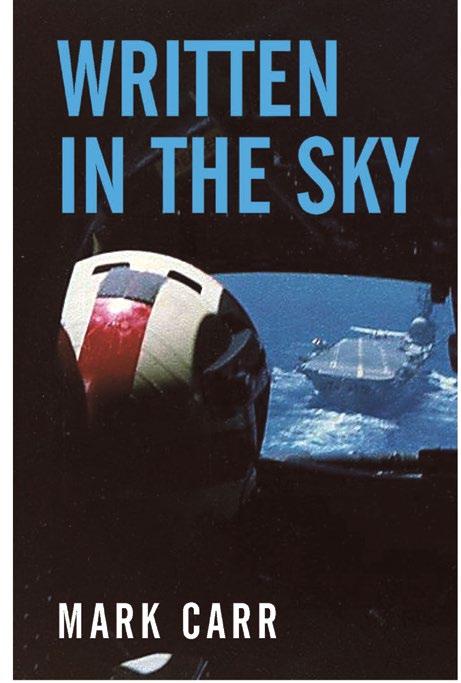
• Pages: 504
• Cost: $39.95
• To buy: available at Melbourne Books, other bookstores and online retailers
’A’ Field Battery, Royal Regiment of Australian Artillery – The Journey to Phuoc Tuy and Long Khanh
 By David F Gibson PSM
By David F Gibson PSM
This book tells the story of an Australian Artillery battery based in Townsville in 1970 preparing for service in South Vietnam and of its tour of duty in Vietnam in 1971. David Gibson was a national serviceman posted to 12 Field Regiment’s ‘A’ Field Battery in March 1970 as a gun number. He tells the story of the battery's operational service in Vietnam, including in the Battle of Long Khanh.
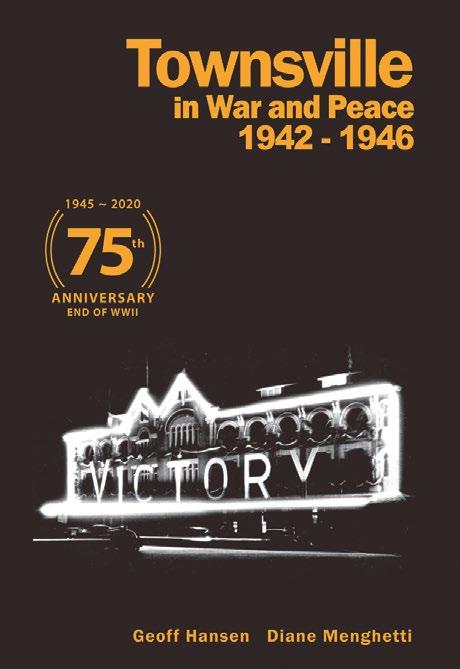
• Pages: 509, with more than 400 photographs
• Cost: $39.95 plus postage of $10 for normal mail and $20 for express post
• To buy: contact David via David.rita1@bigpond. com or 0425 753 533
Cold War Warriors – Royal Australian Air Force P-3 Orion Operations 1968–1991
By Ian Pearson
Cold War Warriors tells the little-known story of operations by the RAAF’s P-3 Orions during the latter years of the Cold War. The aircraft’s missions, usually flown far from their base, were often shrouded by confidentiality. Now, access to declassified documents has allowed this story to be told.
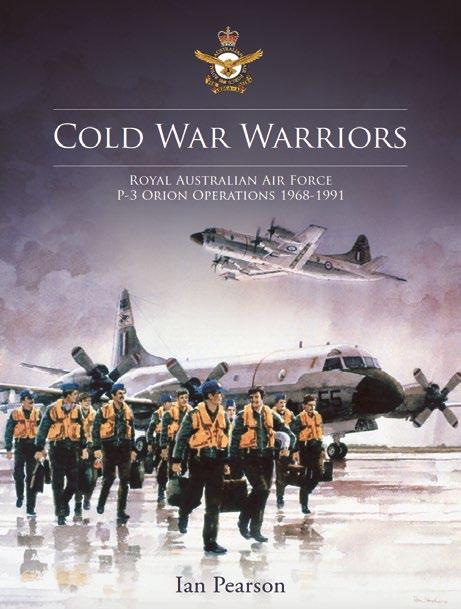
• Pages: 436
• Cost: from $30.95
• To buy: booktopia.com.au, bookdepository.com, (free international postage) all good bookstores
we
The Life and Times of WG CDR Kenneth J Mitchell
 By Kenneth J Mitchell
By Kenneth J Mitchell
This is a story of a young boy who dreamed of becoming an RAAF pilot. His dream became a reality when he served in 10 Sqn, flying Lincoln, Neptune and Dakota aircraft. Ken was then posted to RAAF Williamtown and served as a fighter pilot, flying Vampire, Sabre and Mirage aircraft. He completed a tour in Vietnam as a Forward Air Controller. After serving in various staff positions in Canberra, Ken resigned from the RAAF and joined Customs. He then went into business.
• Pages: 162
• Cost: $32.94
• To buy: Amazon, Booktopia and all good book stores
Service in the Sultanate of Oman – to Dhofar and Back
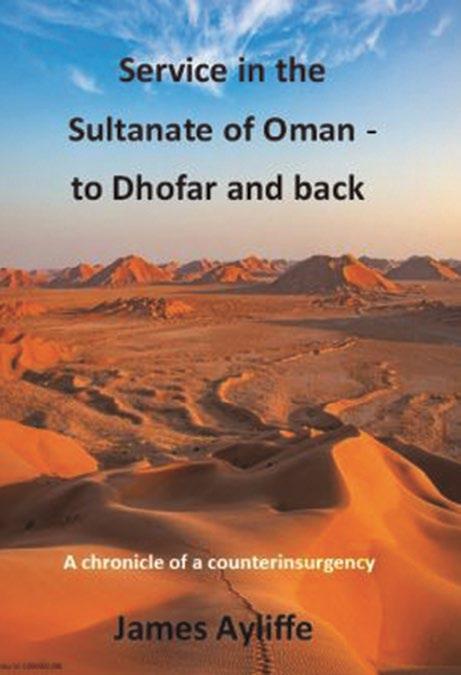 By James Ayliffe
By James Ayliffe
Every expat member of the Sultan’s Armed Forces had their own reason for being in Dhofar. For seconded British officers, service in Oman was a rite of passage leading to higher promotion on return. For contract officers, it was adventure or redemption, or both. Being in Dhofar was a risky but rewarding business, and for the most part, those who served made a positive difference.
• Pages: 160
• Cost: $39.99 plus postage
• To buy: email james.ayliffe89@gmail.com – 10% discount to former members of 1 Commando Company (RNSWR)
Major Management – A soldier’s journey from the military to the corporate boardroom
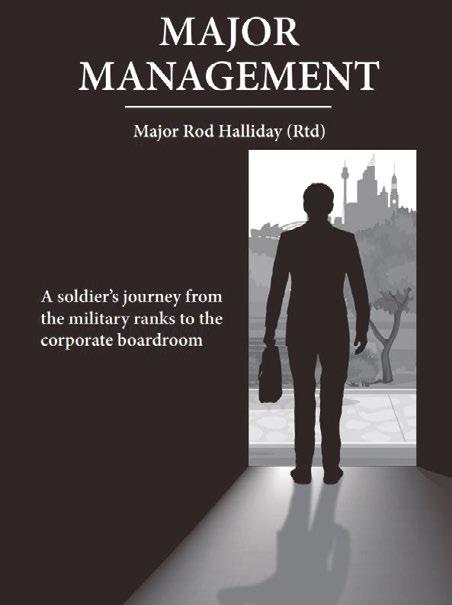 By Major Rod Halliday (Rtd)
By Major Rod Halliday (Rtd)
Rod’s life has been a series of major transitions and achievements. His first transition was from civilian life to army life. The second was promotions through the army ranks and multiple postings including operational deployment in Vietnam. The last transition was returning to civilian life. Major Management offers an insight into the methodology he used to improve the businesses he managed in his 35-year corporate career.
• Pages: 239
• Cost: $35
• To buy: email hms@hallidaymanagement.com.au
Madness and the Military – Australia’s Experience of Shell Shock in the Great War
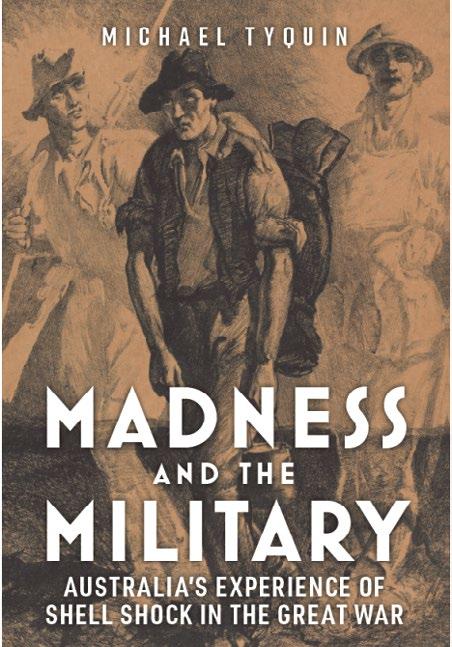 By Michael Tyquin
By Michael Tyquin
This edition is the first of its kind to be published in Australia and is an analysis of what happened to soldiers who suffered psychologically in the First World War. It compellingly revisits this long-ignored aspect of Australian military history and suggests a link with so-called shell shock and moral injury.
• Pages: 280
• Cost: $46.38
• To buy: available from most bookstores and chains
December 2022 Vetaffairs 25
Vetaffairs asking that we bring
that
reserve the right
promotions of the books. DVA takes no responsibility for the accuracy of
COMMEMORATIONS
Remembrance Day 2022
On Remembrance Day, Australians everywhere paused at 11am in silent reflection to honour the more than 103,000 service men and women who have given their lives in service to our country.
At the 11th hour of the 11th day of the 11th month, we remember all those who have given their lives or suffered in wars, conflicts and peacekeeping operations.
We pay tribute to their service and acknowledge their sacrifice, as well as the sacrifice of families.
Originally known as Armistice Day, this significant anniversary commemorates the day in 1918 when the guns fell silent on the Western Front bringing an end to fighting in the First World War.
After the Second World War, 11 November became known as Remembrance Day, to commemorate those who were killed in both world wars.
Today, Remembrance Day honours all those who have lost their lives or suffered in wars,
conflicts and peacekeeping operations around the world.
This Remembrance Day we invited you to wear a red poppy to show your support. It is one way we ensure the service men and women who have made the ultimate sacrifice for our country, and the many others who have suffered over more than 100 years of war and conflict, will never be forgotten.
Lest we forget.
Resources for Remembrance Day 2022
DVA sent more than 17,000 ex-service organisations, schools and community groups the 2022 Remembrance Day resources, helping Australians commemorate and learn more about our military history.
On 11 November, we again paused and reflected on the service and sacrifice of Australian men and women who have given their lives or suffered in service to our nation.
Every year, the Australian Government provides resources to help all Australians learn more about the service of our Defence personnel and commemorate this solemn occasion.
This year’s pack included a range of resources, with many focusing on peacekeeping, including:
2023 commemorative service for Vietnam veterans
A national commemorative service will take place in Canberra in 2023, recognising the 50th anniversary of the end of Australia’s involvement in the Vietnam War.
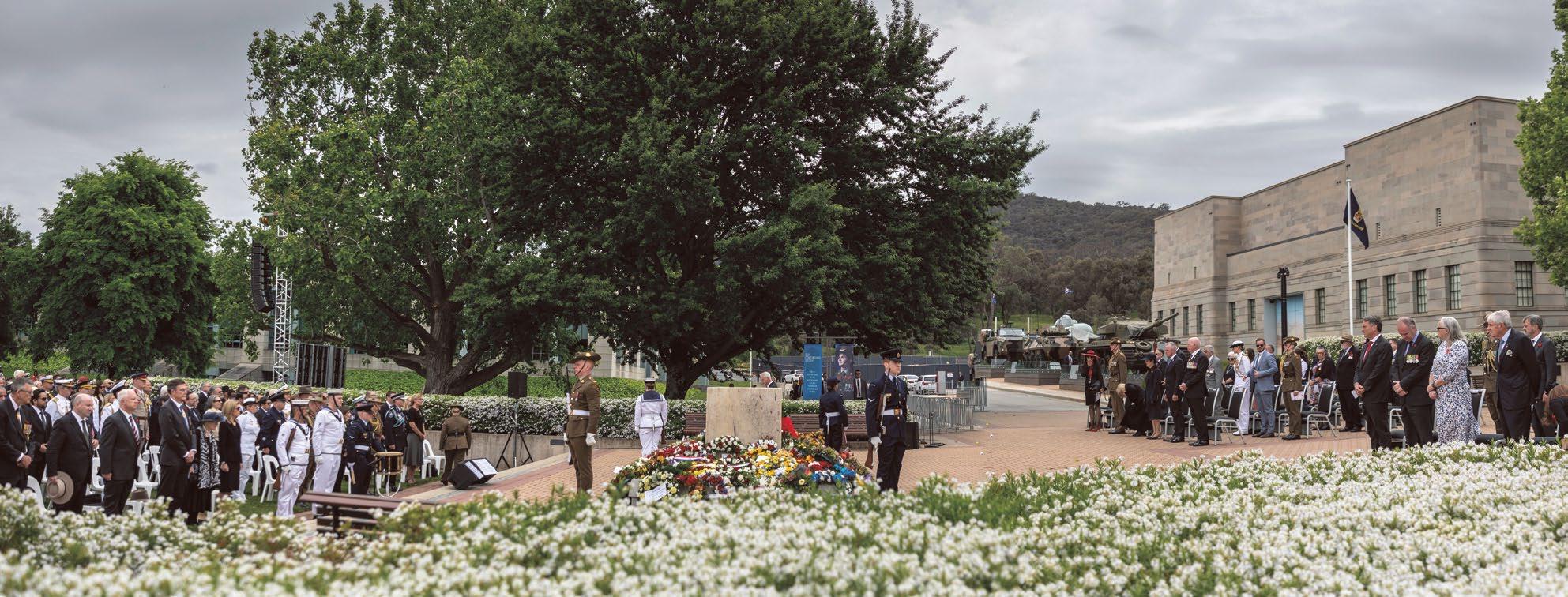
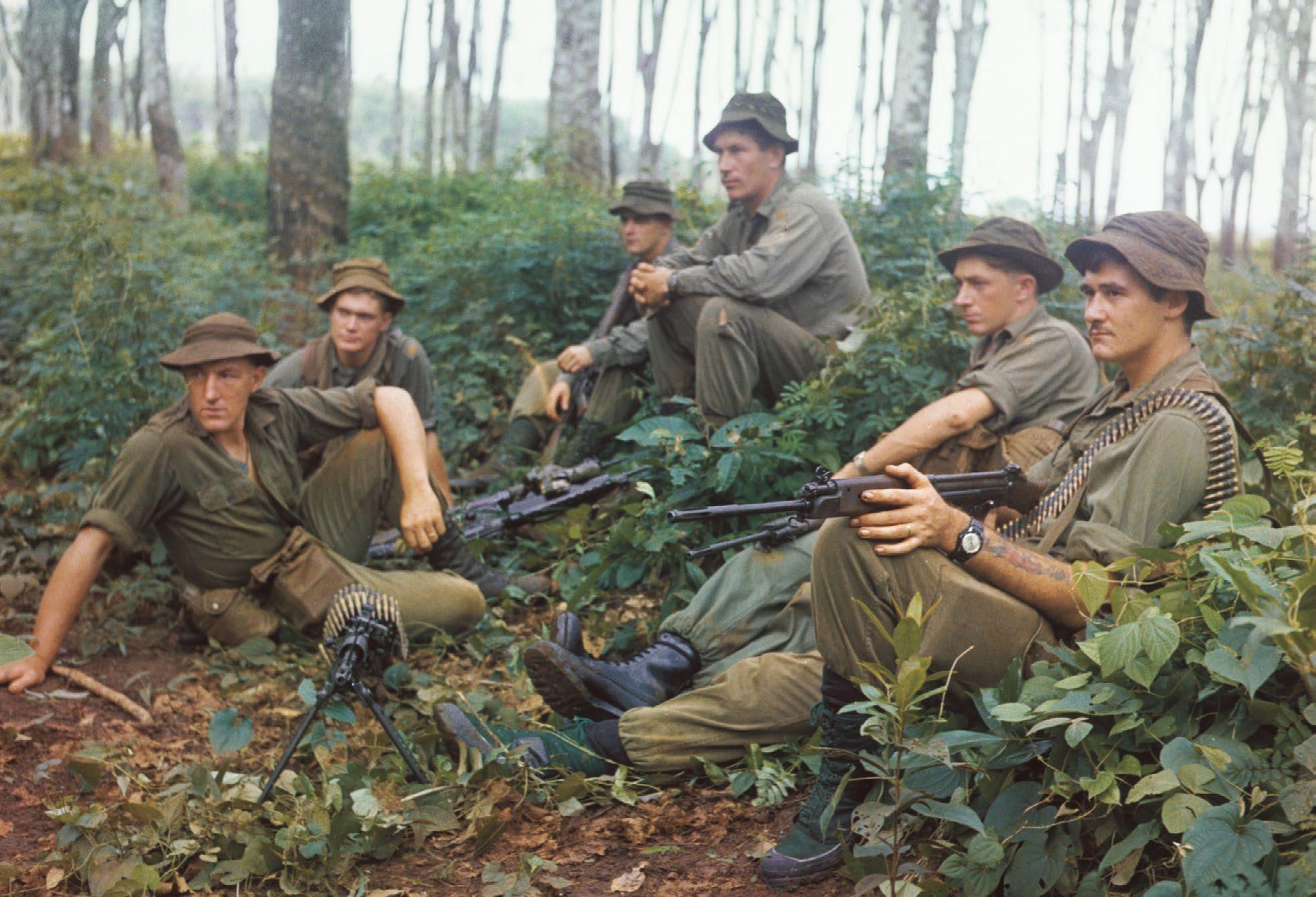
The service will take place on Vietnam Veterans’ Day – 18 August – at the Australian Vietnam Forces National Memorial on Anzac Parade in Canberra, and will be broadcast nationally by the ABC.
Some 60,000 Australians served in Vietnam, which was the longest conflict Australia was involved in during the 20th Century. More than 3,000 Australians were wounded and 523 lost their lives during the Vietnam War.
For more information, visit the commemorative services pages of the DVA website (dva.gov. au/recognition)
• three commemorative posters – one for Remembrance Day, one to mark the 75th anniversary this year of Australia’s involvement with international peacekeeping operations, and the Legacy Centenary poster
• a digibook called Peacekeeping and the United Nations , two activities focusing on commemoration through art, and three new videos featuring Australian peacekeepers with accompanying online lessons
• Independence – a book that explores stories of Australians who served in the Navy, focusing
on the determination, resilience and commitment of Navy life
• Generations of Service: The LovettFamily Digibook, which chronicles several generations of a First Nations family who served in the armed forces for over a century.
This material is of interest at any time of the year. You can download all these creative resources and more from our Anzac Portal: anzacportal. dva.gov.au/rd-resource-pack.
26 Vetaffairs December 2022
The 2022 Remembrance Day service held at the Australian War Memorial in Canberra. Courtesy: Department of Defence.
Pride in peacekeepers shines in Anzac Day Schools’ Awards
Schools around the nation have been recognised for their creative projects honouring Australian peacekeepers as part of the Anzac Day Schools’ Awards.
The national competition is an exciting opportunity for students to engage with veterans and learn more about Australia’s wartime history. This year’s theme was chosen to complement the 75th anniversary of Australia’s involvement in international peacekeeping operations.
St Joseph’s College in Lochinvar, New South Wales, took out the national prize with an impressive commemorative program that included a range of schoolwide activities and learning
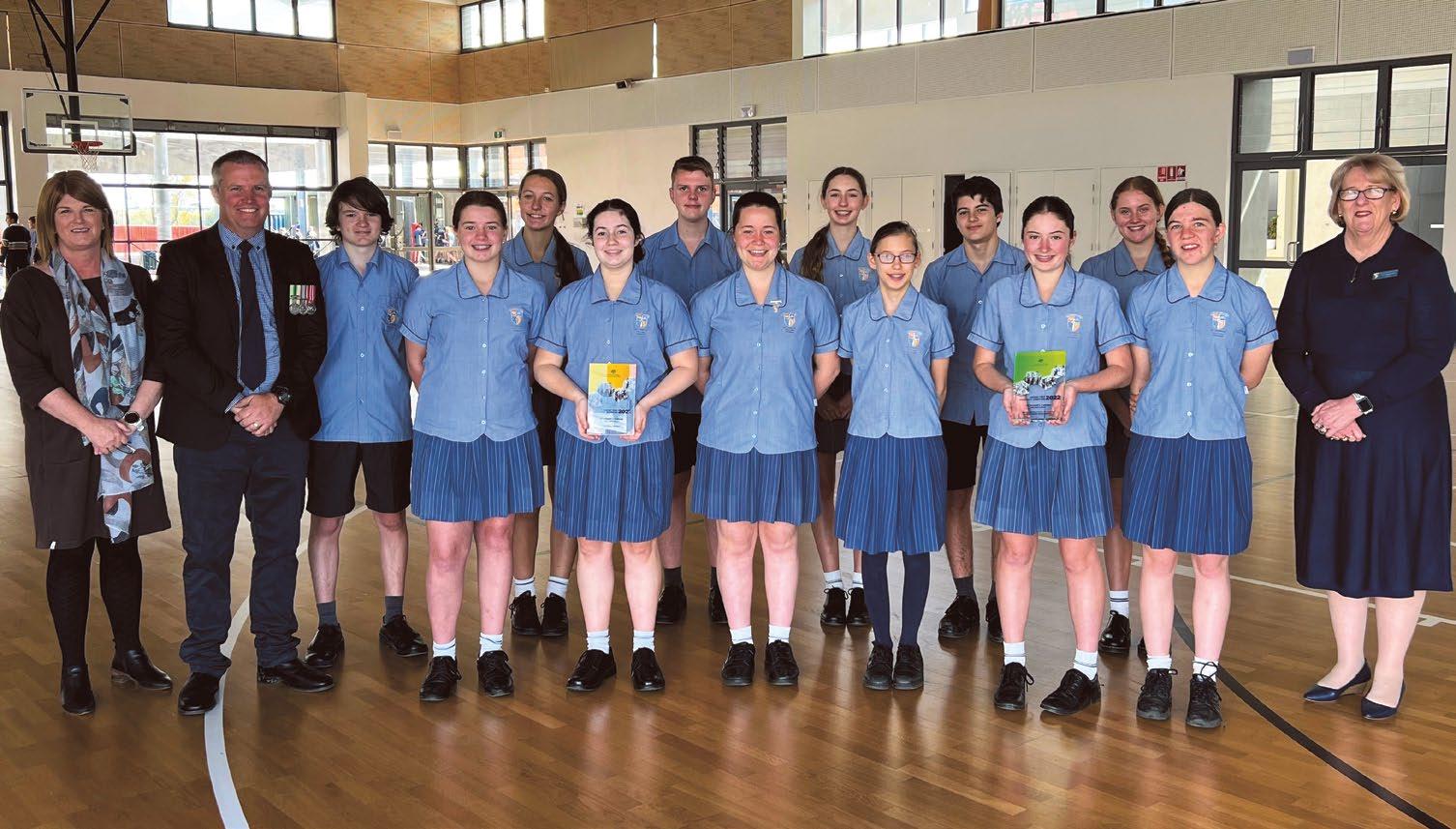
opportunities to develop students’ understanding of peacekeeping.
Announcing the awards, Minister for Veterans’ Affairs Matt Keogh said the students in the winning schools took the theme to heart by engaging with former and current peacekeepers in a variety of ways, and genuinely reflected on the courage and sacrifice involved with the unique nature of peacekeeping service.
‘I’d like to congratulate the winning schools, but also all schools that took part – their commitment to acknowledging service is commendable,’ he said. ‘I also want to thank the teachers who worked with students and coordinated the entries for their schools – you have done a great job.’
For more on the winning schools, and the Anzac Day Schools’ Awards, visit the Anzac Portal (anzacportal.dva.gov.au). Entries for 2023 Awards are now open.
For the full version of this article, see the digital version of this edition of Vetaffairs (dva.gov.au/vetaffairs).
New initiatives ensure legacy of Kokoda
On 3 November, the 80 th anniversary of our troops raising the Australian flag at Kokoda village in the Second World War, we paused to honour and remember their service and sacrifice, and the support of the local Papua New Guinean people.
significance to local veterans, their families and descendants. The funding will contribute to its ongoing operations and maintenance costs, including staffing, gardening, repairs and general maintenance.
To find out more about the walkway, visit kokodawalkway.com.au.
Refurbishment of Surrender Point Memorial
DVA builds and maintains official Australian overseas memorials commemorating the service and sacrifice of Australia’s service men and women at sites of significance. These memorials are located in a number of countries, often in remote locations with limited access.
Surrender Point in Malaysia is one such memorial. The site on Labuan Island marks the spot where, on 10 September 1945, Lieutenant-General Masao Baba, Commander of the 37th Japanese Army surrendered to Major-General George F Wootten of the 9th Australian Division. This led to the end of the Second World War in the Pacific.
Constructed almost 20 years ago, the memorial is in need of major refurbishment to bring it in line with the quality and standard of Australia’s other official overseas memorials.
Following approval of a new memorial design by the local council and landowner in April 2022, DVA travelled to Labuan to meet with key stakeholders and contractors.

Demolition works have now begun and DVA is looking forward to officially dedicating the new memorial in the first half of 2023.
To find out more about DVA’s overseas memorials, visit the memorials page of the DVA website (dva.gov.au).
The four-month battle along the Kokoda Track in 1942 turned back the Japanese land advance on Port Moresby, helping to turn the tide of the war in the Southwest Pacific. The fighting along the Track was some of the most desperate and vicious encountered by Australian troops in the Second World War, with more than 600 Australians killed and 1,600 wounded. Casualties due to sickness exceeded 4,000.
The legacy of Kokoda is one of endurance and comradeship in the face of gruelling conditions.
To help future generations of Australians to continue the tradition of honouring and remembering those who served at Kokoda, the Australian Government committed an additional $409,000 in the October Budget to the Kokoda Track Memorial Walkway in Sydney.
The walkway is an important memorial that will ensure the enduring sacrifice of our troops will be remembered, and provides an accessible interpretive experience for those not able to travel to Papua New Guinea.
With an estimated 5,500 Australian Second World War veterans still living, the walkway is of great
New website to explore wartime PNG On the 80 th anniversary of the Kokoda Track campaign, in memory of those who served, DVA has launched a new website – the Papua New Guinea Virtual Remembrance Trail – an important resource that helps people learn more about the Papua New Guinean Campaign from the comfort of their own homes.
The new resource uses a ‘journey-like’ approach of step-by-step discovery to tell the story of the Second World War in PNG. The seven trails on the website follow the course of the war in PNG, and are rich with written and audiovisual content, including pins on the map to track every step.
The steps of the trails follow the course of the war through PNG chronologically, geographically and thematically. They combine written, audio-visual and geospatial content to provide a multi-layered journey of exploration. There are also background sections on PNG wartime themes and guidance for teachers on how the resources fit into the Australian Curriculum.
The website is available at pngremembrancetrail.gov.au.
December 2022 Vetaffairs 27
COMMEMORATIONS
St Joseph’s College Year 9 students with (from left) teacher Vikki Jordan, veteran peacekeeper and teacher Simon Ramage and Principal Patricia Hales
DVA officials with key project stakeholders
COMMEMORATIONS
Honouring those who served in the cause of peace
On 14 September, hundreds of peacekeeping veterans and families, dignitaries and current-serving members of the Australian Defence Force and the Australian Federal Police gathered to honour the service of our Australian peacekeepers over three quarters of a century.
was honoured to present the Veteran Reading at the service.
‘To have been a peacekeeper is something in which to take great pride,’ Ms Cosson said.
A national commemorative service took place in Canberra in September, marking the 75th anniversary of Australia’s involvement in international peacekeeping.
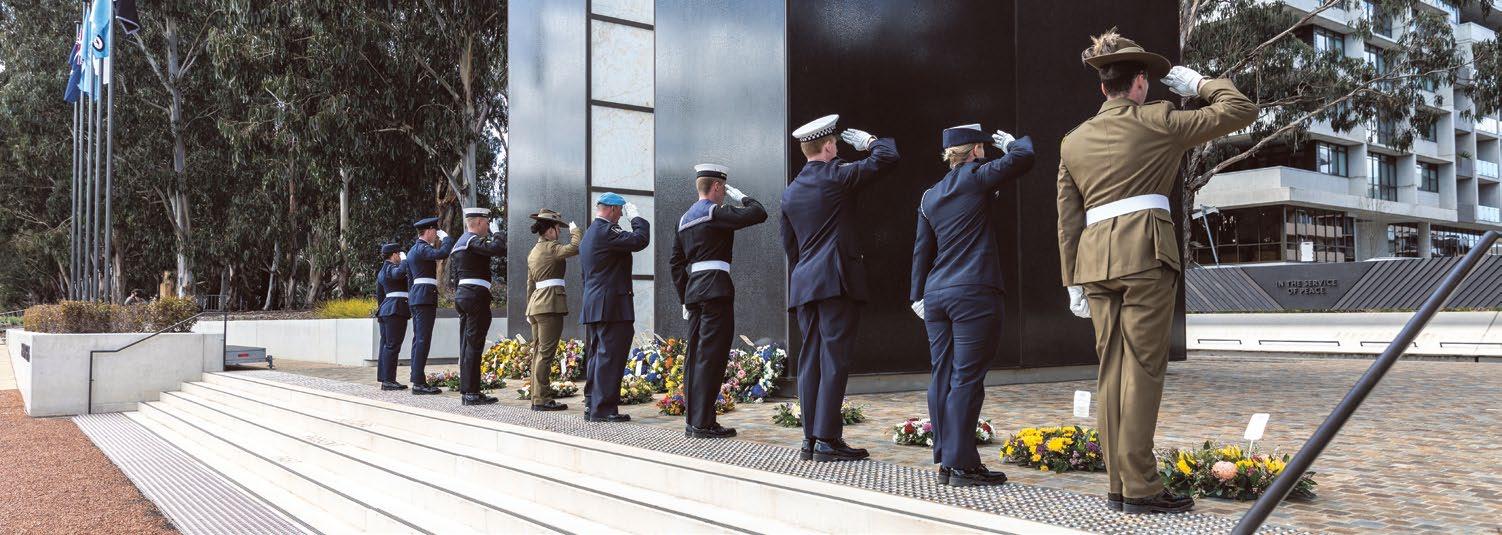
Australians were an important part of the first peacekeeping mission in 1947, deploying as United Nations military observers to the Netherlands East Indies (now
Indonesia). Since that time, Australian peacekeepers have served in locations around the world, from the Middle East to Africa, Southeast Asia, the Pacific and many others.
More than 66,000 Australian men and women have served in more than 60 international peacekeeping operations since 1947. Tragically, 16 have lost their lives.
Protecting the word ‘Anzac’
Many people would agree that there is no word more sacred to Australians (and New Zealanders) than ‘Anzac’. No word comes closer to succinctly defining how many of us see ourselves and our past.
It might come as a surprise that not only does legislation exist to protect the word but that the Regulations were passed in 1921, only a few short years after the word was coined.
The Regulations stipulate that broadly speaking, if you want to use the word ‘Anzac’ in an official or corporate manner and in particular to sell anything, you must get permission. Technically, the person whose permission you need is the Minister for Veterans’ Affairs but in practical terms that permission is delegated to staff within DVA. And the staff member whose responsibility it is to field enquiries and process requests for permission is Jen.
Jen receives hundreds of enquiries a year of which only about 80 become formal applications.
‘We have comprehensive guidelines on the website which will almost certainly clear up any confusion. They’re an excellent source of information about what is allowed, and when you need to apply for approval and when you don’t. If you have any further questions, you can email us on usewordanzac@ dva.gov.au
‘Among the criteria we use when determining whether to recommend the delegate give permission for a product to be sold using the word “Anzac” is whether it’s purely for commercial purposes or whether
it’s charitable, and whether there is a relation with the Australian Defence Force or veterans’ organisations or a commemorative event. However, Anzac biscuits is one of the rare categories where we would almost certainly recommend approving the word’s use, as long as they are traditional in style and ingredients.’
‘There are plenty of instances where you don’t need permission, as the Guidelines spell out. For instance, we get people applying to use “Anzac” for the name of their child. They don’t need permission for that.
‘Our busiest time is the first quarter of the year, in the lead-up to Anzac Day. That’s when we get most of our enquiries but also most of our complaints. A lot of people think Anzac is being misused when it’s not legally, though the use of the word might not meet community expectations.’
For instance, it’s okay for a sporting organisation to advertise that it’s holding an event on Anzac Day, if the phrase ‘Anzac Day’ is in the name – this is because this is the official name of a day, like Christmas Day. But it’s not okay to incorporate ‘Anzac’ only in the title of the event without permission.
‘People also complain about biscuits, especially around the ingredients used. We’ve adjusted our guidelines to allow for bakeries and so on to change the ingredients
The Minister for Veterans’ Affairs Matt Keogh gave the Commemorative Address, remarking on the important role Australian forces, police and civilians have played over the decades.
‘For three quarters of a century, Australians have served around the world in the cause of peace. Their contribution to the international community has been significant, and in the case of some operations, enduring,’ Minister Keogh said.
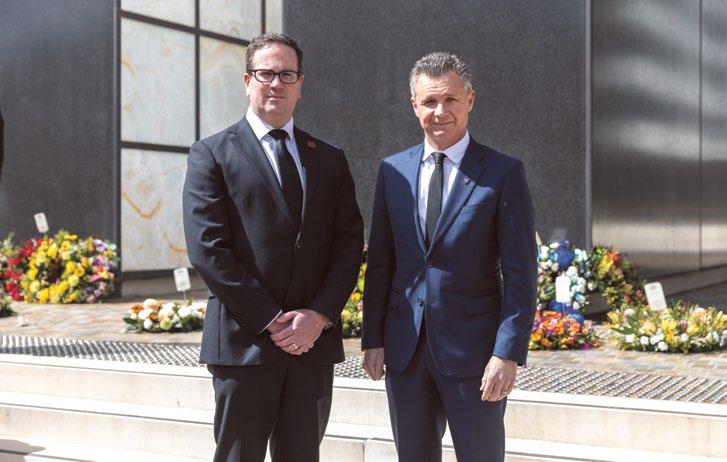
As a peacekeeping veteran herself, DVA Secretary Liz Cosson AM CSC
The service took place at the Australian Peacekeeping Memorial on Anzac Parade in Canberra and was broadcast live on the ABC. The service is available to watch via the ABC’s iView streaming service.
to meet various dietary requirements. So we don’t prescribe what has to be in Anzac biscuits though we do sometimes refer people to a traditional recipe on the Anzac Portal (anzacportal.dva.gov.au). We also look at Anzac biscuit packaging to make sure that images aren’t used inappropriately.
‘But we still insist that Anzac biscuits are round, and that they are referred to as biscuits, not cookies and that they don’t deviate too much from the traditional recipe. Anzac slice is permissible but not such things as Anzac donuts or burgers.’
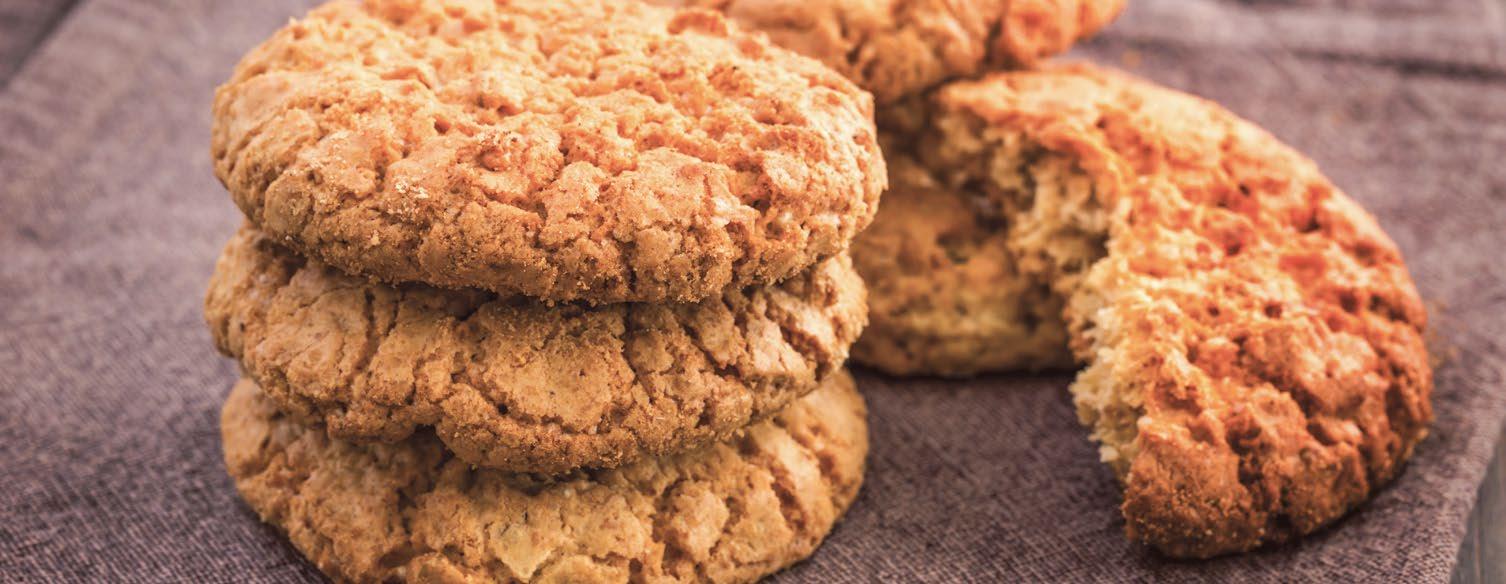
All complaints are looked in to. ‘Most businesses or individuals who might have accidentally misused the word can see why we’re doing this and will come round on their own,’ says Jen. ‘It’s an educative process and most people accept it and are sorry. The penalties are pretty steep – up to more than $66,000 for a breach.
‘Ultimately though, people usually understand that the word needs to be protected to prevent overuse and commercialisation of a word
that is very special to the Australian community.’
For further information, or to apply to use the word ‘Anzac’, visit the Protecting the word ‘Anzac’ page of the DVA website (dva.gov.au/ word-anzac) where you can find the Guidelines.
Tickets now available for Anzac Day services in France and Türkiye
Australians planning to make the trip to France or Türkiye for Anzac Day services can now register for their attendance pass. Anyone planning to attend the Dawn Services at Villers-Bretonneux or on the Gallipoli Peninsula must have an attendance pass.
Passes are free and available online at commemorations. teg.com.au
The Anzac Day services are run by DVA in close consultation with the host countries.
28 Vetaffairs December 2022
Members of Australia’s Federation Guard lay wreaths
Minister for Veterans’ Affairs Matt Keogh and Assistant Minister for Veterans’ Affairs Matt Thistlethwaite
COMMEMORATIONS
Defending with Pride exhibition
A new exhibition at Melbourne’s Shrine of Remembrance opened in August, supported by the Australian Government’s Saluting Their Service Commemorative Grants program.
The first of its kind for an Australian war memorial, Defending with Pride: Stories of LGBTQ+ Service showcases the history of lesbian, gay, bisexual, transgender and queer (LGBTQ+) people in military service.
Lesbian, gay, bisexual, transgender and queer people have been proudly defending Australia through their military service since the formation of the armed forces. Today, anyone identifying as LGBTQ+ can serve openly in the Australian Defence Force (ADF). But it has been a long and difficult
journey for LGBTQ+ people to be recognised, accepted, and celebrated for their service.
Assistant Minister for Veterans’ Affairs and Defence, Matt Thistlethwaite, said he was honoured to attend the launch of the exhibition.
‘All Australians who serve in our defence forces should be honoured for their service to our country,’ he said. ‘The stories of service from across our great country are as unique as the individuals who share them, and each one deserves to be told.’
A special Last Post ceremony took place after the launch. Curator Kate Spinks said the ceremony was especially moving because of the presence of RAAF veteran Phil Neil who on Anzac Day in 1982, was one of five members of the newly
formed Gay Ex-Services Association who were prevented from laying a wreath to honour their ‘fallen gay and lesbian brothers and sisters’ at the Shrine. Phil is the last survivor of the group and had not been back to the Shrine in the intervening 40 years.
The exhibition includes objects from the Australian Queer Archives. Kate believes its centrepiece to be video interviews she conducted of four serving and ex-serving personnel. These people range from a doctor who served in Vietnam to a contemporary member of the RAAF.
‘Their testimony speaks to the richness and diversity of experiences of LGBTQ+ people in service, highlighting their continuing
A snapshot of significant anniversaries
Honouring veterans of the Korean War
On 27 July, Korean Veterans’ Day, we remembered the courage and sacrifice of the Australians who fought in the Korean War – the first conflict of the Cold War.
More than 17,000 Australian military personnel served during the Korean War, including Royal Australian Air Force and Royal Australian Army Nursing Corps nurses. Of those, more than 350 were killed during the war and in the post-armistice period, while more than 1,200 were wounded and 30 taken prisoner.
Remembering Australian service in the Malayan Emergency and Indonesian Confrontation
On 31 August each year, we commemorate Malaya and Borneo Veterans’ Day and remember those who served in the Malayan Emergency and the Indonesian Confrontation.
The Malayan Emergency was declared on 16 June 1948. Australian involvement began in 1950. Thirty-nine Australians lost their lives during the Emergency, and a further 27 were wounded. Lasting some 13 years, Australia’s involvement in the Malayan Emergency was one of our longest continuous military commitments during the 20th century.
The Indonesian Confrontation began in 1962 and was a small-scale undeclared war between Indonesia and Malaysia. In March 1965, the first Australian infantry arrived in Borneo and were involved in several operations. Twenty-three Australians lost their lives in the Confrontation.
80 years on, we remember the Battle for Australia
On the first Wednesday of September, Battle for Australia Day, we remember all those who served in the defence of our nation during the Second World War.
On 15 February 1942, Singapore fell to the Japanese, prompting
Prime Minister John Curtin to declare that the ‘Battle for Australia’ had begun. It is a day to honour and thank the thousands of Australians and our allies who engaged in land, air and sea battles against Japan.
Australia experienced a series of attacks, including air raids on Darwin and elsewhere in northern Australia, submarine attacks on Sydney Harbour and Newcastle in 1942, and the Battle of the Coral Sea. Australian service personnel also took the lead role in the battles on the Kokoda Track, Milne Bay, Buna, Gona and Sanananda in Papua New Guinea.
In Malaysia, 15 August is commemorated as Sandakan Memorial Day, with a service held at Sandakan Memorial Park, the site of the former prisoner of war (POW) camp. This year the Minister for Veterans’ Affairs Matt Keogh and DVA Secretary Liz Cosson AM CSC attended the service at Sandakan Memorial Park where the Minister delivered the commemorative address.
journey,’ she says. ‘These are important because they reflect what was happening not only to the individual but within the ADF and the broader community.
‘One thing that stands out is that even though some of these people were negatively impacted by the policies and laws of the time, everyone is so proud of their service.’
The exhibition was curated in partnership with an advisory group of veteran and current LGBTQ+ service personnel.
The exhibition will be open until July 2023.
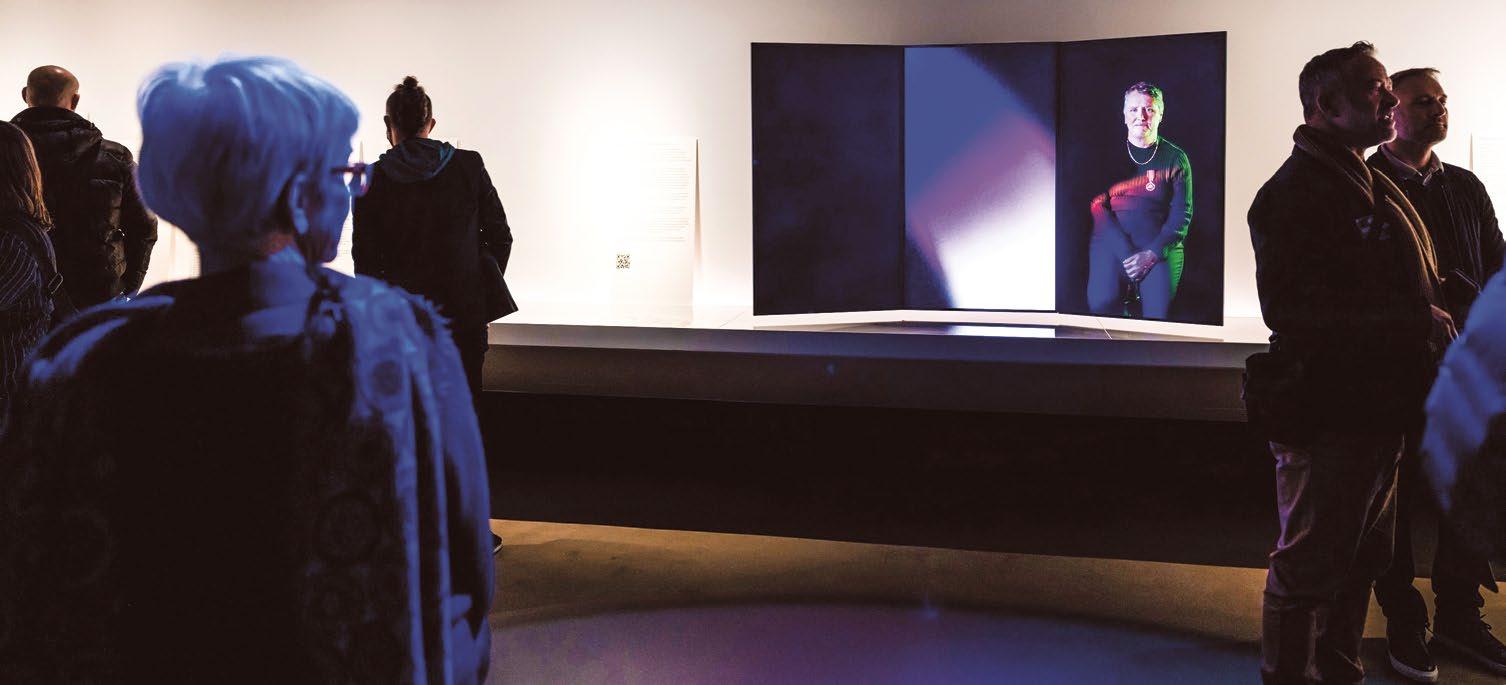
There is also a series of podcasts available from the exhibition’s webpage (shrine.org.au/defending -pride).
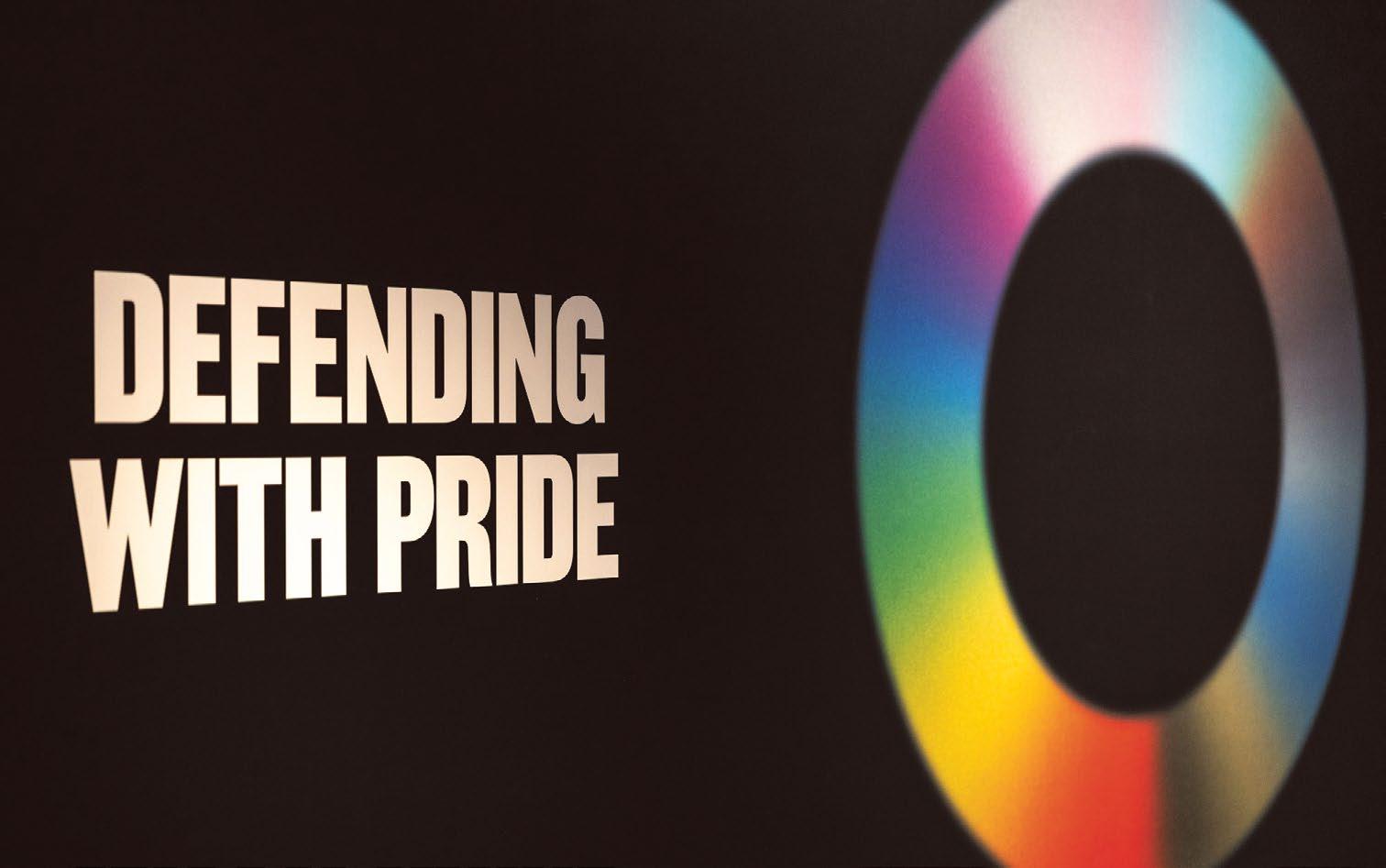
Merchant Navy Day
On 3 September we marked Merchant Navy Day to commemorate the distinctive service of Australian merchant mariners in times of conflict.
80th anniversary of the second Battle of El Alamein
On 23 October we recognised the 80th anniversary of the second Battle of El Alamein, where Australians played a crucial role in the Allied victory in North Africa. There were several significant battles in the El Alamein area between July and November 1942. The 9th Australian Division was pivotal in the British Eighth Army’s action to halt a German and Italian advance towards the Suez Canal.
To read the full version of this article, see the digital edition of Vetaffairs (dva.gov.au/vetaffairs). For more about the above, visit anzacportal.dva.gov.au
December 2022 Vetaffairs 29
Ink in the Lines
An Australian War Memorial touring exhibition
The touring Australian War Memorial exhibition, Ink in the Lines, shines a light on personal stories and experiences of Australian veterans through the use of tattoos.
Many members and veterans of the Australian Defence Force have tattoos, and while their reasons for getting tattooed are as varied as the people themselves, self-expression and belonging play a part.
Throughout the exhibition a common unifying purpose for getting ’inked‘ emerges: to remember.
Inscribed on skin are their identities as veterans, their unique experiences, overcoming adversity, the bonds of family and friends, the commemoration of loss, and acknowledging the experiences that make us who we are.
The Memorial’s Curator of Oral History, Film and Photography Stephanie Boyle, photographer Bob McKendry and videographer Stephen Toaldo captured oral history interviews and portrait photography documenting the stories of veterans and their tattoos. Many of the images and stories collected also form part of the Ink in the Lines exhibition.
‘I hope this exhibition helps visitors engage with the Australian military in a way they probably haven’t before, and see that everyone has an important story to tell and that some stories can be written on skin,’ Ms Boyle said.
Australian War Memorial Director Matt Anderson said Ink in the Lines is a contemporary exhibition showcasing Australia’s modern veterans and their families, who through their tattoos commemorate the people, events and experiences that have shaped their lives.
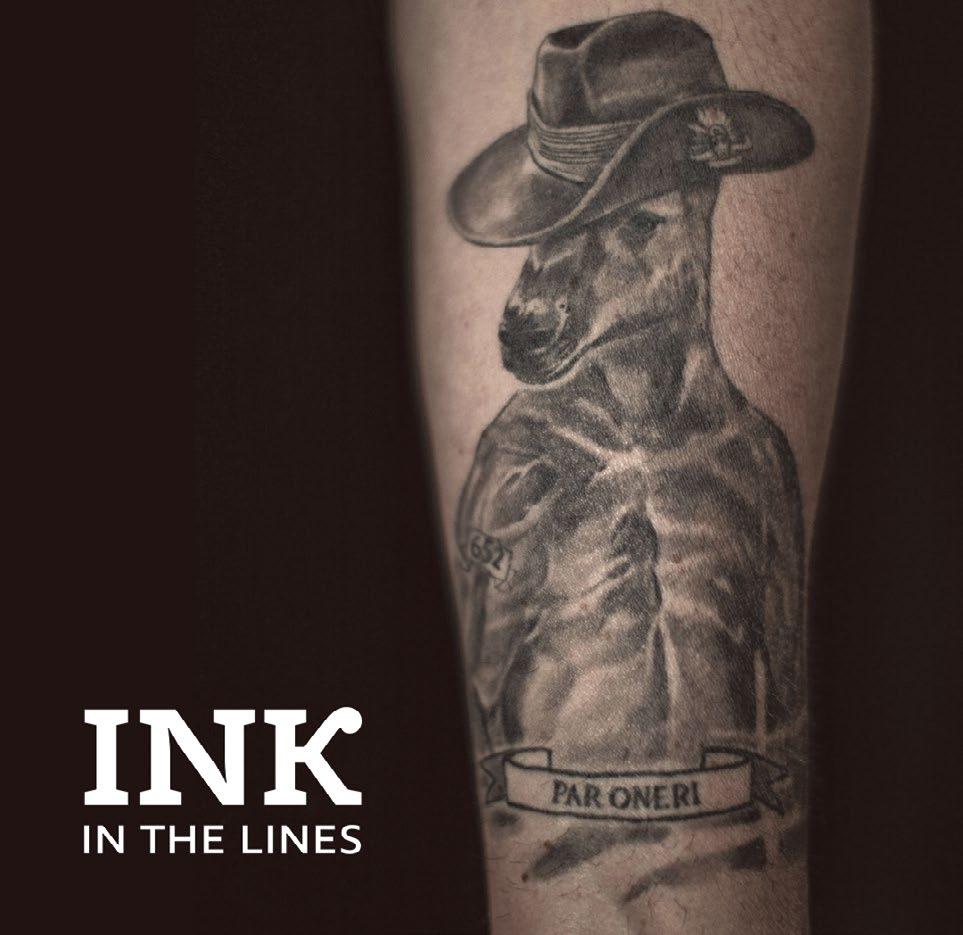
‘The experiences of present-day veterans, and their loved ones, are unique and often intensely private. There is no more personal way to preserve a memory of a deployment, or highlight what their service has meant to them, than to have it tattooed. I would like to thank the veterans who participated in the exhibition for offering their stories,’ Mr Anderson said.
More information on the Memorial’s Tattoo Project and the Ink in the Lines exhibition (including locations and dates) is available on the Memorial’s website: awm.gov.au/visit/ exhibitions/ink-in-the-lines
The Anzac Day Commemoration Committee (ADCC) is devoted to the solemn remembrance of Anzac Day. This not-for-profit organisation raises funds primarily through the annual Queensland Anzac Badge Appeal.
The ADCC directs proceeds towards the conduct of Anzac Day services in Brisbane, veteran welfare support projects, and education programs. Learn more about the ADCC at anzacday.org.au
ADCC ‘Remember’ poppy badge – $7.99
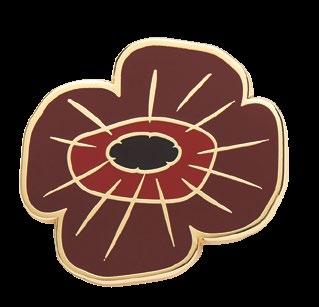
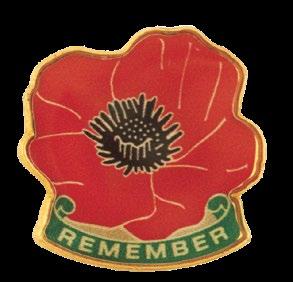
Battlefield Blue aims to raise awareness of the effects of post traumatic stress disorder and depression in military personnel, first responders and all who suffer invisible wounds as a result of their service.
Battlefield Blue channels proceeds into various organisations supporting veterans, first responders, and their families. Learn more about Battlefield Blue at poppytributes.com.au
Battlefield Blue lapel pin – $5.00
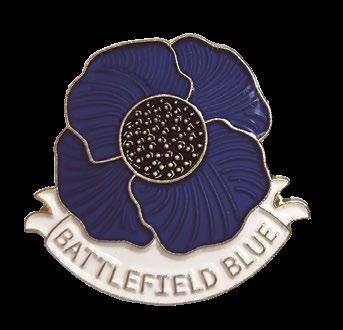
Cor Infinitus honours military and emergency service personnel who have taken their own lives, through the establishment of memorials in acknowledgement of their service. The memorials aim to destigmatise mental illness and assist in suicide prevention.
Proceeds support the work of Cor Infinitus, which assists in generating the resources required to establish a memorial. Learn more about Cor Infinutus at corinfinitus.org
Cor Infinitus ‘Infinity’ lapel pin – $5.00

Erstwilder, a Melbourne-based fashion accessory company, is devoted to supporting a wide variety of charities, causes and communities. Their ‘Remembrance’ collection is inspired by the symbolism of the poppy and rosemary, and was designed in honour of Australia’s service personnel.
Erstwilder will donate $2 from each sale to RSL Victoria’s Poppy and Anzac Appeals. Learn more about Erstwilder at erstwilder.com
Erstwilder ‘Remembrance’ poppy pin – $14.95 Erstwilder ‘Lest we forget’ rosemary pin – $14.95

30 Vetaffairs December 2022
WAR MEMORIAL ITEMS FOR SALE To order, simply complete the order form and post your cheque/money order or credit card details to: eSales Unit, Australian War Memorial, GPO Box 345, Canberra ACT 2601. Phone (02) 6243 4555 (select option 2). Or shop online at www.awm.gov.au/shop PRICE NO OF ITEMS TOTAL ADCC ‘Remember’ poppy badge $7.99 Battlefield Blue lapel pin $5.00 Cor Infinitus ‘Infinity’ lapel pin $5.00 Erstwilder ‘Remembrance’ poppy pin $14.95 Erstwilder ‘Lest we forget’ rosemary pin $14.95 *Postage & handling 1–3 items $10.00; 4–9 items $15.00; 10+ items $20.00 *Postage and handling $ Please allow up to 6 weeks for delivery. Total amount $ Visa Mastercard Cheque/money order (made payable to the Australian War Memorial) Cardholder name Card number Expiry date Signature Full name Delivery address Suburb/town State Postcode Daytime phone Please provide your email address if you would like to receive the Memorial Shop e-newsletter for updates about new releases, special offers etc ✃ ORDER FORM The Memorial Shop proudly presents this selection of badges and lapel pins – each designed to raise awareness and support our
AUSTRALIAN
veteran community.
(1.7cm wide) (2.5cm wide) (3.5cm wide) (3.4cm wide) (2.1cm wide)
The Australian War Memorial values your privacy. Learn more about our privacy policy at awm.gov.au
NOTICE BOARD
REUNIONS
Please note that the following reunions may be affected by the COVID-19 pandemic. If unsure, contact organisers for more information.
46th Class Army Apprentice
10 December 2022, Port Office Hotel, Brisbane, QLD
To celebrate 32 years since joining the Army.
Contact: Jake Donnelly � 0427 059 094
jake6395@hotmail.com
Contact: Sonia Thompson � 0402 444 460
sonithompson1@gmail.com
2 SQN RAAF Reunion
25 April 2023, Brisbane, QLD
All former and serving members are invited to attend.
Contact: Arthur Rennick � 0408 064 042 (business hours)
2sqn.association.raaf@gmail. com
1 RTB Kapooka – B COY 11+12
PL – 10-year reunion
13 May 2023, Townsville, QLD
LOST
MEDALS LOST AND FOUND
Pte J E Teal
HERMAN AUGUSTUS ARNOLD (known as Monty) Service No 2362
Looking for my grandfather’s medals which were stolen some years ago. Decorations: South Africa – Queen’s Medal with five clasps; WWI –British War Medal & Victory Medal; WWII – War Medal, Australia Service Medal, Long Service and Good Conduct Medal, Meritorious Service Medal.
1914–15 Star, 2722 Pte J.E.TEAL, 4/LH. F. AMB. AIF. Contact: Ray Ryan � 0428 639 903
Lance Corporal Lawrence Armstrong Scott VX26449
Allan Leo James
Husband of Jean. DOB 15/1/1918, DOD 31/7/1967. I would like to return medal to his family.
Contact: Michael Kan � 0414 503 552
prokan1@bigpond.com
Alan Edward Findlay NX59671
HMAS
Nirimba 2nd Sailstruc Apprentice Intake – 50-Year Reunion
10–12 February 2023, Gold Coast, QLD
Expressions of interest for the reunion can be made on Facebook Group HMAS Nirimba Jan 1973 – 2nd Sailstruc (34th)
Apps Intake or contact Allan. All 34th intake and partners are welcome.
Contact: Allan Dow
Allan_dow@bigpond.com
Get together for all those members that are still in, or still with us. Catch up and have a beer.
Contact: Rosie and Goody � 0455 531 599
All Equipment Musterings
1 July 2023, CSI Club, Ipswich, QLD
Contact: Helen Thomson (granddaughter) � 0412 868 218
helent77@bigpond.net.au
Errol Rasmussen 1200441
My Vietnam medals were last seen at a funeral in Toowoomba, QLD.
Contact: Errol � 0408 051 941
eras1941@gmail.com.au
Set of WWII medals. DOB 26/12/1906, Broken Hill, NSW. Enlisted on June 1940, served with 2/21st Australian Infantry Battalion. Deceased on 20 July 1945, Ambon, Netherlands East Indies. Son of James Blee Scott and Rosa Hill Scott of Merbein, Victoria.Contact: Denise Thomas
thommo_35@hotmail.com
RAAF Corporal Harold Raymond Bryant 19705
WW11 1939–45 Medal, found Riverstone, NSW. NOK Fanny Greeson. Died of wounds in 1942, New Guinea, 2/2nd Infantry Battalion AIF
Contact: Richard Lawford � 0409 843 483
richard.lawford@bigpond. com.au
Alan William Garrett
Flying Officer Peter Trare MURPHY 57774
HMAS
Sydney IV Commissioning Crew 40-Year Reunion
17–20 February 2023, Hobart, TAS
All members of the Commissioning Crew and partners are encouraged to attend for a great catch-up.
Contact: Derek Leecroft � 0409 632 961
gimakide@bigpond.com.au � facebook.com/ groups/344780545578473
All suppliers and clerk suppliers (box packers and mushrooms) from all bases and partners very welcome. Bookings required, $5 each.
Contact: Jacko or Paul Noble � 0413 700 298 / 0411 401 776
djjacko58@bigpond.com / paulwaynenoble@hotmail. com
HMAS Nirimba – July '73
Apprentice Intake – 50-year reunion
21–23 July 2023, Coolangatta –Tweed Heads, QLD
Trying to locate Peter’s medals – the War Medal 1939–45 and the Australian Service Medal 1939–45.

Contact: Lance McDermott � 0433 064 830
lancemcd@iinet.net.au
FOUND
Allen Bruce Masterton, QX25532/Q5972
I have in my possession an Australian Service Medal 1939–45, a War Medal 1939–45, and what could be a Return from Active Service Badge. I am looking for family of Harold who served in WWII from 20 Nov 1940 until 2 Apr 1946.
Contact: Ian Ballantyne
helian.5264@gmail.com
S. Brookman CPO
Royal Australian Naval Reserve Long Service and Good Conduct.
Two Vietnam medals – the Vietnamese Star and the Vietnamese Campaign Medal belonging to A.W. Garrett, service no 1734738. Alan was born on 3 January 1948 in Winton, QLD. He was a Lance Corporal in the Army.
Contact: Garry Heskett JP � 0414 512 302
garryheskett4@gmail.com
John Joseph EGAN, R63225
General Service Medal belonging to John, rank AB (UW) in the RAN. Enlisted on 4 April 1964 and discharged on 26 July 1969.
Headquarters
& Headquarters Company 1st Australian Logistic Support Group (1 ALSG)
20–25 March 2023, Broken Hill, NSW
Please make contact for details.
Contact: Tony Brown � 0428 852 736
tr4950@optusnet.com.au
HMAS Leeuwin 42nd intake Reunion
30 March – 4 April 2023, Fremantle, WA
Marks and Morrow Division 50-year anniversary.
Contact: George Casey � 0409 103 989
casey5556@gmail.com
RAADC
All members of this intake are encouraged to attend. Divisional staff and instructors who were involved with the intake are also welcome.
Contact: Gary Haigh � 0412 114 647
gary.haigh56@gmail.com
2nd/4th Battalion The Royal Australian Regiment Association 50th
Anniversary
15–20 August 2023, Townsville, QLD
To be held around Townsville and Lavarack Barracks. Further details are on the website or make contact via email.
Contact: Phillip Smailes � 0409 642 067
reunion@24rarassociation. com or committee@24rarassociation.com
� www.24rarassociation.com
3 x WWII medals and 2 x Korean medals found in Gympie, QLD area. Born in Brisbane, QLD on 10/09/1922. Contact: Phil Connor � 0418 408 786
Donald Eric McGlinghey, S1468 Army
Two medals from WWII –Pacific Star and 1939–45 Australian Service Medal. Born in White Cliffs, NSW on 17 June 1900. Served from 22/04/1941 – 28/04/1947 and was a WO2 with 4 MD Echelon and Records. NOK Lilian McGlinghey. Contact: Maureen � 0467 822 266 (leave message if unanswered)
Contact: Maroochydore RSL Museum � (07) 5443 1719
mrslmuseum@ maroochyrsl.com.au
E. J. (Eric John) STODDART Service number NX147536. Set of 4 medals, place of enlistment Liverpool, NSW. Parents possibly John and Mabel Stoddart. Would like to return to his descendants.
Contact: Cathy York � 0401 423 536
yorkette296@gmail.com
N K Roe NF456294
Set of two medals, Australian Service Medal and one other
Contact: Cathy York � 0401 423 536
yorkette296@gmail.com
80th Shin Dig
21–23 April 2023, The Portsea Camp, Vic Open to all past, present, family and friends of our outstanding Corps. Golf day on Friday. Pop-up spit roast on Saturday. Walk the Portsea Barracks at your leisure on Sunday. Reaching out to members not on Facebook.
RAAF recruit course 1153
Seeking to contact fellow members. Hoping to get a reunion happening for our 50th year since we began our RAAF journey.
Contact: Buster Todd � 0402 453 082
toddbus54@gmail.com
Contact: Geoff Stewart � 0419 208 944
geoffst@hotmail.com
QX42641 (Q122973) Jack
Crane Wilkins – Craftsman
Two medals belonging to Jack have been handed in – War Medal 1939–45 and Australian Service Medal 1939–45. 2/31 Australian Infantry Btn (on discharge), DOB: 15 June 1917, served 2 Sept 1940 – 22 Feb 1946. We would like to return medals to close relatives.
Contact: Simon Morley, Hervey Bay RSL Sub-Branch Inc. � 07 4197 7477
subbranch@herveybayrsl. com.au
December 2022 Vetaffairs 31
You may also want to visit the Defence Department website’s Honours and Awards page for information on applying for medals, replacements and relatives’ medals (defence.gov.au/adf-members-families/honours-awards).
NOTICE BOARD
NAVY
Kevin J Harper ex 10Bn. RSAR & Ex HMAS Oxley
Seeking to contact former member of Sig. Pl. 10th. Bn. Royal South Australia Regiment who later joined the RAN and served aboard HMAS Oxley. His father was S/Sgt Don Harper who was CQMS Spt. Coy. 10Bn.
Contact: Des Hawkins � 0434 676 050
desmondh@ozemail.com.au
Looking for HMAS Oxley’s Bell
My shipmate has been diagnosed with terminal cancer and is seeking a photograph of the inside and outside of the bell. His son was christened on-board in the 1980s and an inscription displayed inside the bell declares this.
Contact : Rick Wakeman
pauwak@gmail.com
Members of PTI Branch
Seeking surviving members, Australia wide, of PTI branch from the late 1960s. We are heading towards the big 80 birthday. Please make contact –‘Glendon’, 636 Limbri-Weabonga Road, Limbri, NSW, 2352.
Contact: Gregory Daly (ex RAN POPT)
Seeking Graham Brown
A friend from the mid-70s, Townsville, with 2/4 or 5 Aviation. We were at his wedding around 1977/78. Iam married to an ex-military member. Graham worked in the Kirwan area. We rented with Graham in the North Ward area in the 70s.
Contact: Sharyn Douglas
sharyn46@hotmail.com
24 Platoon, Charlie Company, 1 RTB 1977
A Facebook group has been formed to renew contact with members of the above. Those wishing to join are invited to make contact.
Contact: Adrian Fryatt
17feint@gmail.com
Seeking Billy Hughes
Looking for my old friend who served with 1RAR & 5 RAR during 1963 to 1967. I would love get in touch again.
Contact: Ron Prendergast � 0418 337 312
emelias@emelias.com.au
Pte. Stewart Blowers and Pte. Cyril Suters
Seeking Vietnam Battalion plaques
I am making a Vietnam permanent display where I live in Frankston South, Victoria and I am looking for plaques. The ones I need are 1, 2, 3, 4, 5, 6, 8 and 9.
Contact: Eddie (Ted) Harbour � 03 9787 1673
WWII Army Paybook – Cecil Gordon (Buddy) Arnold
Seeking Cecil’s paybook, 16 Garrison Btn, Camp 1, Hay NSW, 1941/42.
Contact: Gordon Arnold � 02 4954 7537
Seeking Private Eric Cooper
He was in RAASC or RACT in 1971 or 1972. Posted to Victoria at that time.
Contact: Phill Quartermaine, WA
phquarter@gmail.com
AIR FORCE
Frederick John Peters
Seeking David ELLIOTT and Michael TAYLOR
I joined the RAAF with David in 1968, recruit class 903. Michael was stationed at 2AD in the late 60s/early 70s. Both members went on the have successful careers in the Victorian and NSW Ambulance services respectively.
Contact: Timothy Hill � 0429 788 227
timstow@westnet.com.au
RAAF Laverton Gliding Club
I am seeking contact with former members of, or persons associated with, the Gliding Club during the period March 1968 to September 1973. Information related to the Slingsby T-35 ‘Austral’ glider is sought for the compilation of an operational history.
Contact: David Lackner � 0409 718 660
davlackner@hotmail.com
Seeking Kinton Smith RAAF fireman
Contact: Dr Gillian Colclough
deputy.president@rajwa.org.au � Rajwa.org.au
‘A’ Battery Association
Seeking information and/or location of missing historical framed documentation, concerning the Warner Bros authorisation to use the ‘Road Runner’ as an ‘A’ Field Battery logo/motif/emblem.
Contact: Paul Johnston, Secretary � 0411 166 904
a.bty.secretary@australianartilleryassociation.com
� australianartilleryassociation. com/a_bty_association/lineage. html
HMT Prince Abbas
Seeking
Ray Curtis R65543 and Marty Martino R49720
Ex HMAS Hobart
In regard to a book being produced on Horsham (Vic) Naval Men and Women.
Contact: John Francis � 0437 775 210
jngfrancis1@bigpond.com
Info about HMAS Sydney III Bell
I have now found there are 3 bells from Sydney III. One at Nowra Naval Air Station, one in the Army Sergeant’s Mess Singleton and one in a display cabinet in Fleet Headquarters, Garden Island. It seems my daughter Rachael Harrold is not engraved in any of these bells. She was officially christened on board Sydney in February 1970. I am seeking Allan Gilbert, Captains Steward at the time of the christening.
Contact: Brian Harrold
patandbongo@hotmail.com
ARMY
Seeking 1986 Army Marathon Team
Seeking members of the Army Marathon Team who in 1986 circumnavigated Australia in 96 days to raise money for the Australian Cancer Research Foundation.
I would like to interview members for a book I’m writing on the marathon.
Contact: Barbara
bmackaycruise@gmail.com
I am seeking contact with my roommates who graduated 3 Platoon, A Company, 1RTB Kapooka, October 1969. Namely Stewart and Cyril, but any other guys in this Platoon who may be interested in renewing old friendships.
Contact: Sapper Paul Martino � 0400 760 356
holdfast279@gmail.com
NX128388 Captain Raymond Joseph O’Brien
Seeking to contact family of Raymond who was a member of the Australian Special Wireless Group, 101 Wireless Regiment and Britcom Broadcasting Unit –Kure, Japan.
Contact: Robert Hartley � 0411 157 719
ew.tech@bigpond.com
16th Garrison Battalion shoulder/hat patch
Seeking shoulder/hat colour patch. My late father served in the 16th Garrison Battalion, Hay Interment Camp 1941/42. I am trying to replace patch, which has been missing for many years. I believe the patch is a green circle on a black diamond.
Contact: G Arnold � 02 4954 7537
16th Intake 25/4/1969 B Company 7 Platoon
Any National Servicemen of the 16th Intake interested to get together, contact the below.
Contact: Tony Brine or Gary Drechsler � 0403 704 145 or 0455 033 760
Seeking information/photos of Leading Aircraftman Frederick John Peters 143304, date of birth 7/7/1925, date of enlistment 13/7/1943, date of discharge 5/3/1946. Posting at Discharge –Station HQ Laverton. Contact: Kaye Mayne
v.k.mayne@skymesh.com.au
Harold Raymond Bryant
Wishing to contact any family member of Harold. He was a Corporal, service no. 19705. Enlisted in Ararat, Victoria. Discharged, Air Force Headquarters. Served between 20 Nov 1940 and 2 Apr 1946. I have some items I’d like to return to the family.
Contact: Ian Ballantyne
iballantyne@lararsl.com.au
WWII Warrant Officer
Donald Alexander McLeod
RAAF,
Course 950 Edinburgh. After rookies, Kinton was a fireman and we lost track of each other. Would very much like to get in touch.
Contact: Ray Langenschied � 08 93982074 or 0409 391 257
rlangenschied@bigpond.com
AFC and RAAF Association –Toowoomba Branch
We are reaching out to all those who serve/have served in the RAAF, either Regular, Reserve or National Service to join in the camaraderie of the Association. This invitation is also extended to Army Aviation and Commonwealth Allied Forces. The Branch meets on the first Sunday of each month at Club Glenvale, Boundary Street, Glenvale, starting at 10.00 am.
Service Number 431672
Don enlisted in the RAAF in August 1943 and was attached to 6 Communications Unit. When in Canada, he was ‘adopted’ by a local family when he was on leave. The Thomas family took Don in and over the years, Don sent many letters to Cyndi’s grandmother, and she would now like to return them to family or donate them to a RAAF historial unit.
Contact: Cyndi Sherar
csherar@gmail.com
TO UNSUBSCRIBE
Contact: Bruce Kucks � 07 4634 6668
bruce.kucks@bigpond.com
MISCELLANEOUS
Veterans who are, or were also, Justices of the Peace
The Royal Association of Justices WA (RAJWA) would like, at the next Remembrance Day, to acknowledge veterans who also served or serve as Justices of the Peace in Western Australia. If you are such a person or know of one, you are welcome to make contact.
Seeking an image of the ship HMT Prince Abbas (Screw Steamer) that was used in the evacuation of the Anzacs from Gallipoli in December 1915. My great grandfather was one of the soldiers evacuated (1st Australian Army Railway Supply Detachment) and I am doing research on his military service for myself and family. I have contacted multiple museums but not one has an image.
Contact: Christine Bennett
camjacko13@msn.com
TPIs and SRD veterans
The Blacktown and District TPI Social and Welfare Club’s members invite TPI/Special Rate (SRD) to come and experience our club. We meet at 1pm on the 1st Thursday of each month at Club Blacktown, 40 Second Ave. Before each meeting, we meet for lunch, and after the meeting we enjoy drinks at the Villaggio Restaurant and Bar.
Contact: Ian Brady
ibrady@bigpond.net.au
Nowra and District TPI Social and Welfare Club
Are you a Military TPI looking for social interaction? Come and join us. We hold our meetings at the Nowra Veteran’s Wellbeing Centre, 1/19 Nowra Lane, Nowra on the third Tuesday of each month at 11am, as well as having social outings and lunches. Spouses and partners are very welcome.
Contact: Leanne Wehmeier, Secretary � 0419 464 313
leannew70@bigpond.com
Vetaffairs is published three times a year and is longer than ever. However, we often have to reduce the length of articles to make them fit. The full versions are in the digital editions on our website (dva.gov.au/vetaffairs).
If you no longer wish to receive the printed edition of Vetaffairs , please email us at vetaffairs@dva. gov.au with your name and address and either your DVA client number or date of birth.
If you’d prefer to receive the digital version via email instead, please say so when you email us.
If you would like to subscribe to our e-newsletter, DVA e-news , please go to dva.gov.au/latest-news. DVA e-news is published every two months.
32 Vetaffairs December 2022



































 DR LORETTA POERIO Senior Mental Health Adviser Department of Veterans’ Affairs
DR LORETTA POERIO Senior Mental Health Adviser Department of Veterans’ Affairs























 COMMISSIONER GWEN CHERNE Veteran Family Advocate
COMMISSIONER GWEN CHERNE Veteran Family Advocate










 By David F Gibson PSM
By David F Gibson PSM


 By Kenneth J Mitchell
By Kenneth J Mitchell
 By James Ayliffe
By James Ayliffe
 By Major Rod Halliday (Rtd)
By Major Rod Halliday (Rtd)
 By Michael Tyquin
By Michael Tyquin















